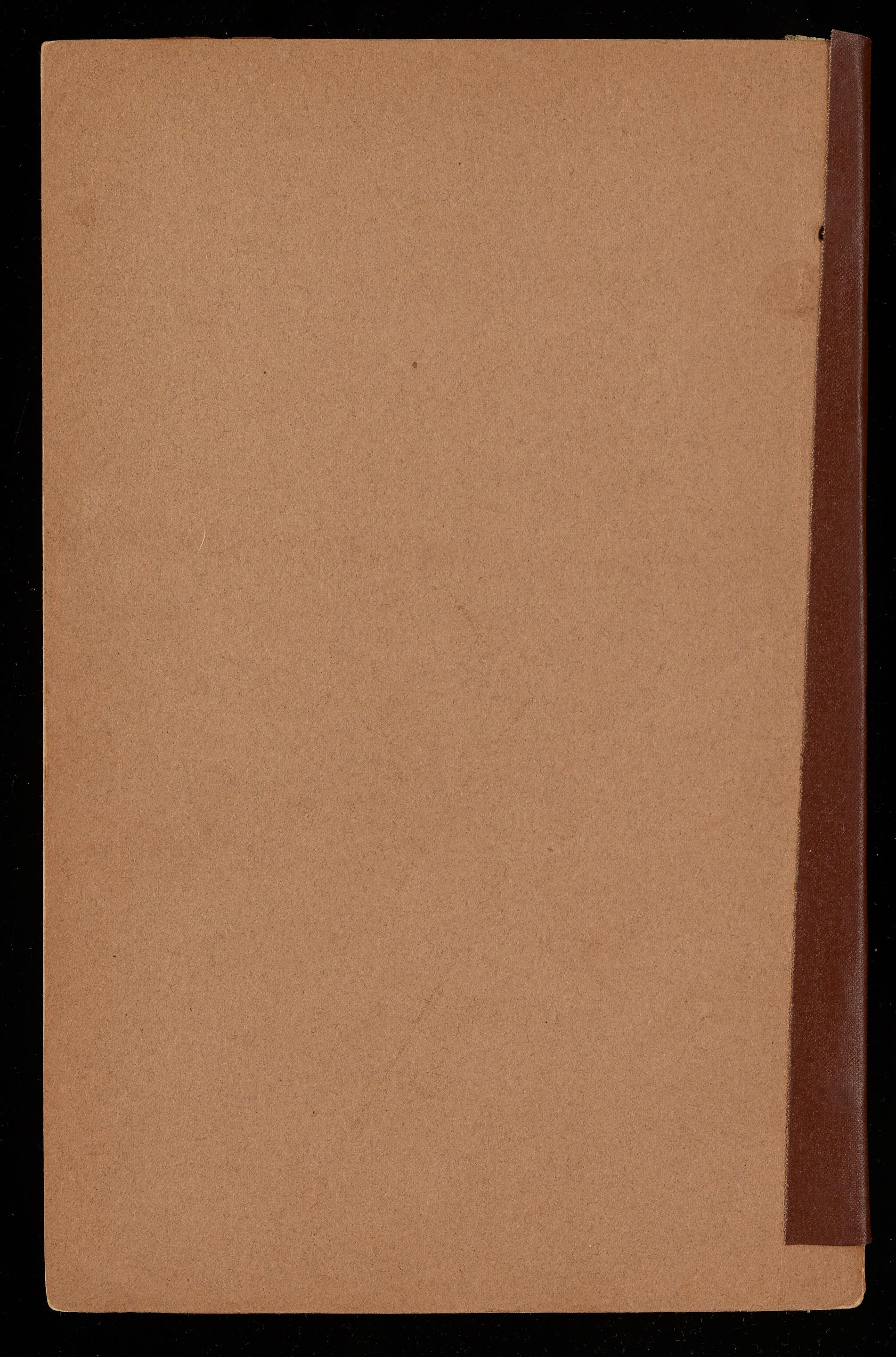ICHMONDCOLLEGE BULLETIN
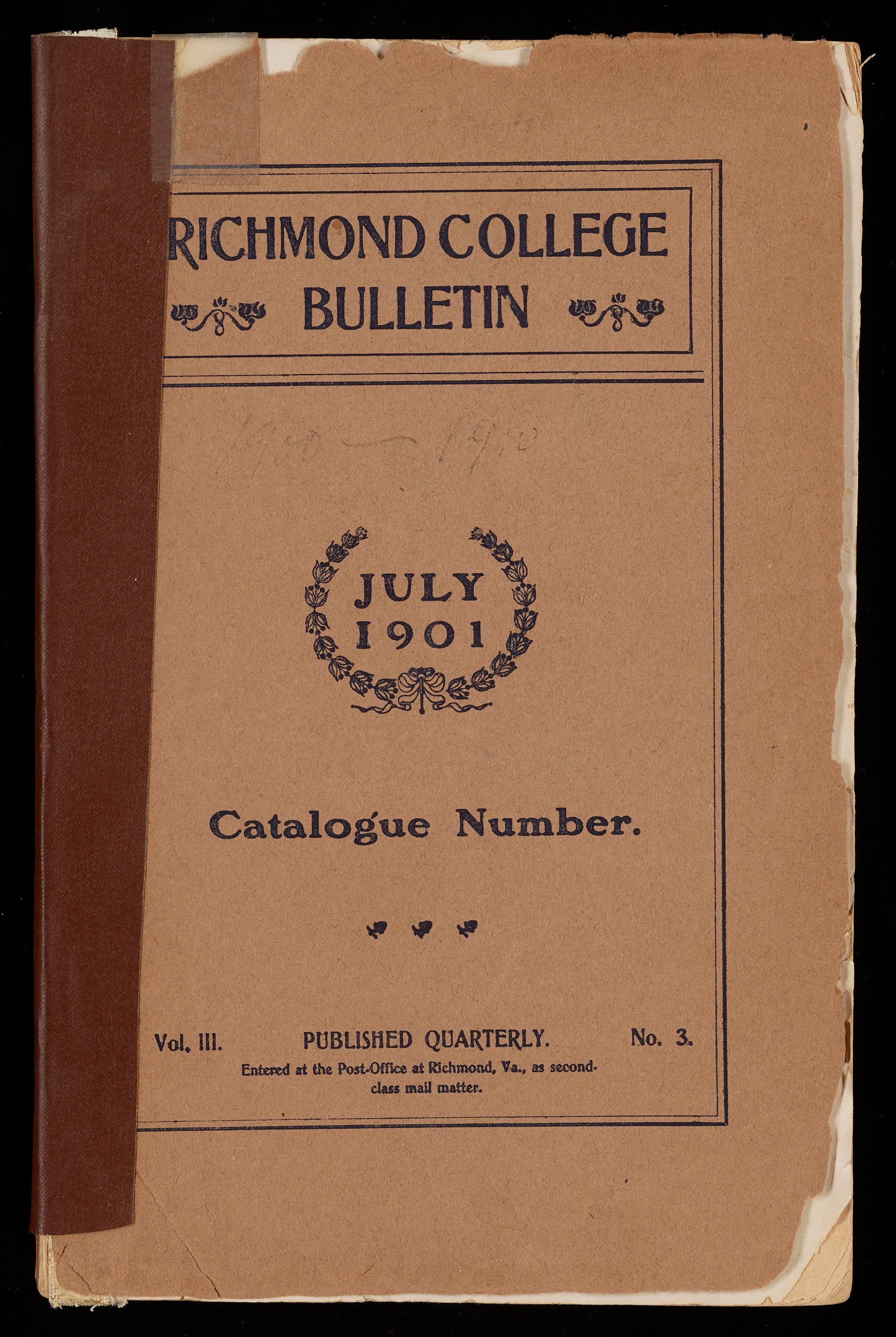
Catalogue Number .
. PUBLISHEDQUAl{TElij.Y. No. 3. Enter.edat the Post-Officeat Richmond,V-a.,as seoondclau mail matt«.





. PUBLISHEDQUAl{TElij.Y. No. 3. Enter.edat the Post-Officeat Richmond,V-a.,as seoondclau mail matt«.



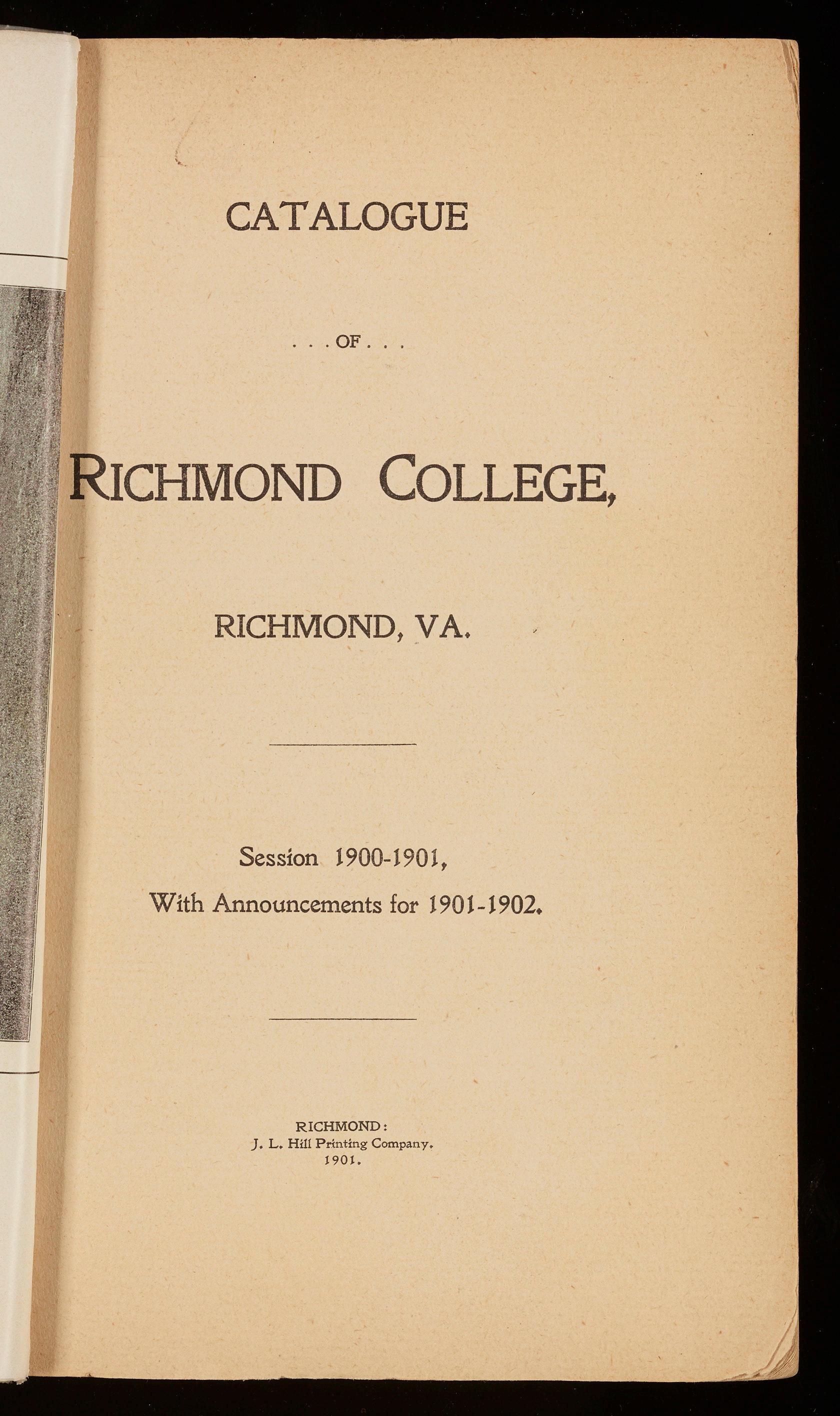
Session J900- J90 l ,
With Announcements for l 90 l- l 902.
RICHMOND: J. L. Hill Printing Company )90).

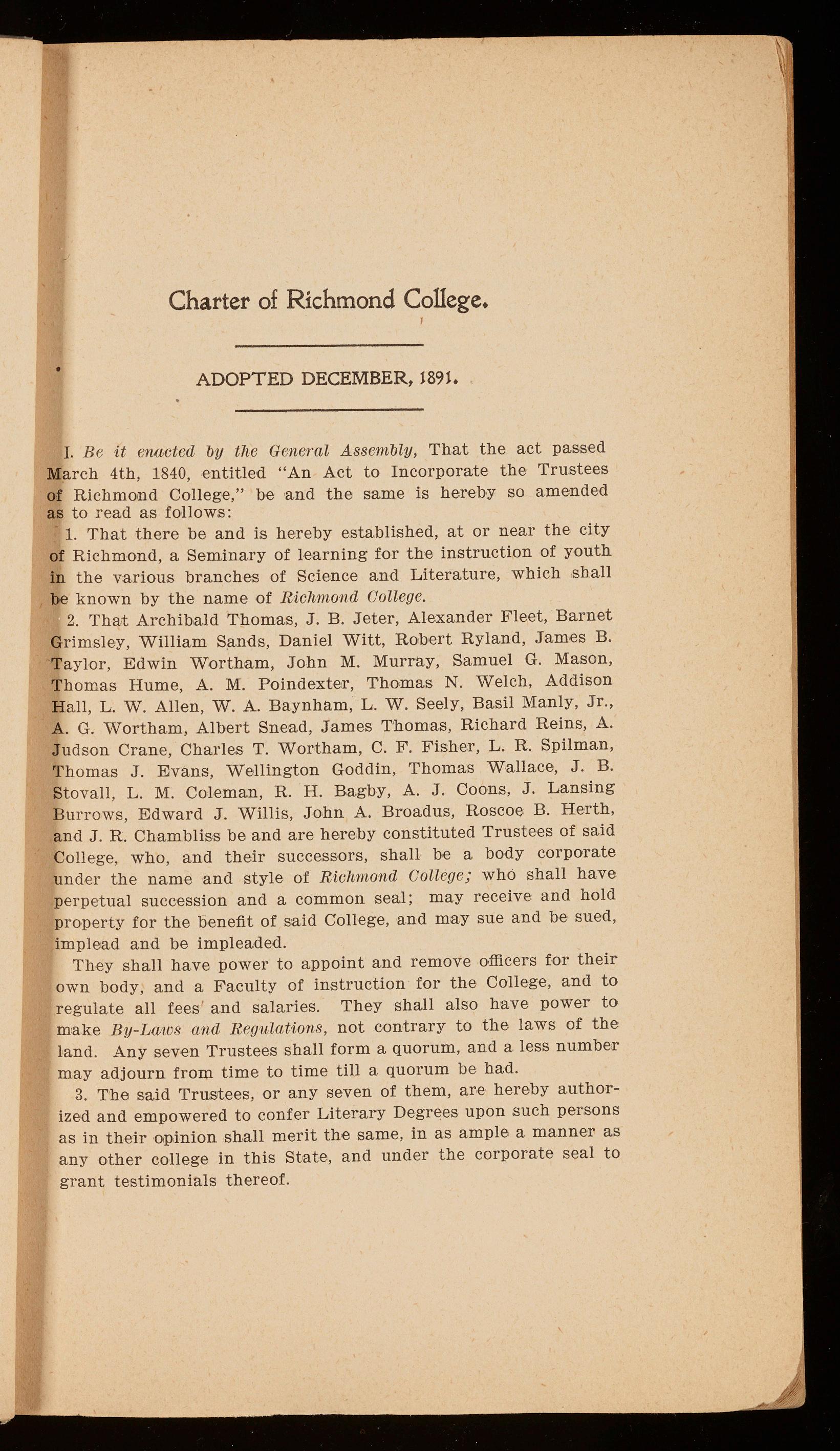
I. Be it eruwted by the General Assembly, That the act passed March 4th, 1840, entitled "An Act to Incorporate the Trustees of Richmond College," be and the same is hereby so amended as to read as follows:
1. That there be and is hereby established, at or near the city of Richmond, a Seminary of learning for the instruction of youth in the various branches of Science and Literature, which shall be known by the name of R'ichrnond College.
2. That Archibald Thomas, J. B. Jeter, Alexander F leet, Barnet Grimsley, William Sands, Daniel Witt, Robert Ryland, fames B. T aylor, Edwin Wortham, John M. Murray, Samuel G. Mason, T homas Hume, A. M. Poindexter, Thomas N. Welch, Addison H all, L. W. Allen, W. A. Baynham, L. W. Seely, Basil Manly, Jr., A G. Wortham, Albert Snead, James Thomas, Richard Reins, A. J udson Crane, Charles T. Wortham, C. F. Fisher, L. R. Spilman, T homas J. Evans, Wellington Goddin, Thomas Wallace, J. B. Stovall, L. M. Coleman, R. H. Bagby, A. J. Coons, J. Lansing Burrows, Edward J. Willis, John A. Broadus, Roscoe B. Herth, and J. R. Chambliss be and are hereby constituted Trustees of said College, who, and their successors, shall be a body corporate u nder the name and style of Richmond College; who shall have perpetual succession and a common seal; may receive and hold property for the oe n efit of said College, and may sue and be sued, implead and be impleaded.
They shall have power to appoint and remove officers for their own body, and a Faculty of instruction for the College, and to regulate all fees ' and salaries. They shall a l so have power to make By-Laws a11d Regulnt-ions, not contrary to the laws of the land. Any seven Trustees shall form a quorum, and a less number may adjourn from time to time till a quorum be had.
3. The said Trustees, or any seven of them, ar -e hereby authorized and empowered to confer Literary Degrees upon such persons as in their opinion shall merit the same, in as ample a manner as any other college in this State, and under the corporate seal to grant testimonials thereof.
4

RICHMOND COLLEGE.
4. The said Trustees shall elect a Treasurer, who shall g ive bond with approved security, payable to said College, condition ed faithfully to discharge the duties of his office, and on failure so to do he may be proceeded against, by motion upon ten da ys' notice, before the Circuit or Hustings Court of the city of Ric hmond
5. The said Trustees shall have power at any aµnual or oth er stated meeting , ten of them being present and concurring , t o remo v e any Trustee , and at any time to supply any vacancy
The number of trustees shall never be less than twenty-fo ur nor more than forty.
There shall be annual and other stated meetings of the Truste es at such time and place as their By-Laws shall prescribe. The re may be special mee t ings at the call of their Presiding officer, or any three Trustees, due notice of all such m ee tings being give n.
6. The said Trustees are hereby authorized and required to admit to instruction in all the classes of the. College, free of a ll charges except board, and in all respects upon terms of equalit y with other students, all ministers and preach e rs and candidat es for the ministry belonging to the denomination of Christians called the Regular Baptists, who may be recommended by th e Education Board belonging to the Baptist General Associatio n of Virginia , in which Board all the rights , properties , privileges , powers , duties , and obligations of the Virginia Baptist Educatio n Society are he r eby declared to be vested And said Trustees ·ma y al ,so admit gratuitously such other students as they may think proper. And said Trustees may receive donations , bequests, an d devises , or in their discretion purchase and hold property , rea l and personal, in any county or corporation of this Commonwealth , and use and control the same for educational purpos e s, in the founding and maintaining of schools or academies , under such rules and regul ,ations as may be prescribed by the said Trustees
7. All rights , claims, privileges, and appurtenances now belonging or any wise pertaining to "the Trust ees of Richmond Coll ege," as heretofore incorpora,ted by act of the General Assembly , passed March 4, 1840, are hereby transferred to "Richmond College."
II This act shall be in force from its passage.
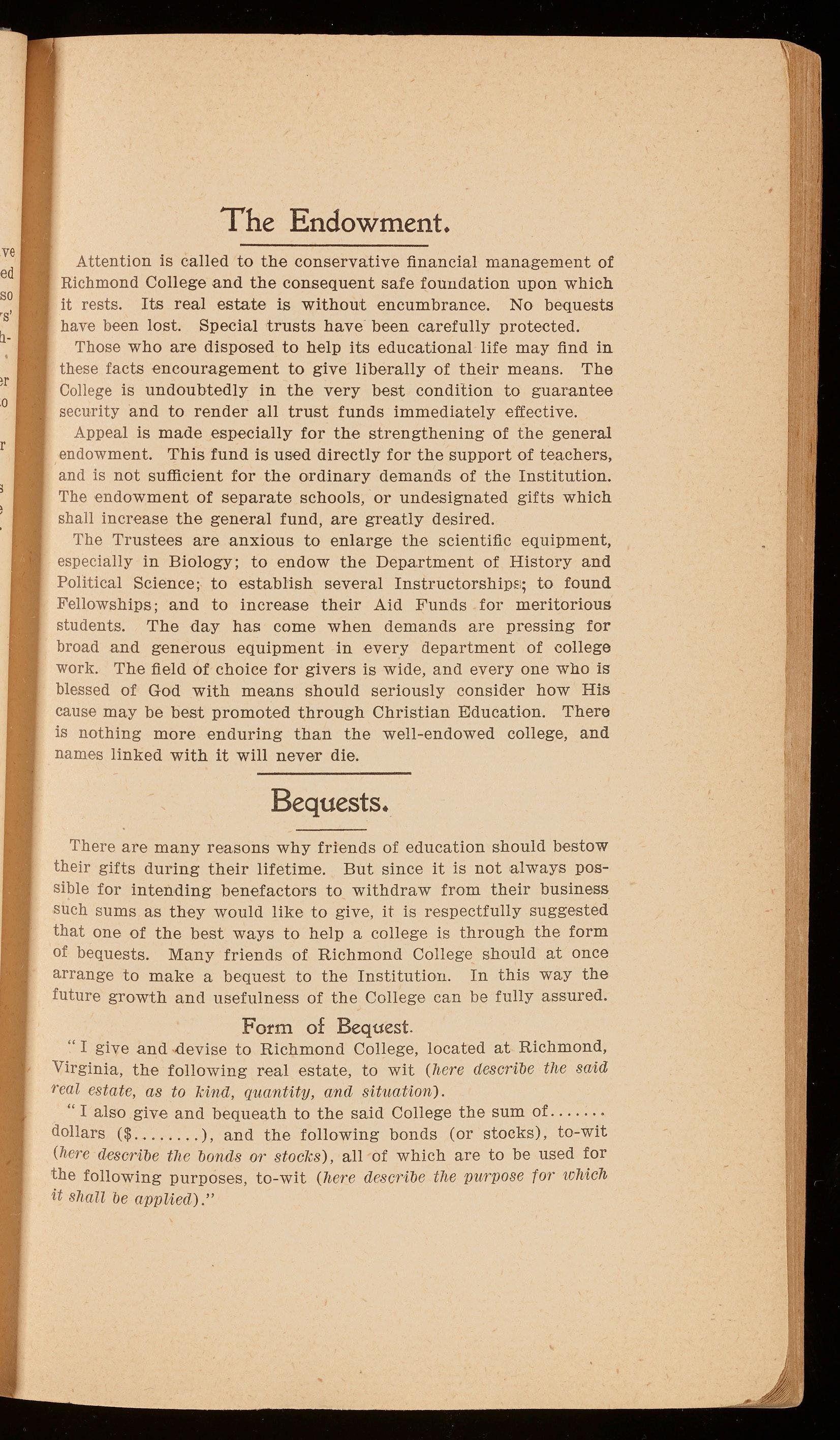
Attent ion is called to the conservative financial management of Richmo nd College and the consequent safe foundation upon which it rests. Its real estate is without encumbran c e. No bequests have bee n lost. Special trusts have been carefully protected.
Those who are disposed to help its educational life may find in these fac ts encouragement to give liberally of their means. The College is undoubtedly in the very best condition to guarantee security and to render all trust funds immediately effective.
Appea l is made especially for the strengthening of the general endowm ent . This fund is used directly for the support of teachers, and is n ot sufficient for the ordinary demands of the Institution . The end owment of separate schools, or undesignated gifts which shall inc re ase the general fund, are greatly desired
The T rustees are anxious to enlarge the scientific equipment , especia lly in Biology; to endow the Department of History and Politica l Science; to establish several Instructorship, :; to found Fellows hips ; and to increase their Aid Funds for meritorious students. The day has come when demands are pressing for broad an d generous equipment in every de partment of college work. T he field of choice for givers is wide, a nd every one who is blesse d of God with means should seriously consider how H is cause m ay be best promoted through Christian Education There is not hin g more enduring than the well-endowed college , and names linked with it will never die.
There are many reasons why friends of education should bestow their g ifts during their lifetime But sinc e it is not a lways possib l e f or intending benefactors to withdr a w from their business such sum s as th e y would like to give , it is r es p ec tfully suggested that one of the best ways to help a college is through the form of beq u es ts. Many friends of Richmond Coll e g e s hould at on ce arrange to make a bequest to the Institution. In this way the future g rowth and usefulness of the Coll eg e ca n b e fully assured_
.
"I giv e a nd devi s e to Richmond College, located at Richmond , Virgi ni a, the follo wi ng real e state , to wit (h ere descri be th e sai d real est at e, as to k i nd, qiiantity, and sUuciUon ).
" I al so give and bequ eath to the said College the sum of .. . • • • • dolla rs ($ ) , and the following bonds (or stock s ) , to-wit (here descri be th e bonds or stocks) , all of which are to b e u s ed for the fo llowing purpo ses , to-wit (her e descri be the piw pose f or w hi ch it shall be ap pl ied ) "
Trustees.
WILLIAM E. HATCHER, D. D., LL. D. President. Hon. J. TAYLOR ELLYSON, Vice-President.
CHARLES H. RYLAND, D. D. Recording Secretary, Financial Secretary, and Treasurer, T. H. ELLETT, Esq., Auditor.
MR. JOSIAH RYLAND .•.. Richmond
MAJOR A. R. COURTNEY Richmond
w. E. HATCHBR, LL. D Richmond
A. E. DICKINSON, D. D. Richmond
MR, JOHN C. WILLIAMS
J. R. GARLICK, D D.
C.H. RYLAND, D. D ..
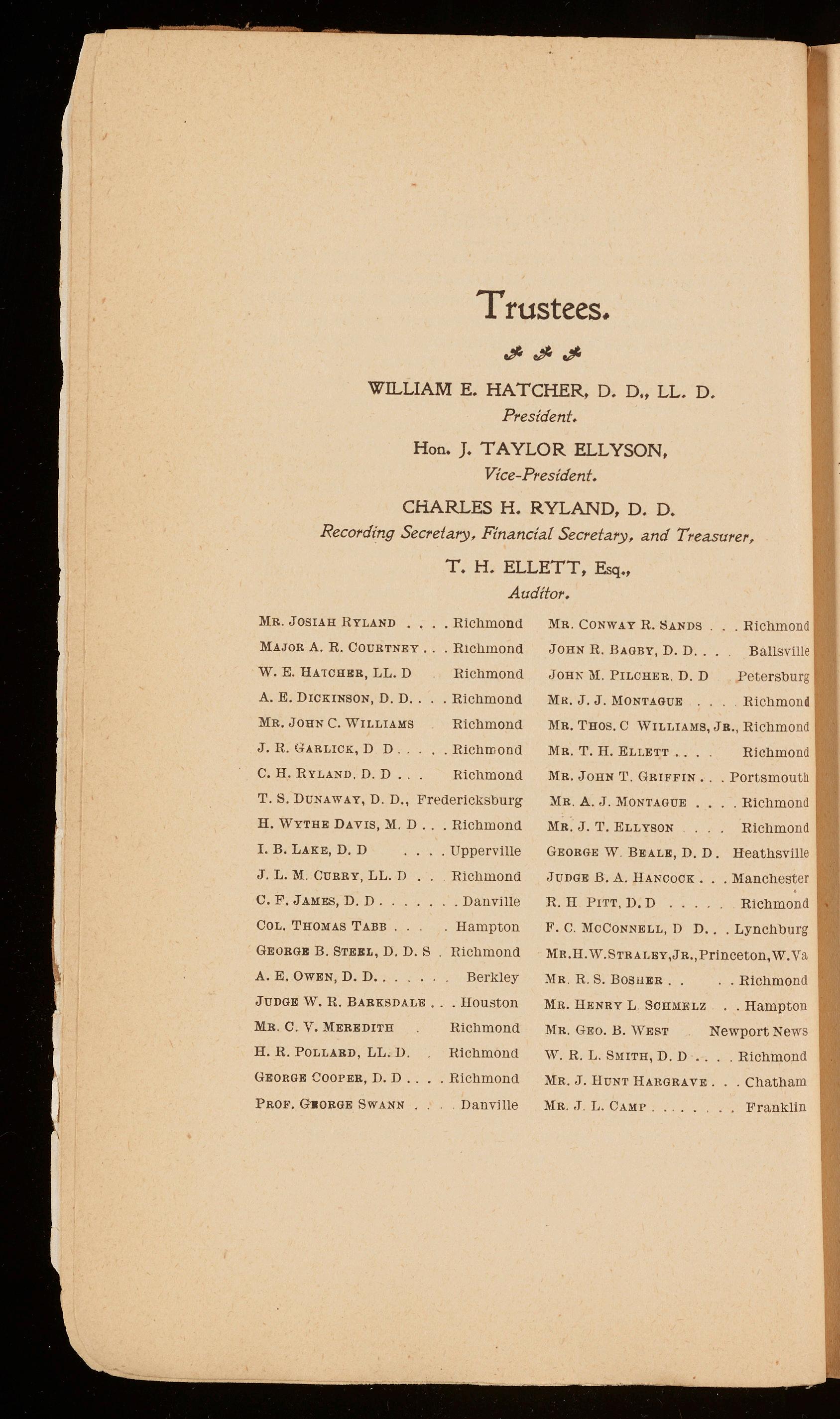
Richmond
Richmond
Richmond
T. s. DUNAWAY, D. D., Fredericksburg
H. WYTHE DAVIS, M. D Richmond
I. B. LAKE , D. D
J.L.M.CURRY,LL. D
C. F, JAMES, D. D ..
Uppervil!e
Richmond
MR. CONWAYR. SANDS
JOHN R. BAGBY, D. D ..
JOHK oI. PILCHER, D. D
lib. J. J. MONTAGUE Richmond
MR. THOS. C WILLIAlfB, JR., Richmond
MR. T. H. ELLETT Richmond
MR. JOHN 'l'. GR IFFIN •.. Portsmouth
MR, A. J. MONTAGUE Ricl1mond Richmond
MR. J. '1'. ELLYSON
GEORGE W BEA.LB, D. D. Heathsville
JUDGE B. A. HANCOCK... Manchester . Danville
COL. THOMAS TABB . Hampton
GIIORGB B. STIIIIL, D. D. s Richmond
A. E. OWEN, D. D •.. .. Berkley
JUDGE w. R. BARKSDALE Houston
MR. C. V. MEREDITH
H. R. POLLARD, LL. D.
Riclunond
R. H PITT, D. D Richmond
F. c. MCCONNELL, n D ... Lynchb urg
MR.H.W.STRALBY,JR.,Princeton,w.va
MR R. s. BOBilllR Rtcllmond
MR. HENRY L SCHJIIBLZ Hamp ton
MR. GEO B. WEST Newport News
Ricllmond w. R. L. SMITH, D. D Ricllmond
GEORGE COOPER, D. D.. Richmond
PROF. GJIORGE SWANN Danville
MR. J. HUNT HARGRAVE . Chatham
MR. J L. CAMP Franklin
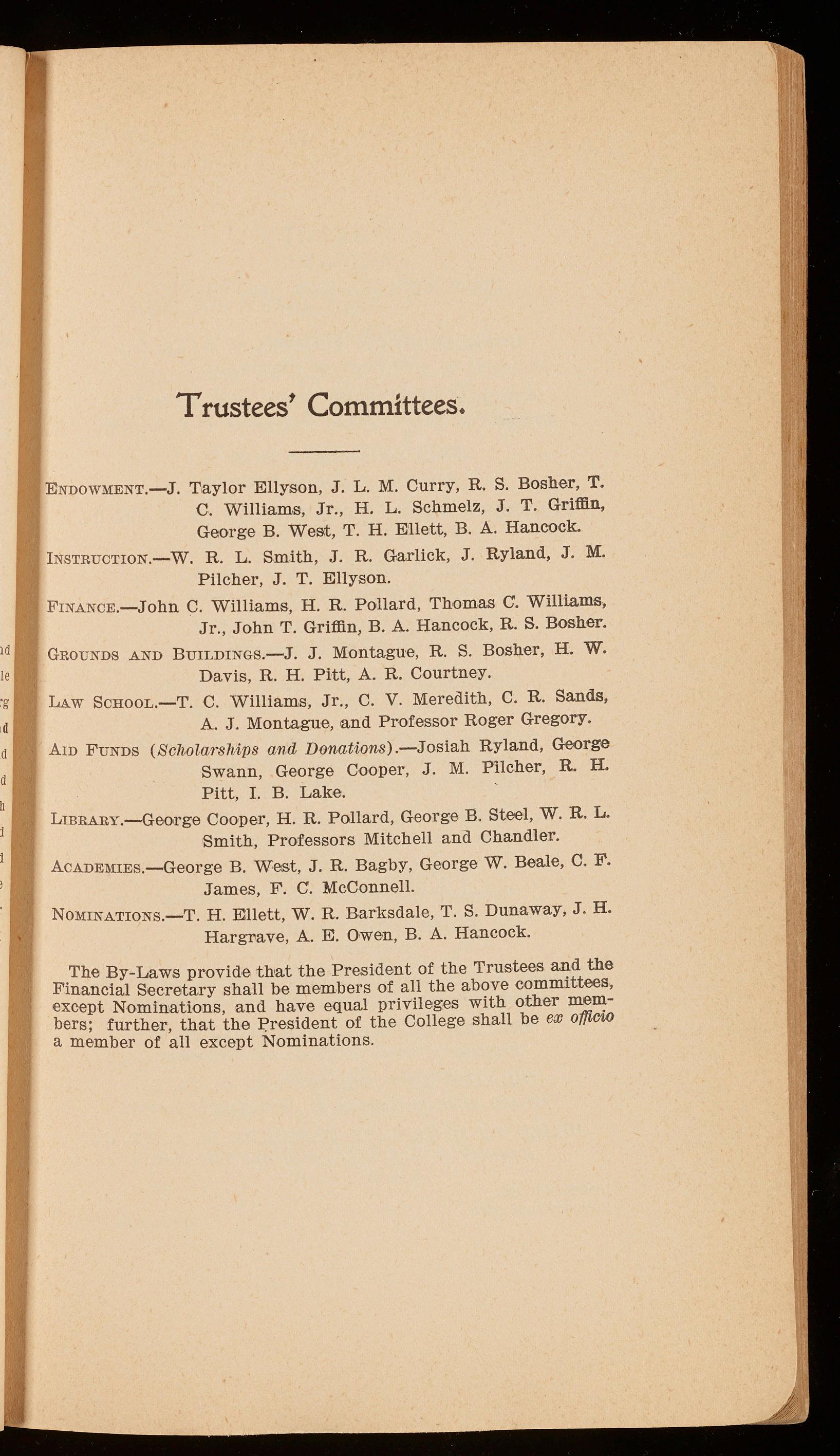
ENDOWMENT.-J. Taylor Ellyson , J L . M. Curry, R. s. Basher , T. C. Williams , Jr ., H. L. Schmelz , J. T. Griffin, George B. West , T. H. Ellett , B A. Hancock. lNSTRUCTION.-W R . L. Smith , J. R. Garlick, J. Ryland, J M. Pilcher , J. T Ellyson
FIN.ANCE.-John C . Williams , H. R. Pollard , Thomas C. Williams, Jr ., John T. Griffin , B. A Hancock , R. S. Bosher . GROUNDS .AND BUILDINGS -J. J. Mont a gu e, R. s. Bosher, H w. Davis, R. H Pitt, A R. Courtney
LAw SCH0OL.-T. C. Williams, Jr ., C. V Meredith, C. R. Sands , A J. Montague , and Professor Roger Gregory.
Arn F uNDs ( Sclw iar slliip s ana Donatio ns ).-Josiah Ryland, George Swann , George Cooper , J M. Pilcher, R. H . Pitt, I. B. Lake . LIBRA.RY.-George Cooper , H. R . Pollard , Georg e B . Steel , W. R. L . Smith, Professors Mitchell and Chandler. AC.ADEMIES.-George B. West , J. R. Bagby, George w. Beale, C F . James, F. C. McConnell.
N 0MIN.ATIONS.-T. H . EUett, w. R. Barksdal e , T . s. Dunaway, J. H. Hargrave , A. E. Owen , B. A. Hancock.
The By-Laws provide that the President of the Trustees and the F inancial Secretary shall be members of all the abov e committees, ex cept Nominations , and have equal privil eges with other members; further, that the !'resident of the College shall be ea; offi,ci<> a m ember of all except Nominations
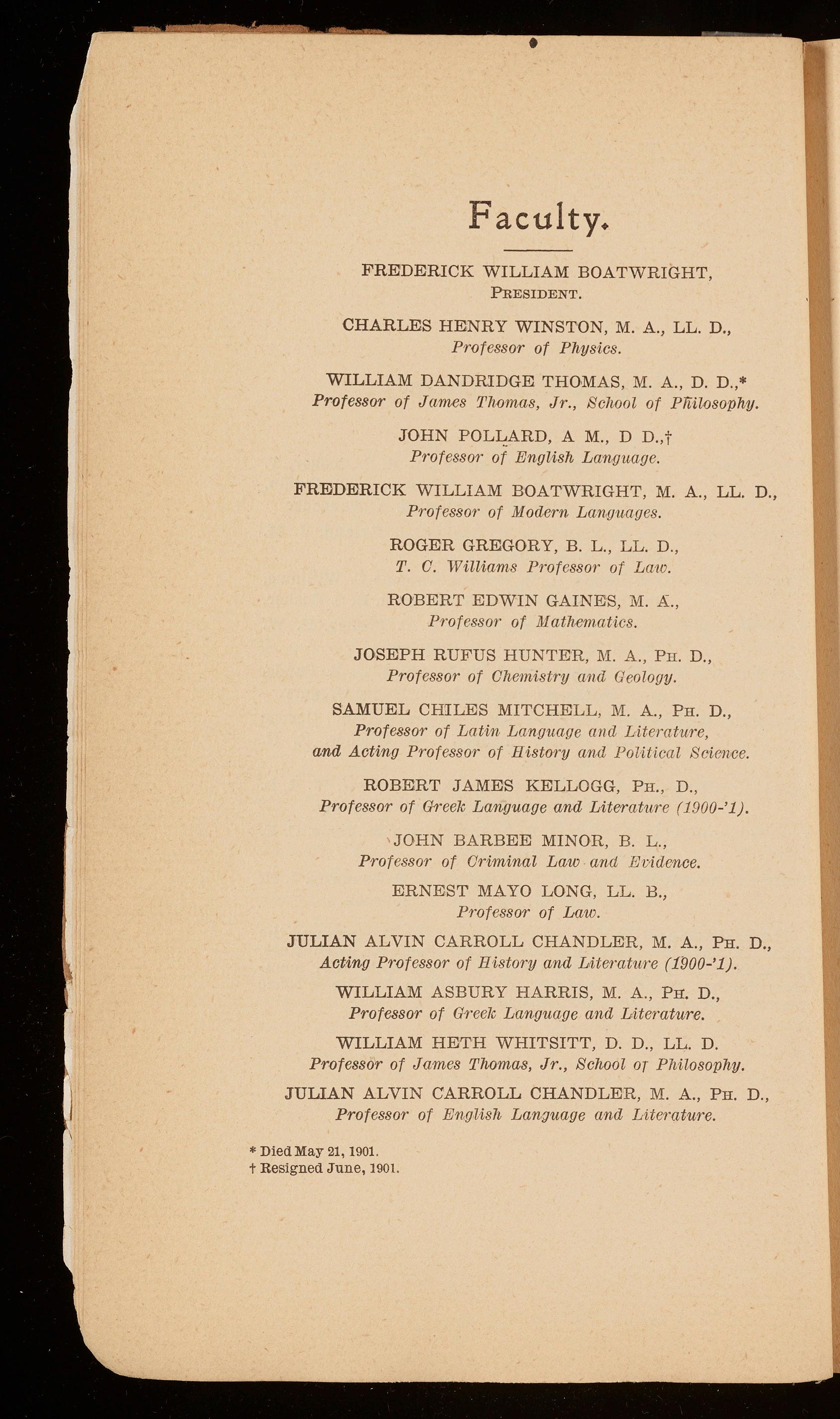
FREDERICK WILLIAM BOATWRIGHT, PRESIDENT.
CHARLES HENRY WINSTON, M. A., LL. D., Professor of Physics.
WILLIAM DANDR1DGE THOMAS, M. A., D. D.,* Professor of Jam es Thomas, Jr., School of PTi-iiosophy.
JOHN POL~RD, AM., D D.,t Professor of English Language.
FREDERICK WILLIAM BOATWRIGHT, M. A., LL. D., Professor of Modern Langu ,ages
ROGER GREGORY, B. L., LL. D., T. C. WiUiams Professor of Law.
ROBERT EDWIN GAINES, M. A., Professor of Mathematics.
JOSEPH RUFUS HUNTE'R, M.A., PH. D., Professor of Ohemistru and Geology.
SAMUEL CHILES MITCHELL, M. A., PH. D., Professor of Latin Language and Literature, and Acting Professor of History and Pol-itical Science
ROBERT JAMES KELLOGG, PH., D., Professor of Greek Language and Literatiire (1900 -'1).
JOHN BARBEE MINOR, B. L., Prof essor of Crimina l Law and Euidence.
ERNEST MA YO LONG, LL. B., Professor of Law.
JULIAN ALVIN CARROLL CHANDLER, M.A., PH. D , Acting Prof essor of History and Literatitre (1900-'1).
WILLIAM ASBURY HARRIS, M. A., P:s:. D., Professor of (}reek Language and Literature.
WILLIAM HETH WHITSITT, D. D., LL. D. Professor of James Thomas, Jr., School or Philosophy.
JULIAN ALVIN CARROLL CHANDLER, M .A., PH. D., Prof essor of English Language and Literature.
* Died May 21, 1901. t Resigned June, 1901.
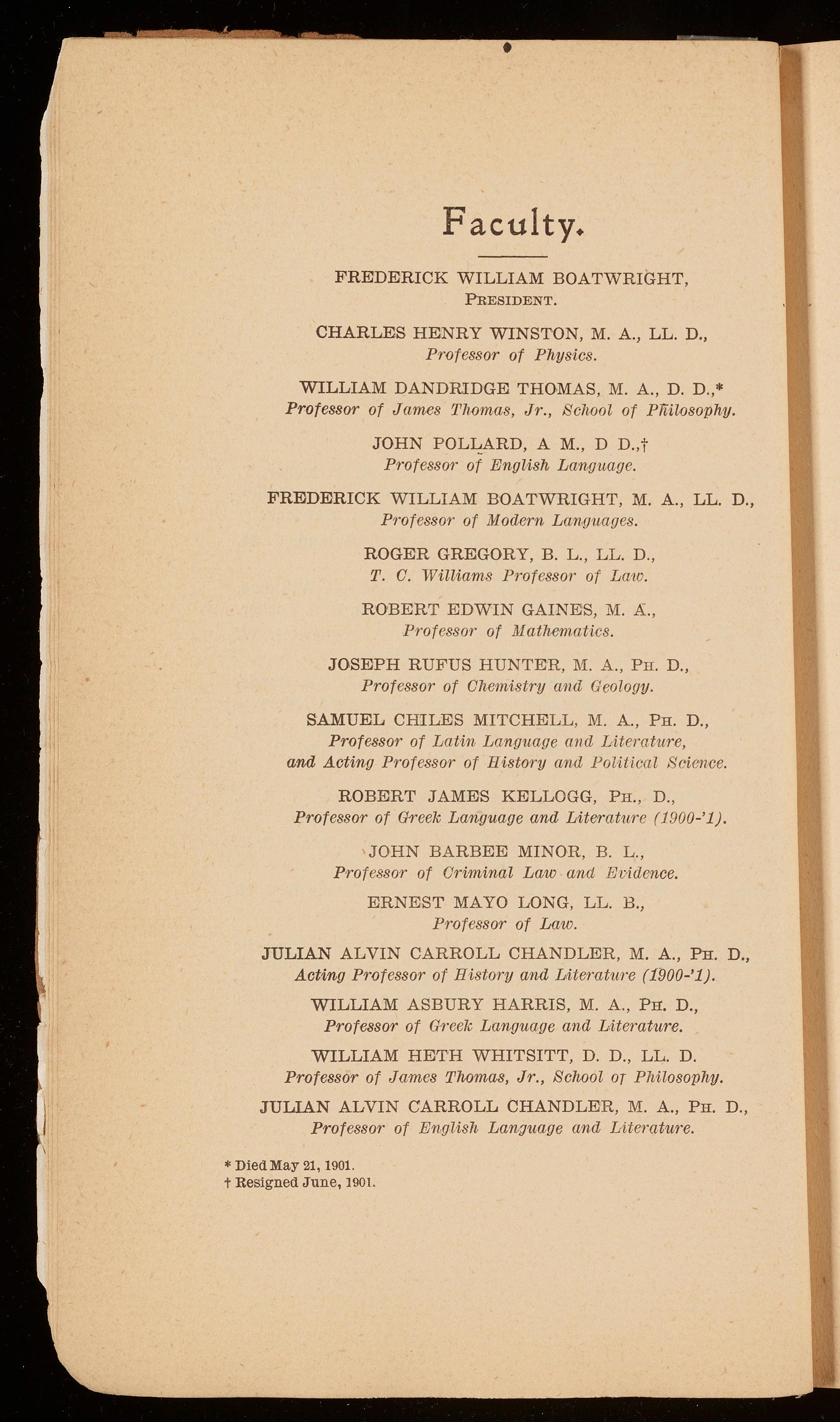
FREDERICK WILLIAM BOATWRIGHT, PRESIDENT.
CHARLES HENRY WINSTON, M. A., LL. D., Professor of Physics .
WILLIAM DANDRIDGE THOMAS, M. A., D. D.,* Professor of James Tlwmas, Jr., School of PTfilosophy.
JOHN POL~ARD, AM., D D.,t Professor of EngUsh Language
FRE D E R ICK WILLIAM BOATWRIGHT, M.A., LL. D., Professor of Modern Languages.
ROGER GREGORY, B. L., LL. D., T. C. Williams Professor of Law.
ROBERT EDWIN GAINES, M. A., Professor of Mathernatics.
JOSEPH RUFUS HUNTER, M.A., PH. D., Professor of Chemistry and Geology.
SAMUEL CHILES MITCHELL, M. A., PH. D., Professor of Latin Language ancl Literature, and Acting Professor of History and Pol-itical Science.
ROBERT JAMES KELLOGG, PH., D., Professor of Greek Language ancl Literature (1900-'1).
, JOHN BARBEE MINOR, B. L., Professor of Criminal Law and E1Aclence.
ERNEST MA YO LONG, LL. B., Professor of Law.
JULIAN ALVIN CARROLL CHANDLER, M.A., PH. D., Acting Professor of History ancl Literatiire (1900-'1).
WILLIAM ASBURY HARRIS, M. A., Prr. D., Professor of Greek Language and Literature.
W I LLIAM HETH WHITSITT, D. D., LL. D. Professor of James '1.'homas,Jr., School or Philosophy.
JULIAN ALVIN CARROLL CHANDLER, M A., PH. D., Professor of English Language ancl Literature.
* Died May 21, 1901. t Resigned June, 1901.

J:90J:-J:902 . .,,. .JI, .,,.
1901-Thursday , S,ept ember 19th-Opening of the Session.
1902-Tuesday, Ji1ebruary 4.th-Beginning of Second Half-Session , Tu esday,F ebruary 4th-Semi-Annual Meeting of the Trustees.
Sunday , June 8th-Commencement Sermon.
Monday, Jitne 9th-Ce1ebmtion of Literary Societies . Tuesd,ay, June 10th-Exercises of Class of 1901.
Wednesday , June 11th-Annual Meeting of the Trustees.
Thursday , June 12th-Closing Exercises .
J:90J: . .JI, .JI, .,,.
Commencement Sermon by Rev George W Quick, D. D., Pastor of First Baptist Church, Springfieid, Mass.
Commencement Address by William E. Hatcher , D. D ., LL D , of Richmond, Va
Abbit t , B B. Greek ,
Ander t on, 0. W.
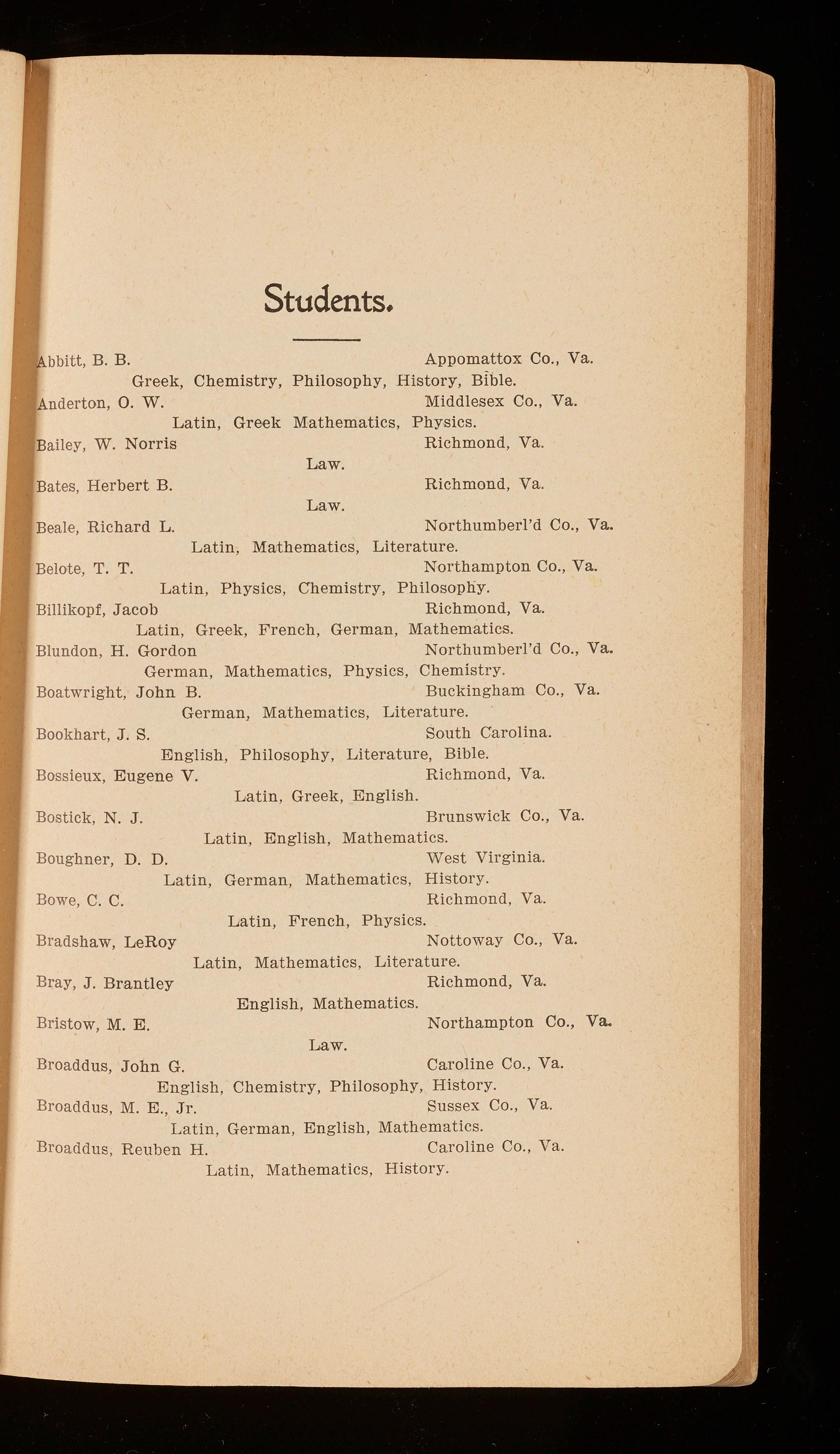
Appomattox Co., Va. Chem i stry, Philosophy, History , Bible. Middlesex Co., Va.
Latin, Greek Mathematics , Physics. Bailey, W. Norris Richmond, Va
Bates, H erbert B. Law.
Beale, Ri chard L.
Richmond, Va
Northumberl'd Co., Va. Law.
Latin , Mathematics , Literature.
Belote, T. T. Northampton Co., Va.
Latin, Physics , Chemistry, Philosophy. Billik opf , Jacob Richmond, Va .
Latin, Greek , French , German , Math ematics.
Blundo n , H. Gordon
Northumberl ' d Co., Va. German, Mathematics, Physi cs , Chemistry .
Boatwr ight , John B.
Bookh art , J. S.
Bu ckin gham Co., Va. G erman , Ma thematic s , Lit eratur e
South Carolina
English , Philosophy, Literature , Bible Bossie u x, Eugene V.
Bostick, N. J.
Boughn er , D. D.
Bowe, C. C.
Ri chmond, Va Latin, Greek, English.
Brunswi ck Co., Va.
Latin , English , Math emati cs
W es t Virgini a. L a tin, German , Mathematics , Hi s tor y
Ri chm o nd , V a . Latin , French, Physics.
Brads haw , LeRoy Nottoway Co., Va Latin, Math ematics , Lit erature Bray, J. Brantley
Br ist ow , M. E.
Broa ddus , John G
English, Mathematics.
Ri chmond, Va.
Northampton Co., Va. Law.
Caroline Co. , Va . English , Chemistry, Philosophy, History
Broa dd u s, M E. , Jr.
Su ss ex Co., Va Latin , German , English , Math e m a ti cs.
Broadd u s, R euben H.
Ca rolin e Co , Va Latin, Mathemati cs , History
RICHMOND COLI.EGE.
Burcher, G. W. Warwick Co., Va. Mathematics, English, Literature.
Buxton, E. P. Warwick Co., Va. Greek, Mathematics, Physics, History.
Cammack, J. W. Orange Co., Va. Latin, German, Philosophy, History.
Campbell, C. King William Co., Va. Latin, English, Mathematics.
Cannon, A. M. Richmond, Va.
Carney, T. E.
Carter, W. H. Law.
Norfolk Co., Va. Latin, Chemistry, History, Literature. Montgomery Co., Va. Latin, Greek, Mathematics, Physics.
Chowning, G. T. Lancaster Co., Va. Latin, Mathematics, Literature.
Clark, W. P. Chesterfield Co., Va. Latin, Greek, German, History.
Collier, C. L. Elizabeth City Co., Va. Law.
Collier, F. A. Elizabeth City Co., Va, German, Mathematics, History, Literature.
Compton, U. B. Culpeper Co., Va.
Cousins, C. C.
Cox, L.B.
Cox, W. D.
Cox, R. B.
Crow, H. M.
Davis, B. A.
Deans, H. L.
Deans, P. P.
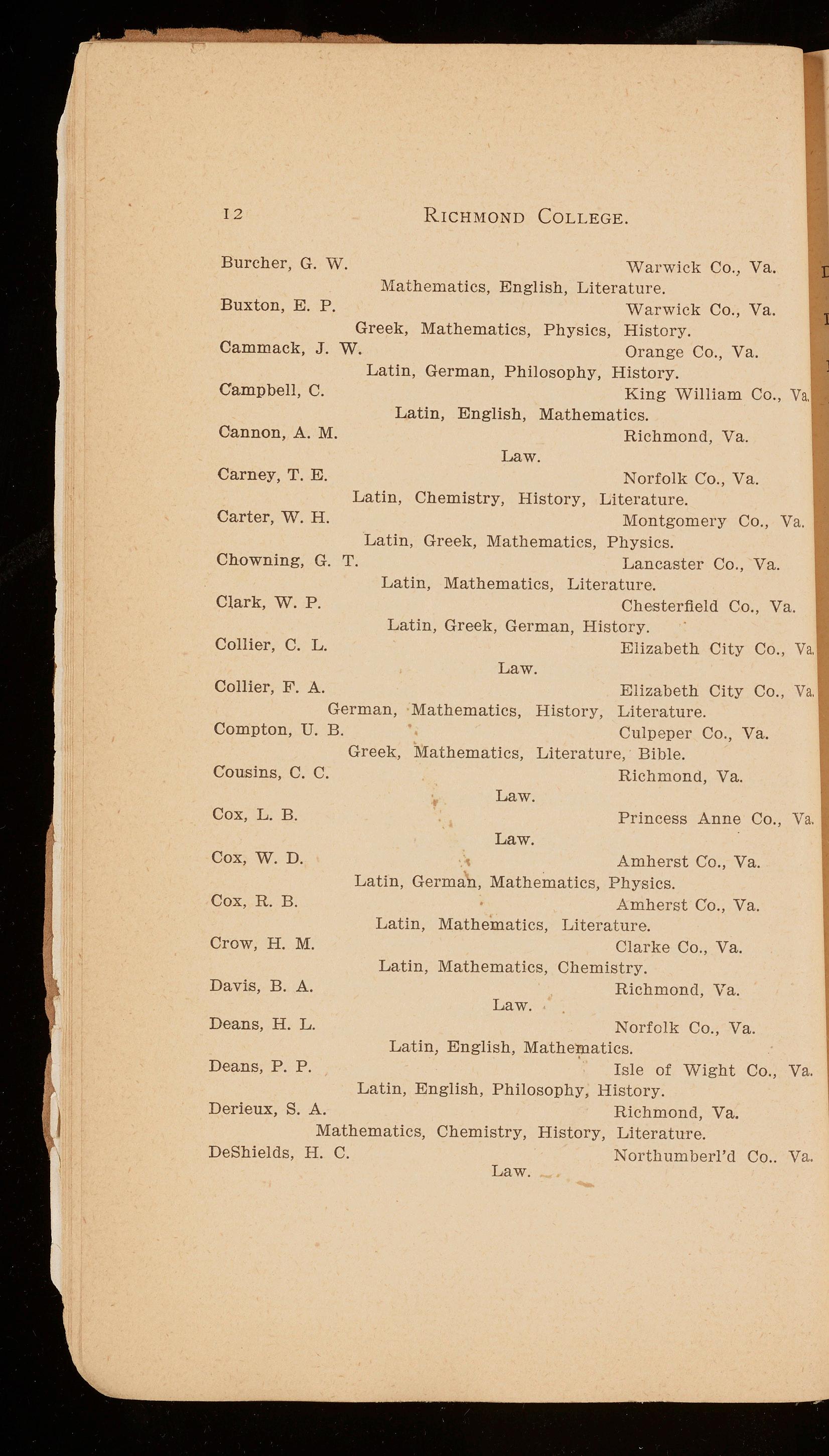
Greek, Mathematics, Literature, Bible. Richmond, Va. ·, Law.
Princess Anne Co., Va. Law. Amherst Co., Va. Latin, German, Mathematics, Physics. Amherst Co., Va. Latin, Mathematics, Literature. Clarke Co., Va. Latin, Mathematics, Chemistry. Richmond, Va. Law.
Norfolk Co., Va. Latin, English, Mathe~atics. Isle of Wight Co., Va. Latin, English, Philosophy, History.
Derieux, S. A. Richmond, Va. Mathematics, Chemistry, History, Literature.
DeShields, H. C. Northumberl'd Co .. Va. Law.
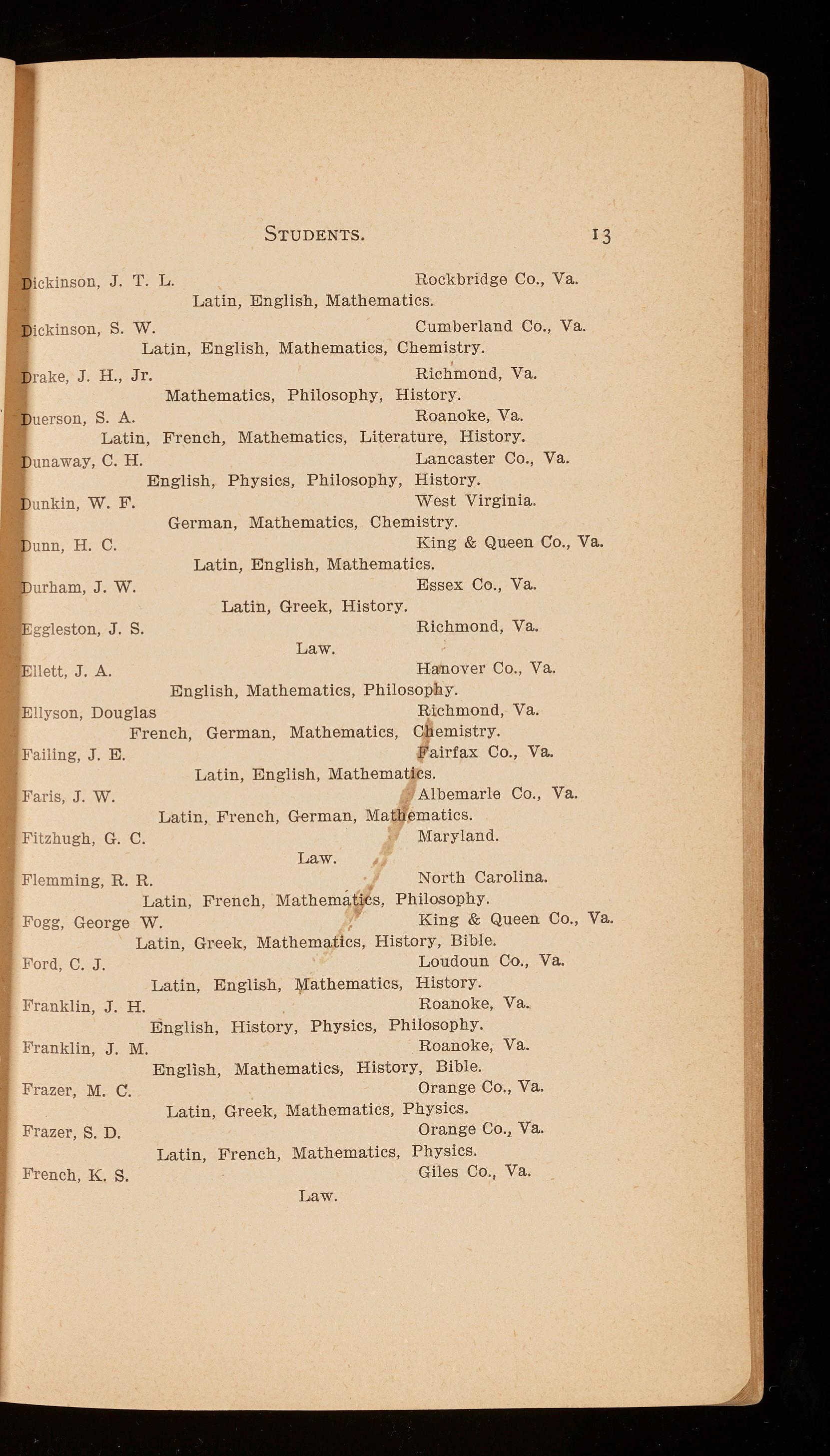
Dickinson , J. T. L. Rockbridge Co., Va. Latin, English, Mathematics.
Dickins on, S. W Cumberland Co., Va. Latin, English, Mathematics, Chemistry.
Drake, J. H., Jr. Richmond, Va. Mathematics, Philosophy, History.
Duerso n, S. A. Roanoke, Va. Latin, French, Mathematics, Literature, History. Dunaw a y, C. H. Lancaster Co., Va. English, Physics, Philosophy, History. Dunkin, W. F. West Virginia. German, Mathematics, Chemistry.
unn , H. C King & Queen Co., Va. Latin, English, Mathematics.
Dur ha m, J. W. Essex Co., Va. Latin, Greek, History.
E ggles ton , J. S. Richmond, Va. Law.
E llet t, J. A Hanover Co., Va. English, Mathematics, Philosophy.
E llyso n , Douglas Richmond, Va. French, German, Mathematics, Chemistry.
F ailing, J. E. :{i'airfax Co., Va. Latin, English, Mathematics.
F aris, J. W. Albemarle Co., Va. Latin, French, German, Mathematics. Fitzh ugh , G. C. Maryland. Law
Flemm ing , R. R. North Carolina. Latin, French , Mathematics , Philosophy. Fogg, George W. King & Queen Co., Va. Latin, Greek , Mathematics, History, Bible.
For d , C. J. Loudoun Co., Va. Latin, English, l}fathematics, History.
F r anklin, J. H. Roanoke, Va. English, History, Physics, Philosophy.
Fra nklin, J. M. Roanoke, Va. English, Mathematics, History, Bible.
Fraze r, M. C. Orange Co., Va. Latin, Greek, Mathematics, Physics.
Fr azer, S. D. Orange Co., Va. Latin, French, Mathematics, Physics.
Fre nch, K. S. Giles Co., Va. Law.
Gaines, W. W.
RICHMOND COLLEGE.
South Carolina.
Garnett, C. B. Latin, Mathematics, Physics, History. Law.
Garrow, J. Toomer Law.
Gaw, B. D. Bible.
Gilliam, R. W., Jr, Law.
Goodwin, N. H.
Mathews Co., Va.
Warwick Co., Va.
Augusta Co., Va. Petersburg, Va.
Amherst Co., Va. Mathematics, Chemistry, History.
Griffin, J. C. North Carolina. English.
Gurney, C. H., Jr. Richmond, Va. Law.
Gwaltney, L. L.
Ham, W. H.
Sussex Co., Va. Latin, Greek, English, Mathematics, Bible.
Hankins, J. G. Richmond, Va. Latin, English, Mathematics. Richmond, Va. Law.
Harris, Isabel Richmond, Va. English, Mathematics, Physics, Literature. Harris, Mary Culpeper Co., Va. Latin, French, Mathematics, Physics.
Harris, J. D. Mecklenburg Co., Va.
Hartman, B. M.
Hazelgrove, L. C. Law. Law. Law. Richmond, Va.
Hic~s, R. F.
Hanover Co., Va.
Powhatan Co., Va. Latin, Greek, Mathematics.
Holland, H. H. Sussex Co., Va. Latin, Mathematics, Physics.
Hotchkiss, E. D., Jr. Richmond, Va. Literature, History.
Hubbard, J. S. Pittsylvania Co., Va. Latin, English, Mathematics.
Hudgins, R. L. Buckingham Co., Va Latin, Mathematics, History, Literature.
Hudgins, R. S. Elizabeth City Co., Va. German, Mathematics, Literature.
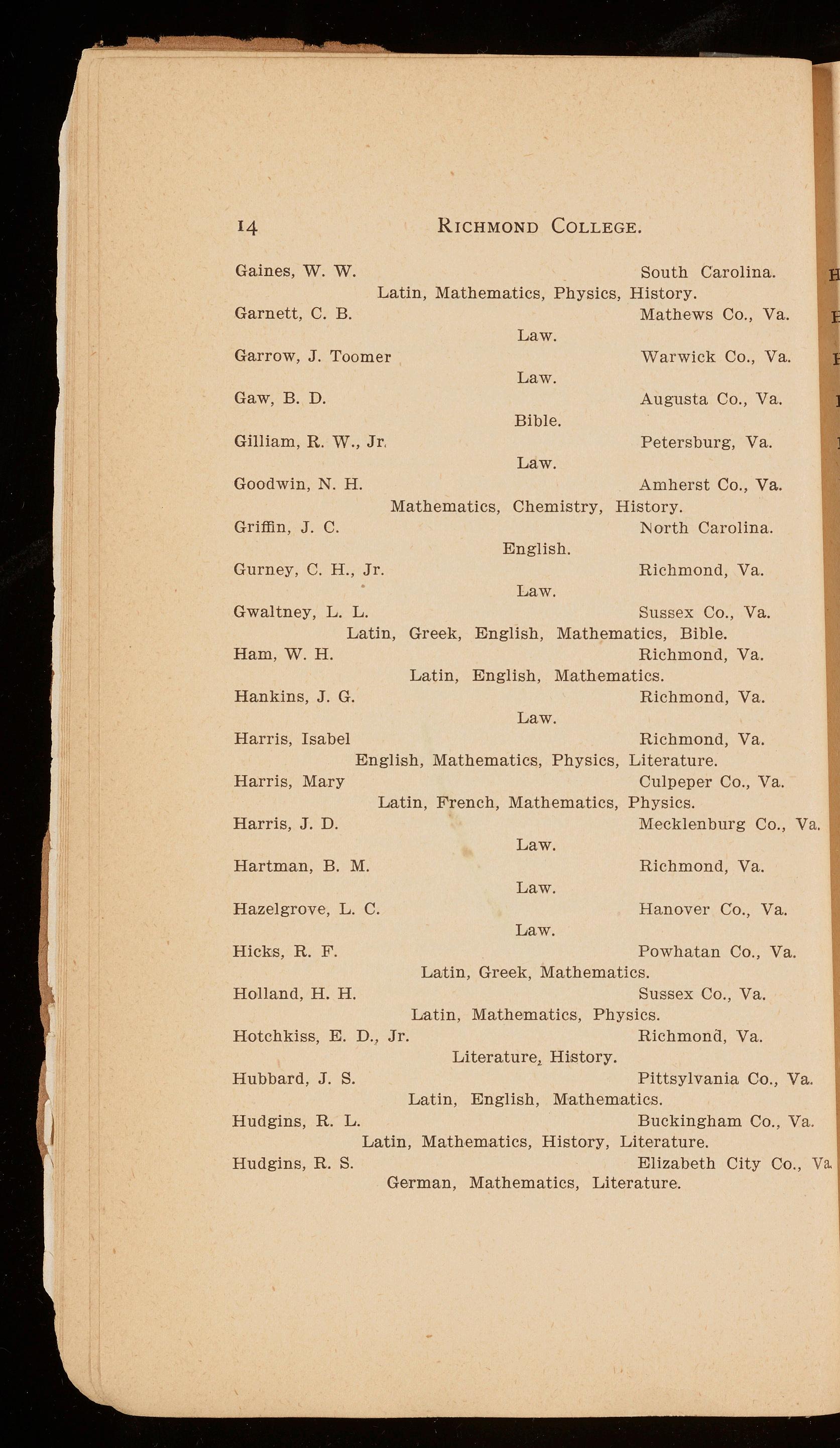

Hudmon, G. N. Alabama. French, Chemistry, Literature.
Hughes, J. M. Rappahannock Co., Va. Latin, German, English, Mathematics. Hughes, T. E. Rappahannock Co., Va. Latin, German, English, Mathematics. Hundley, G. T. Richmond, Va. Latin, Mathematics, Physics. !' Anson, Tillar South Caroliu1. Latin, Greek, English, Mathematics, Bible. Isaacs, G. G. Russell Co., Va.
J enkins, C. A.
Jenkins, L. H.
Jennings, J. W. Law.
North Carolina. Latin, Greek, English, Physics. J:1.1chmond,Va. English, History. Norfolk Co., Va. Latin, English, Mathematics.
Jennings, L. L. Culpeper Co., Va. Latin, Mathematics, Chemistry, Literature. Johnson, J. J. Southampton Co., Va. Latin, Greek, Mathematics, Bible.
Jones, A. W. H. Spotsylvania Co., Va. Latin, Greek, French. Jones, J. D. Fluvanna Co., Va. Latin, M<athematics, Chemistry.
Kerfoot, A. M. Clarke Co., Va. Latin, English, Mathematics.
Kerfoot, F. W. Clarke Co., Va. Latin, Greek, Physics.
Kidwell, J. H. West Virginia. Latin, Greek, Mathematics.
Kincheloe, J. W. Fairfax Co., Va. Greek, Mathematics, Philosophy. Lacy, B. W. Richmond, Va. Mathematics.
Lacy, R. T., Jr. Richmond, Va. Latin, Mathematics, Physies. Lankford, M. Norfolk, Va. Latin, Mathematics, Literature. Lassiter, N. C. North Carolina. English, History, Literature, Bible.
Leafe, N. S. Frederick Co., Va. Latin, French, Mathematics, Physics.
Lewis, J. T.
Lilliston, B. K.
Lloyd, M. R.

RICHMOND COLLEGE.
Richmond, Va. Law . Accomac Co., Va. French, English, Mathematics. Chesterfield Co., Va Law
Lowe, W. E. Loudoun Co , Va. Physics, Chemistry, Philisophy , Literature.
MacBain, H. L. Richmond, Va. English, Physics, Philosophy
McCabe, J. P., Jr. Bedford Co., Va Greek, German, Mathematics, History.
Mccaul, T. V. Richmond, Va. Greek, French, Chemistry, Philosophy.
McConnell, S. Lynchburg, Va. Latin, English, Mathematics , Chemistry, Philosophy, Literature.
McElroy, C. W. Bath Co. , Va . Latin, English , History.
McFarland, Robert A. North Carolina Latin, Mathematics, Chemistry.
McNiel, Henry Franklin Co., Va. Latin , English, Mathematics.
Mallory, W. L. Chesterfield Co., Va. Law
Marshall, Otis Orange Co ., Va. Latin, English, Mathematics. Martin, H. Ca roline Co. , Va. Physics, Philosophy, History , Literature . Massie, P. R. Amherst Co ., Va. Physics, Chemistry , Philosophy.
Mathews, S. T. Norfolk , Va Latin, Greek, Mathematics, History. Mitchell, J. L. Norfolk Co., Va., Latin, English, Mathematics , Bible . Moncure, J. Ri chmond, Va.
Moncure, R. C. L.
Moore, T. V.
Morgan, G. D.
Morrison , A. K.
Latin, Greek, Mathematics. Richmond, Va. Latin, Greek, Mathematics Richmond , Va Law.
Richmond, Va. French, English , Mathematics. Scott Co., Va. Latin, Engli s h, Math e mati cs.
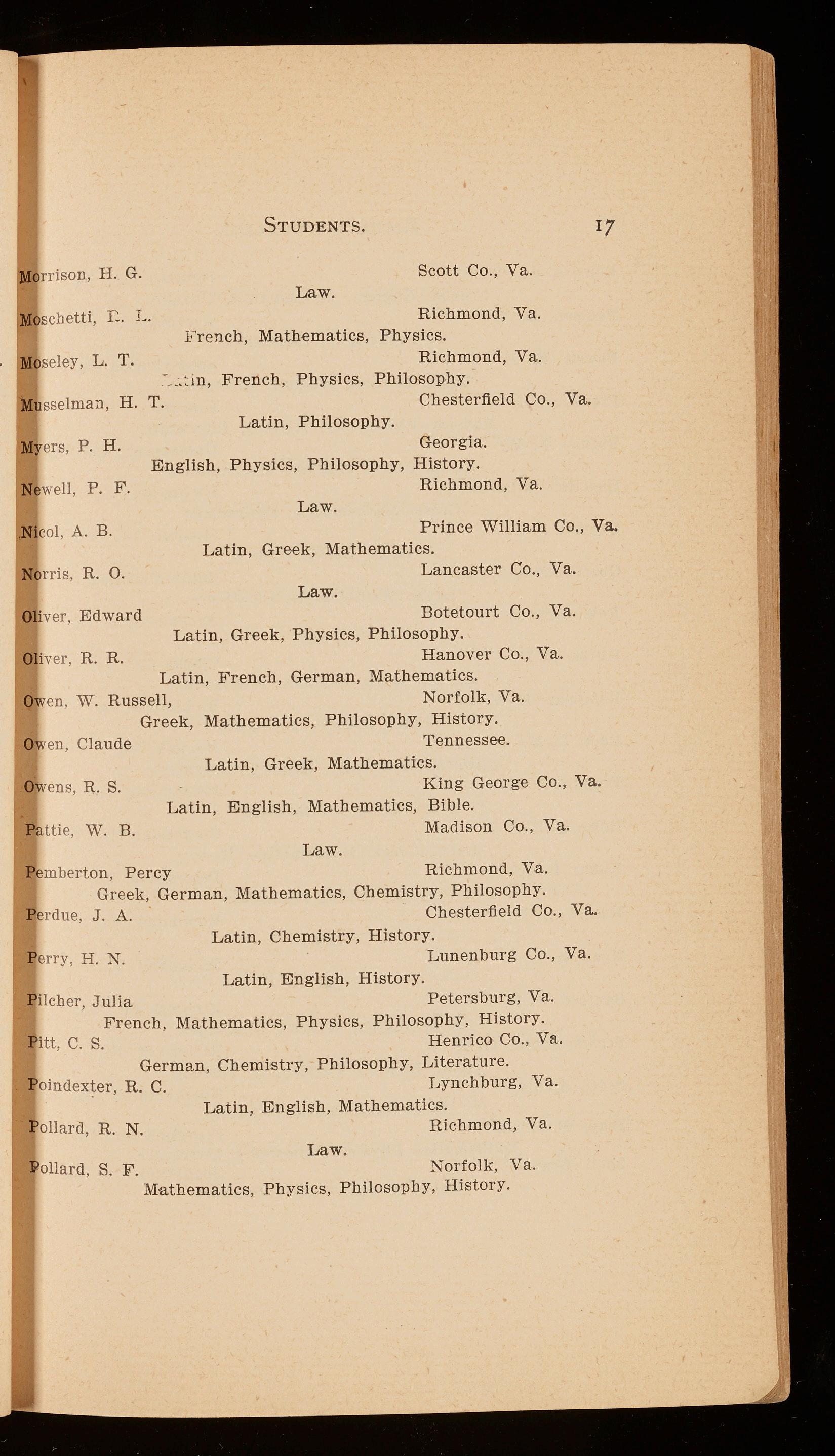
orrison, H. G. Scott Co., Va . Law
Moschetti, r.. L Richmond, Va. F rench, Mathematics, Physics. Moseley, L . T. R ichmond, Va . -_..-.:m, French, Physics , Philosophy. Musselman, H T. Chesterfield Co., Va. Latin, Philosophy.
Myers, P . H Georgia. Eng l ish , Physics, Philosophy, History.
Newell, P. F . Richmond, Va. Law.
Nicol, A. B. Prince William Co., Va. Latin, Greek, Mathematics
Norris, R. 0. Lancaster Co., Va. Law.
Oliver, E dward Botetourt Co., Va Latin, Greek, Physics, Philosophy.
Oliver, R. R. Hanover Co., Va. Latin, French, German, Mathematics.
0 en, W. Russell, Norfolk, Va. Greek , Mathematics , Philosophy, History. Owen, Cla ude Tennessee. Latin, Greek, Mathematics.
Owens, R. S. King George Co., Va. Latin, English, Mathematics , Bible Pattie, W. B. Madison Co , Va. Law.
Pemberto n , Percy Richmond, Va. Gr eek, German, Mathematics, Chemistry, Philosophy. Perdue, J. A. Chesterfield Co., Va.
Berry, H. N.
P ilcher, J ulia Fr en ch ,
P itt, C. S. Latin, Chemistry , History. Lunenburg Co., Va. Latin, English, History. Petersburg , Va. Mathematics, Physics , Philosophy , History . Henrico Co., Va German , Chemistry, Phi losophy, Literature . P oindexte r , R. C. Lynchburg, Va. Latin, English , Mathematics.
P ollard, R. N. Richmond, Va. Law.
P ollar d , S. F. Norfolk , Va. Mathematics , Physics , Philosophy, History
RICHMOND COLLEGE.
Pope, A. S. Henrico Co., Va. French, English, Mathematics, Physics.
Poulson, E. T. Accomac Co., Va. Philosophy, Literature.
Powell, W. P. Spotsylvania Co, Va. Latin, Physics, History, Literature.
Provence, E. W. F 10rida. Physics, Philosophy, History, Literature.
Putney, F. W. Cumberland Co., Va. Latin, Greek, English, Mathematics.
Quarles , Catharine P. Richmond, Va. Greek, Mathematics, Philosophy.
Quarles J. C.
Quattlebaum, W. D.
Latin, Greek, French . Henrico Co., Va South Carolina. Latin, Mathematics, Literature.
Rew, Harry Accomac Co., Va Law.
Ritter, L. M. Clarke Co., Va Latin, Greek, German, Philosophy.
Robinson, C V. Richmond, Va. Latin, French, Literature.
Rock, C. M. Norfolk, Va. Physics, Philosophy, History, Literature.
Roper, W. N. Petersburg, Va.
Rowe, J. H.
Ruffin, H. C.
Russell, J. M.
Ryan, E. L.
History, Literature. Gloucester Co., Va Latin, Greek, Mathematics, History. Petersburg, Va. Latin, Greek, Philosophy. Richmond, Va . Law. Richmond, Va. Law
Sanford, T. R. Accomac Co., Va. Latin, English, History, Literature.
Schwarzschild, G. M. Richmond, Va. Latin, English, Philosophy, History.
Scott, Stanley Northampton Co., Va. Latin, Mathematics, History.
Seay, W. Mosby Fluvanna Co., Va. Mathematics, Physics, Philosophy, Literature . Shell, Gray Brunswick Co., Va. Latin, Mathematics , Literature

Shepard, J. W.
Sheriff, C. W.
Simpson, F. A.
Sinclair, C. A.
Slater, A. A.

Tennessee.
German, English, Philosophy. Maryland. Greek, Philosophy, Literature. Richmond, Va. Law.
Prince William ·Co., Va.. Law. Richmond, Va. Mathematics.
Smith, C. N. Fauquier Co., Va.
Latin, Greek, Mathematics, Bible.
Smith, H. M. Richmond, Va .
Latin, English, Mathematics
Smith, L. W. Nelson Co., Va.
Latin, Greek, Mathematics
Smith, E. T. Petersburg, Va.
Latin, Greek, Mathematics. Smith, William Pittsylvania Co., Va. Law.
Smither, R. E. Middlesex Co., Va
Latin , German, English, Mathematics .
Sowers, Marion 0. Page Co., Va.
Latin, Mathematics, History, Literature
Spillman, M. W. Rappahannock Co., Va..
Latin, French, English, Mathematics
Staples, R. F. Norfolk Co., Va.
Latin, Greek, l'l1athematics.
Straus, I. J. Richmond, Va. Latin, German, English, Mathematics, Chemistry, Philosophy. Sublett, H. W. Richmond, Va.
Greek, Mathematics , Physics . Sutherland, LeRoy L. Richmond, Va.
Latin, Greek, Mathematics, History . Swartwo ut, J. B. Henrico Co., Va. English, Mathematics, Physics, Chemistry. Tabb, B. W. Newport News, Va.
Taylor, E H.
Templeman, S.
Terrell, A. C.
French, Chemistry, History . Norfolk, Va.
Latin, Greek, German, Mathematics H. Rappahannock , Co., Va.
Latin, Greek, Mathematics, Literature. Hanover Co., Va
Latin, Greek, German, Physics.
20
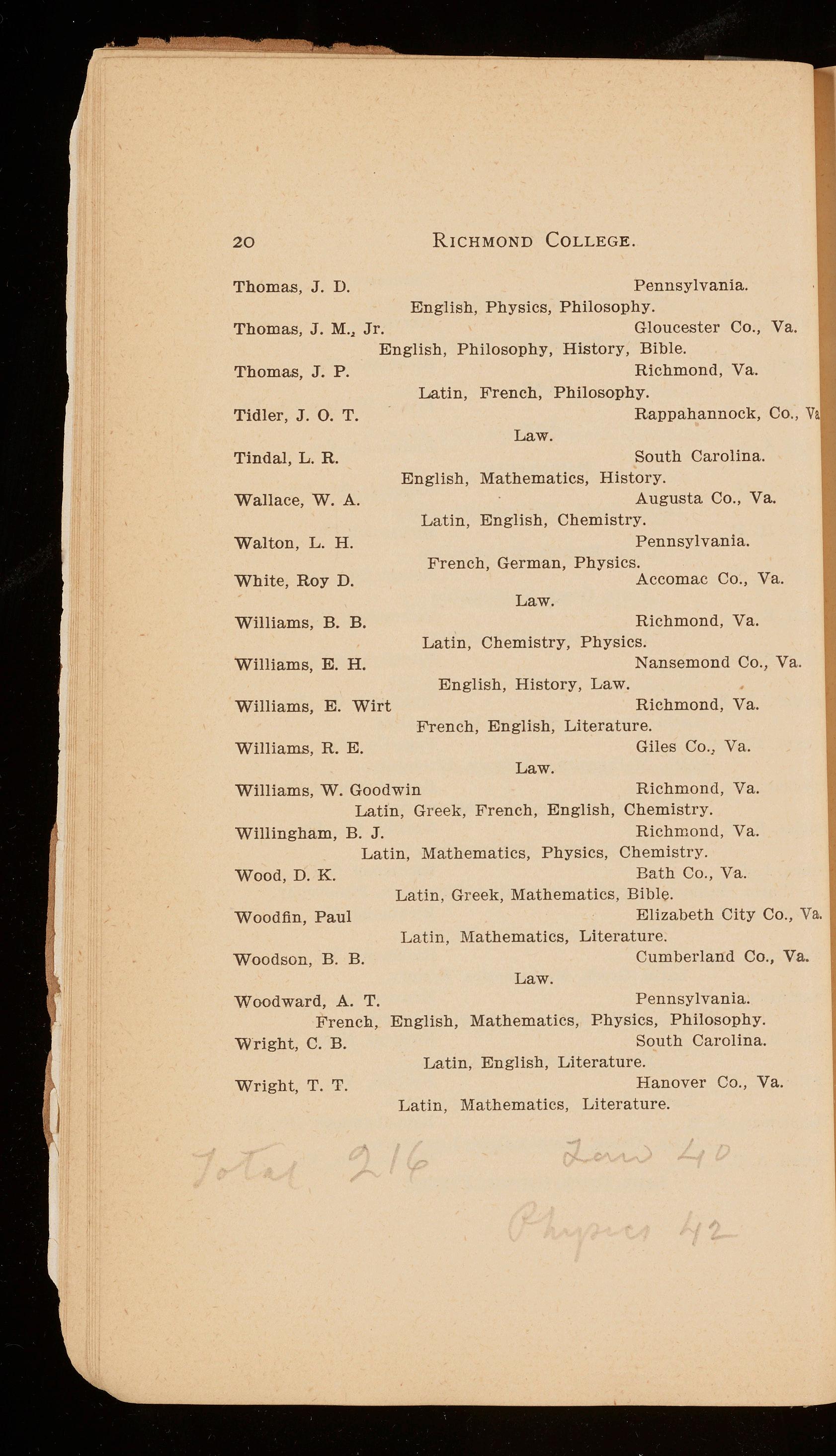
RICHMOND COLLEGE.
Thomas, J. D. Pennsylvania. English, Physics, Philosophy.
Thomas, J. M., Jr. Gloucester Co., Va. English, Philosophy, History, Bible.
Thomas, J. P. Richmond, Va.
Tidier, J. 0. T.
Tindal, L. R.
Wallace, W. A.
Walton, L. H.
White, Roy D.
Latin, French, Philosophy. Rappahannock, Co., Va Law.
South Carolina. English, Mathematics, History. Augusta Co., Va. Latin, English, Chemistry. Pennsylvania. French, German, Physics. Accomac Co., Va. Law.
Williams, B. B. Richmond, Va. Latin, Chemistry, Physics.
Williams, E. H. Nansemond Co., Va. English, History, Law.
Williams, E. Wirt Richmond, Va. French, English, Literature.
Williams, R. E. Giles Co., Va. Law.
Williams, W. Goodwin Richmond, Va. Latin, Greek, French, English, Chemistry.
Willingham, B. J. Richmond, Va. Latin, Mathematics, Physics, Chemistry.
Wood, D. K. Bath Co., Va. Latin, Greek, Mathematics, Bible.
Woodfin, Paul Elizabeth City Co., Va. Latin, Mathematics, Literature.
Woodson, B. B. Cumberland Co., Va. Law.
Woodward, A. T. Pennsylvania. French, English, Mathematics, Physics, Philosophy. Wright, C. B. South Carolina. Latin, English, Literature.
Wright, T. T. Hanover Co., Va. Latin, Mathematics, Literature.

Degrees and Other Honors Conferred at Commencement, June l 3, l 90 l.
Doctors of Laws.
SAMUELE. WOODY, A. M., M. D ................ LOUISVILLE, KY
Doctors of Divinity.
REV. GEORGE W. QUICK, B. A SPRINGFIELD,MASS
REV. EDWARD B. POLLARD, M. A., PH. D WASHINGTON,D. C.
REV. F. H. MARTIN ................. SALEM, VA.
Masters of Arts.
JOHN WALTER CAMMACK ORANGE Co
Thesis: Lessing's Influence on German Literature.
HOWAR D LEE MACBAIN . ................... RICHMOND
Thesis: Evolution as Applied to Ethics.
HENRY MARTIN ................................... CAROLINECo
Thesis: A Presentation and Discussion of Madison's Views on Agriculture.
CULLEN SANDIDGE PITT .......................... HENRICO Co
'Thesis: James Barron Hope--V irginia's Poet Laureate.
JOHN WATS ON SHEP ARD ................. TENNESSEE
Thesis: The Gcethe-Schiller Friendship and its Literary Outcome
Bachelors of Arts.
BENJAM IN B. ABBITT ....................... APPOMATTOXCo
JOHN GARNETT BROADDUS ...................... CAROLINECo
JAMES WARE DURHAM ...................... . ESSEX Co
WILL IS EDWARD LOWE .. ... LOUDOUNCo
JAMES PLEASANT McCABE ....................... BEDFORD Co
PERCY HOWIDLL MYERS .... GEORGIA
WILLIAM RUSSELL OWEN NORFOLK
PERCY PEMBERTON ............ . ......... RICHMOND
ERNEST WATKINS PROVENCE FLORIDA
CATHAR INE PENDLETON QUARLES ........... RICHMOND
GUS MAURICE SCHWARZSCHILD . .... . ....... RICHMOND
WARREN MOSBY SEAY ..... FLUVANNA Co
BEN JAMIN WEST TABB .... NEWPORT NEWS, VA
LESLIE HARVEY WALTON ..................... PENNSYLVANIA
ARTHUR THOMAS WOODWARD PENNSYLVANIA
22
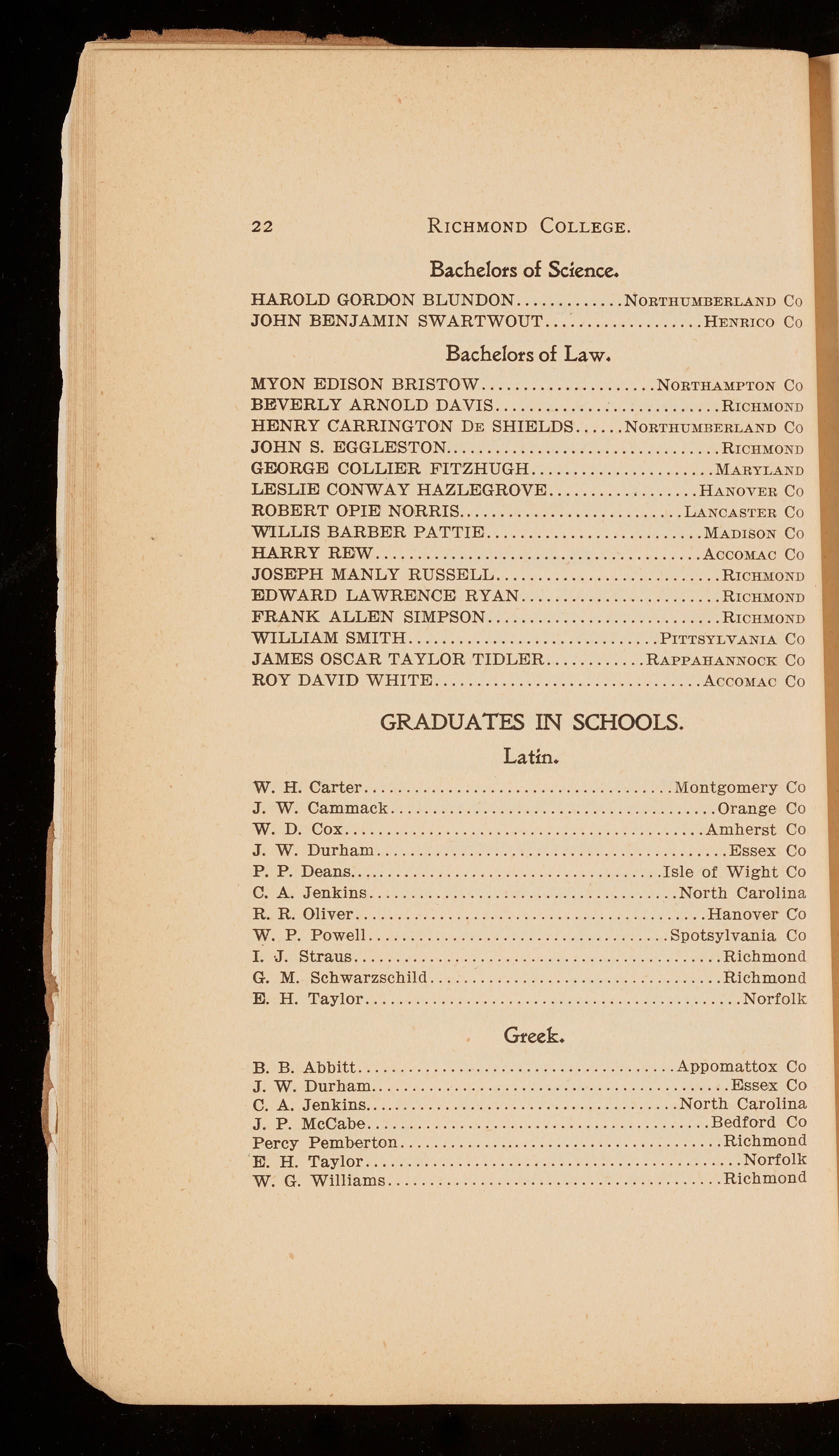
RICHMOND COLLEGE.
Bachelors of Science.
HAROLD GORDON BLUNDON ............. NORTHUMBERLANDCo
JOHN BENJAMIN SWARTWOUT HENRICO Co
Bachelors of Law.
MYON EDISON BRISTOW ..................... NORTHAMPTONCo
BEVERLY ARNOLD DAVIS Ricm,rn ND
HENRY CARRINGTON DE SHIELDS ...... NORTHUMBERLANDCo
JOHNS. EGGLESTON .... RICHMOND
GEORGE COLLIER FITZHUGH ...................... MARYLAND
LESLIE CONWAY HAZLEGROVE HANOVER Co
ROBERT OPIE NORRIS ........................... LANCASTERCo
W1LLIS BARBER PATTIE MADISON Co
HARRY RIDW AccoMAc Co
JOSEPH MANLY RUSSELL ........................... RICHMOND
EDWARD LAWRENCE RYAN ........... .......... ... RICHMOND
FRANK ALLEN SIMPSON RicrurnN D
WILLIAM SMITH PITTSYLv ANIA Co
JAMES OSCAR TAYLOR TIDLER ............ RAPPAHANNOCKCo
ROY DAVID WHITE ................................ Acco MAC Co
Latin.
W. H. Carter Montgomery Co
J. W. Cammack Orange Co
W. D. Cox ........................................... Amherst Co
J. W. Durham ...................................... .... Essex Co
P. P. Deans Isle of Wight Co
C. A. Jenkins ..................................... North Carolina
R.R. Oliver .......................................... Hanover Co
W. P. Powell .................................... Spotsylvania Co
I. J. Straus ............................................ Richmond
G. M. Schwarzschild ................................... Richmond
E. H. Taylor Norfolk
Greek.
B. B. Abbitt ... .............. ... ......... .... ..... Appomattox Co
J. W. Durham ........................................... Essex Co
C. A. Jenkins ...................................... North Carolina
J. P. McCabe Bedford Co
Percy Pemberton Richmond
' E. H Taylor Norfolk
W. G. Williams Richmond

HONORS CONFERRED AT COMMENCEMENT. 23
Douglas Ellyson ........................................ Richmond
Mary C. Harris ...................................... Culpeper Co
T. V. McCaul. .......................................... Richmond
R. R. Oliver ......................................... Hanover Co
J.C. Quarles .......................................... Henrico Co
C. V. Robinson ........................................ Richmond
B. W. Tabb ........................................ Newport News
L. H. Walton .......... ................ Pennsylvania
A. T. Woodward ......... _........................... Pennsylvania
J. W. Cammack ........................................ Orange Co
R. R. Oliver ......................................... Hanover Co
Percy Pemberton ....................................... Richmond
Cullen S. Pitt. ........................................ Henrico Co
J. W. Shepard ......... ...... Tennessee
I. J. Straus ............................................. Richmond
L. H. Walton ..................................... Pennsylvania
J. G. Broadd us ........................................ Caroline Co
P. P. Dea ns ... : ........ Isle of Wight Co
C. H. Dunaway ..................................... Lancaster Co
Isabel Harris ........................................... Richmond
C. A. Jenkins ..................................... North Carolina
H. L. MacBain ......................................... Richmond
P. H. Myers ... .......... Georgia
G. M. Schwarzschild ................................... Richmond
J. W. Shepard .......................................... Tennessee
J. B. Swartwout. ..................................... Henrico Co
E. W. Williams ....... Richmond
A. T. Woodward .... ............. Pennsylvania
B. W. Lacy, Jr ............ . ............ Richmond
H. G. Blundon ......... .. .................... Northumberland Co
D. W. Ellyson ............. Richmond
J. P. McCabe .. ......... Bedford Co
W. R. Owen .............................................. Norfolk
Percy Pemberton ..... Richmond
Catharine Quarles .. Richmond
J. B. Swartwout ...................................... Henrico Co
E. H. Taylor ............................................. Norfolk Physics.
H. G. Blundon ............................... Northumberland Co
W. E. Lowe ......................................... Loudoun Co
H. Martin ...........................................
H. L. MacBain ......................................... Richmond
J. B. Swartwout ...................................... Hen• 1co Co Chemistry.
T. T. Belote .....................................
C. S. Pitt .............................................
B. B. Williams .........................................
J. G. Broaddus ....................................•..
J. W. Cammack ........................................
P. P. Deans Isle of Wight Co
M. 0. Sowers ............................................. Page Co
B. W. Tabb ........................................ Newport News PROFICIENTSIN SCHOOLOF
W. N. Bailey .........................................
C. L. Collier ....................................
L. B. Cox Princess Anne Co
C. B. Garnett ........................................ Mathews Co
J. T. Garrow ........................................ Warwick Co
R. W. Gilliam ...................................... Dinwiddie Co
C.H. Gurney, Jr ......................... Richmond
T. V. Moore .............................................. Richmond
R. N. Pollard .......................................... Richmond
C. H. Sinclair ................................. f'rince William Co.
E. H. Williams .................................... Nansemond Co
R. E. William.s .............................. Giles Co Constitutional and International Law.
C. L. Collier ... .. ...............................
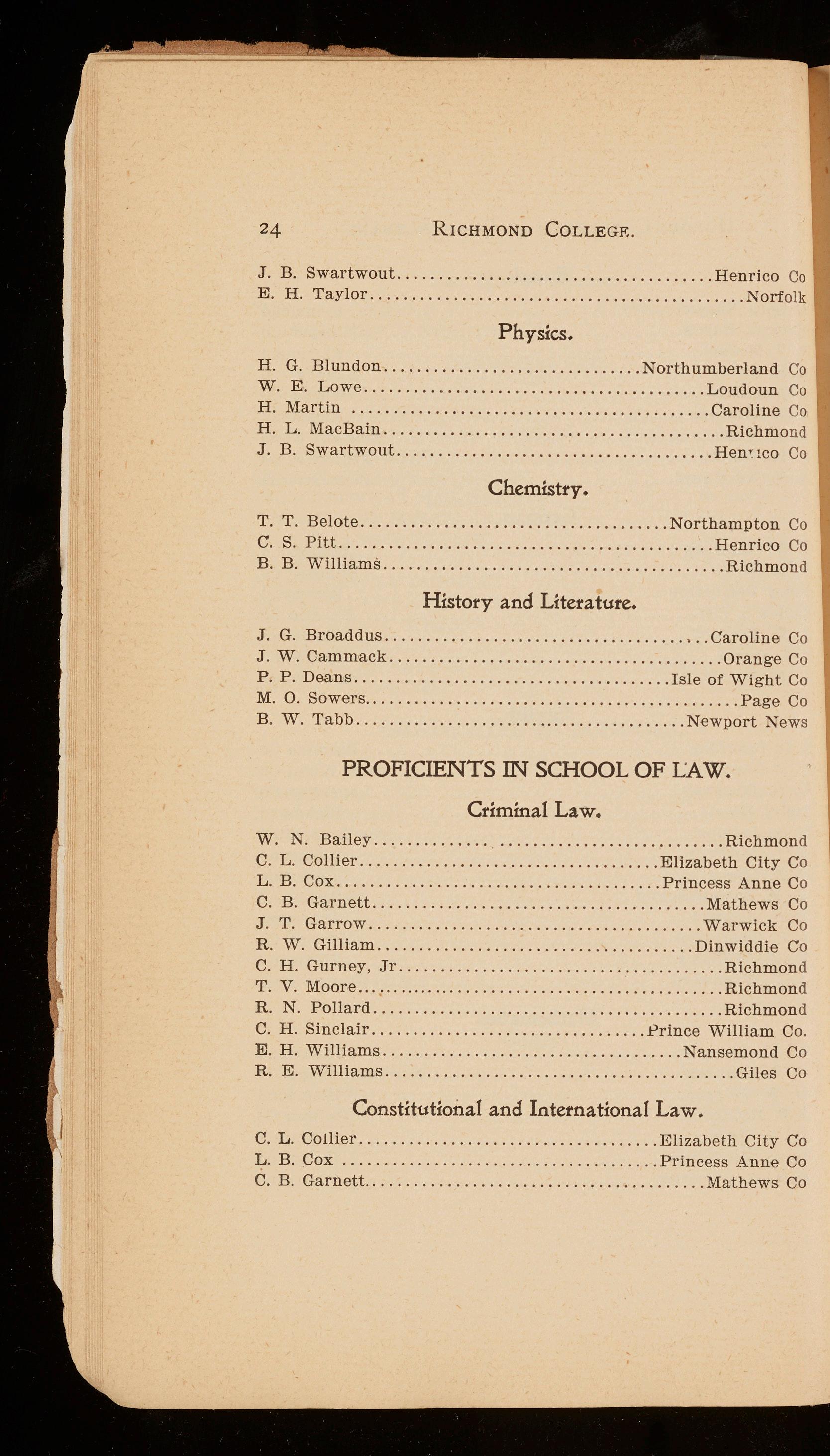
City Co
L. B. Cox ................................... Princess Anne Co
C. B. Garnett ......................................... Mathews Co
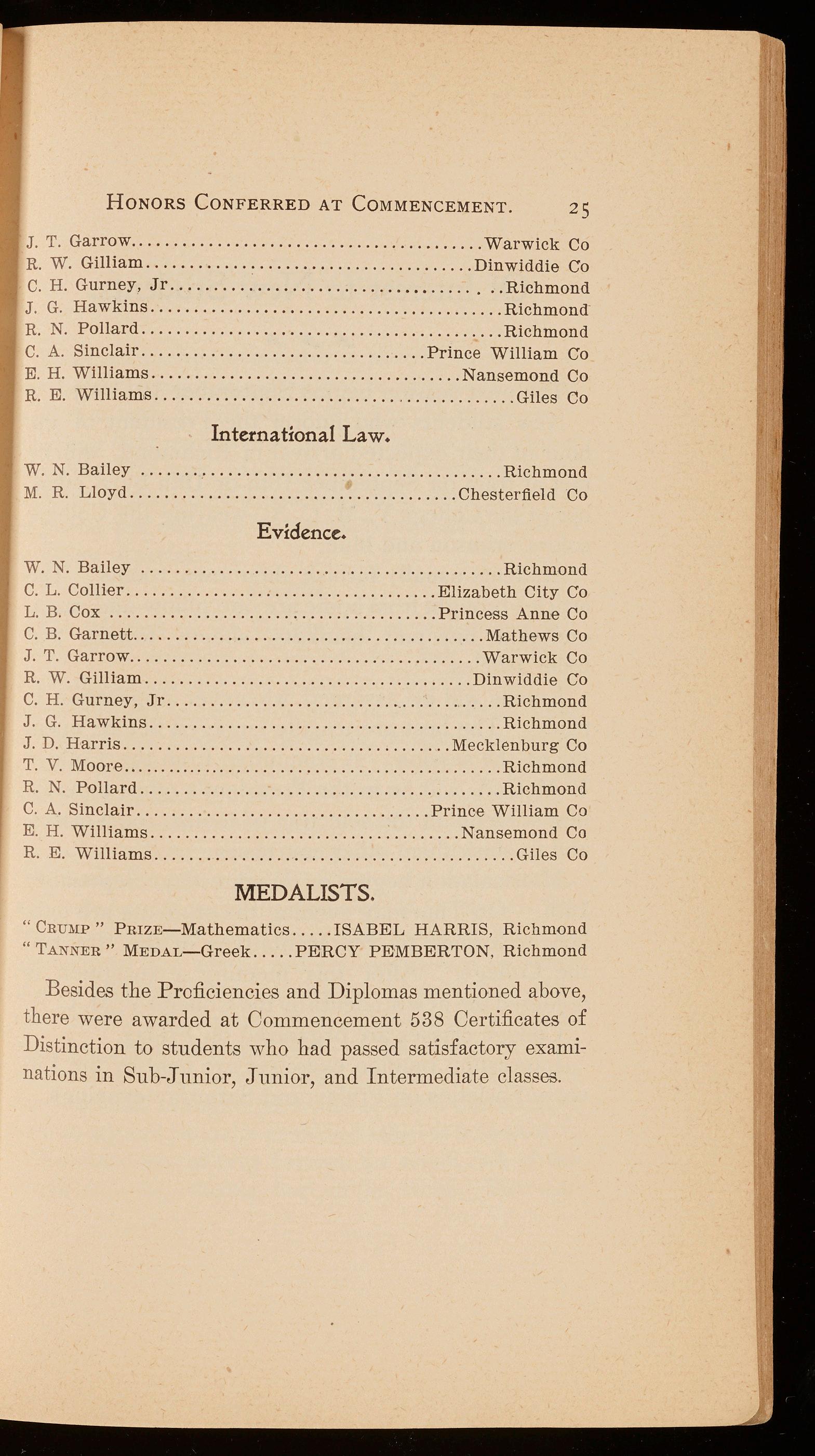
HONORS CONFERRED AT COMMENCEMENT. 25
J. T. Garrow .. ........... . ............ Warwick Co
R. W. Gilliam ...................................... Dinwiddie Co
C. H. Gurney, Jr ............................••........ Richmond
J. G. Hawkins ............. ........ Richmond
R. N. Pollard .............. . ............. Richmond
C. A. Sinclair ................................. Prince William Co
E. H. Williams ......... Nansemond Co
R. E. Williams ................................... . . ... .. Giles Co
W. N. Bailey ...... ..................... Richmond
M. R. Lloyd ...... ............ Chesterfield Co
W. N. Bailey .......................................... Richmond
C. L. Collie r .. ..... Elizabeth City Co
L. B. Cox ... .. Princess Anne Co
C. B. Garnett .. .. ........... Mathews Co
J. T. Garrow ......................................... Warwick Co
R. W. Gilliam ............ ...................... Dinwiddie Co
C.H. Gurney, Jr ..................................... Richmond
J. G Hawkins .............. ........................ Richmond
J. D. Harris ...................................... Mecklenburg Co
T. V. Moore . .. .......... Richmond
R. N. Pollard .......................................... Richmond
C. A. Sinclair .................. Prince William Co
E. H. Williams ........... Nansemond Co
R. E. Williams ................. ......... . Giles Co
"CRUAIP " PRIZE-Mathematics ISABEL HARRIS , Richmond "TANNE R" MEDAL-Greek ..... PERCY PEMBERTON , Richmond
Besides the Proficiencies and Diplomas mentioned above, there were awarded at Commencement 538 Certificates of Distinction to students ·who had passed satisfactory examinations in Sub-Junior, Junior, and Intermediate classes.

The next session begins September 19, 1901.
New students who inform the President of the hour of their expected arrival in Richmond, will be met at train on September 18th or 19th by a mem. ber of the College Y. M. C. A., wearing the Coll ege colors, crimson and blue.
Students usually furnish their own rooms. The articles brought from home are one pillow and cas es, one quilt, one pair blankets, sheers, towels, and toilet articles.
Rooms will be assigned whenever application is made. The best are usually engaged before opening of the session. A committee from the Coll ege Y. M. C. A. will be in the President's office to assist new students in the selection of rooms, room-mat es, and to show them other courtesies.
Matriculation begins on vVednesday, September 18th. On Thursday evening the students are publicly welcomed by representatives of the city and the College . After this meeting a reception is tendered the new students by the College Y. M. C. A. College classes are organized on Friday.
Interesting reunion exercises are held by th e Literary Societies on Friday and Saturday evenin gs.
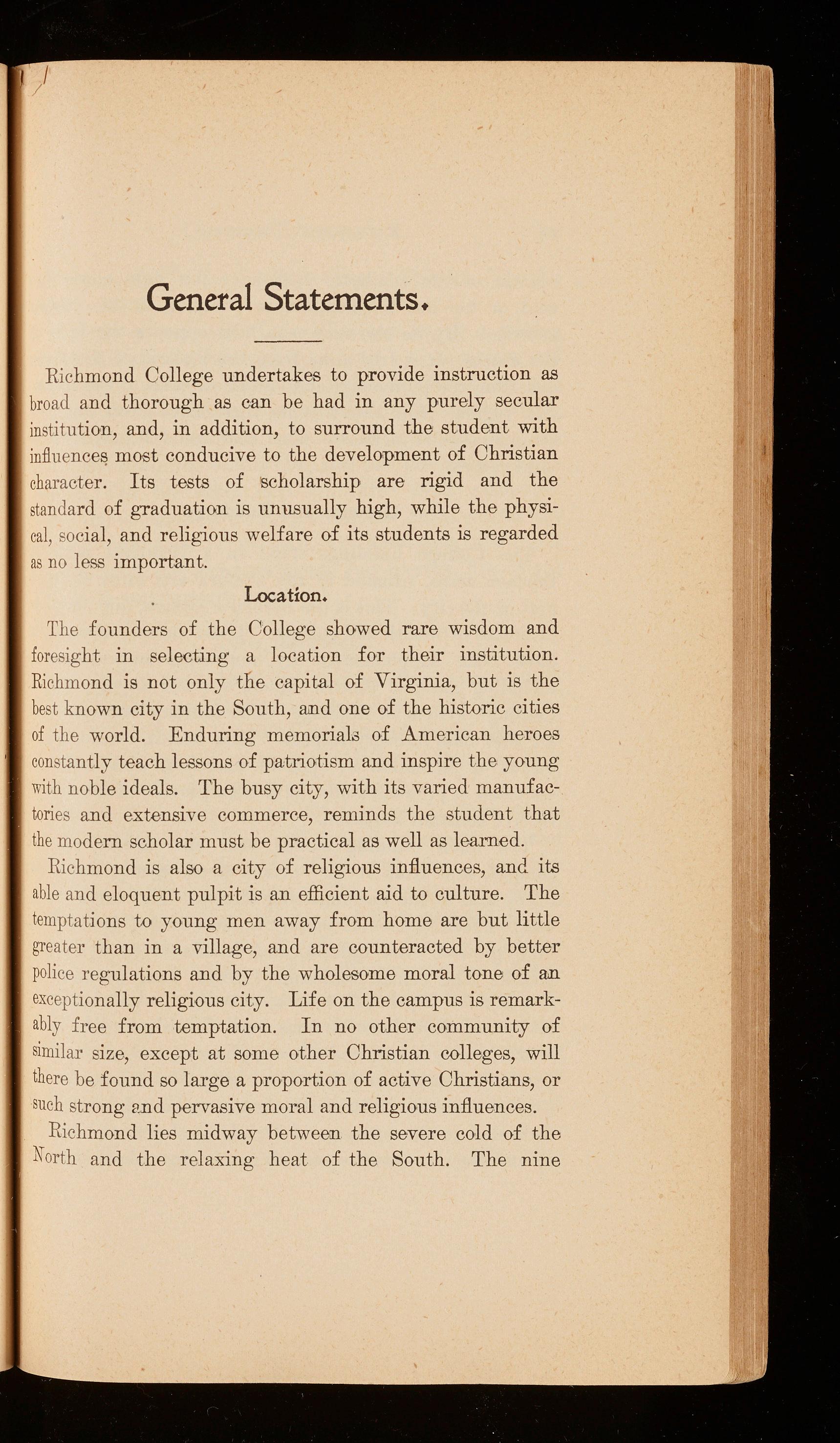
Richmond College undertakes to provide instruction as broad and thorough as can be had in any purely secular institution, and, in addition, to surround the student with influence1lmoot conducive to the development 0£ Christian character. Its tests 0£ 'Scholarship are rigid and the standard 0£ graduation is unusually high, while the physical, social, and religious welfare 0£ its students is regarded asno less important.
The founders 0£ the College showed rare wisdom and foresight in selecting a location for their institution. Richmond is not only the capital 0£ Virginia, but is the best kn own city in the South, and one 0£ the historic cities of the world. Enduring memoriab of Am erican heroes constantly teach lessons of patrioti sm and inspire the young with noble ideals. The busy cit y , with its varied manufactories and extensiv e commerce, reminds th e student that the modern scholar must be practical as well as lear'Iled. Richmond is also a city 0£ religious influences, and. its able and eloquent pulpit is an efficient aid to culture. The temptations to young men away from home are but little greater than in a village, and are counteracted by better police r egulations and by the wholesome moral tone 0£ an exceptionally religious city. Life on the campus is remarkably fre e from temptation. In no other community 0£ similar size, except at some other Christian colleges, will therebe found so large a proportion 0£ active Christians, or such strong v..ndpervasive moral and religious influences. Richmond lies midway betw een the severe cold 0£ the North and the r el axing heat 0£ the South. The nine
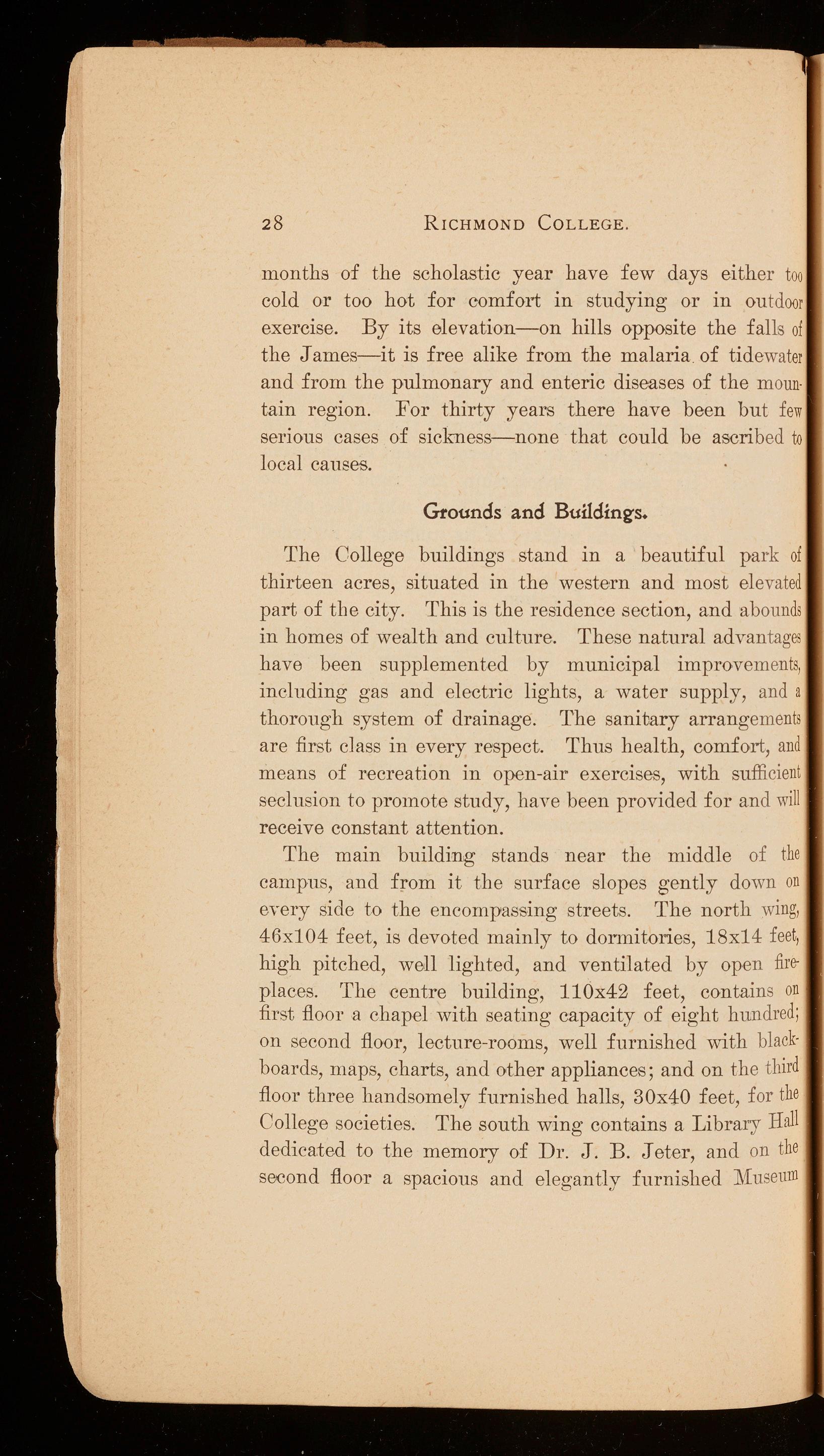
RICHMOND COLLEGE.
months of the scholastic year have few days either too cold or too hot for comfort in studying or in outdoor exercise. By its elevation-on hills opposite the fall s of the James-it is free alike from the malaria of tidew ater and from the pulmonary and enteric diseases of the mountain region. For thirty years there have been but few serwus cases of sickness-none that could be ascrib ed to local causes.
The College buildings stand in a beautiful par k of thirteen acres, situated in the western and most elevated part of the city. This is the residence section, and abounds in homes of wealth and culture. These natural advan tages have been supplemented by municipal improvem ents, including gas and electric lights, a water supply, and a thorough system of drainage. The sanitary arrangements are first class in every respect. Thus health, comfort, and means of recreation in open-air exercises, with sufficient seclusion to promote study, have been provided for and will receive constant attention.
The main building stands near the middle of the campus, and from it the surface slopes gently down on every side to the encompass ing streets. The north wing, 46x104 feet, is devoted mainly to dormitories, 18x14 feet, high pitched, weU lighted, and ventilated by open -fireplaces. The centre building, 110x42 feet, contain s on first floor a chapel with seating capacity of eight hun dred; on second floor, lecture-rooms, well furnished with black· boards, maps, charts, and other appliances; and on th e third floor three handsomely furnished halls, 30x40 feet, for the College societies. The south wing contains a Library Ball dedicated to the memory of Dr . J. B. Jeter, and on the second floor a spacious and elegantly furnished Museum

am d Ar t Gallery, a memorial to James Thomas, Jr. All these public halls are heated by steam.
Directly in the rear of the main building is a Dining Hall,with all needful appliances, and a Gymrutsium and Bath-Room under the same ronf. On one side of this, and in the same line, making a row parallel to Lombm:dy stree~, is a cottage for students, with rooms arranged in pairs, study and chamber, each 9x14; also two residences of professors . On the other side are three such residences. Thus t he students are brought all the time within the personal influence of at least five professors and their families, and the social, religious, and literary life of the Colleg e is very greatly promoted.
On N ovember 17, 1899, two new buildings were opened. These buildings are known as Science Hall and Memorial Hall. The former cost, with equipment, thirty thousand dollars ; the latter twenty thousand dollars. Both are built ofpressed brick, with granite trimmings.
Science Hall measures 120x51 feet, and is three stories above a basement. The well-lighted basement contains boilers for heating three buillilings with steam, and also shops and apparatus rooms. The twenty-seven rooms above the basement are all devoted to instruction in the natural sciences. On the first :floor are three laboratories for chemistry, a lecture hall, a library-room, a balanceroom, professor's office, and two supply rooms for chemicals and apparatus. The first year laboratory accommodates fifty students at one time. The second year laboratory has desk s for twenty-four. The lecture-room has terra~ed seatsarranged in semi-circles, with places for one hundred and twenty-five students.
The arrangements in the department of physics are
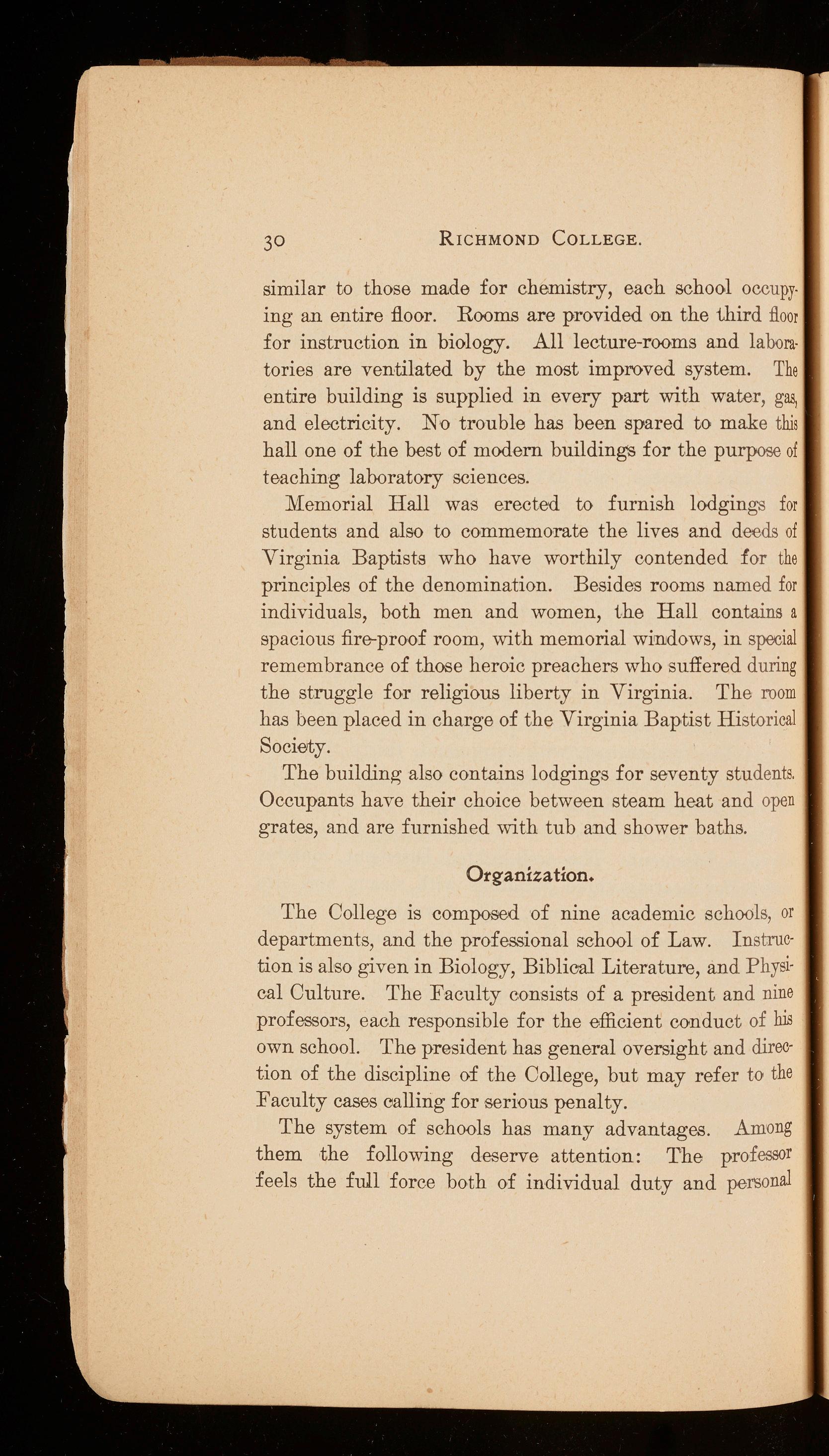
COLLEGE.
similar to those made for chemistry, each school occupying an entire floor. Rooms are provided on the third floor for instruction in biology. All lecture-rooms and laboratories are ventilated by the most improved system. The entire building is supplied in every part with wat.er, g3Bi and electricity. No trouble has been spared to make this hall one of the best of modern buildings for the purpose of teaching laboratory sciences.
Memorial Hall was erected to furnish lodgings for students and also to commemo,rate the lives and deeds of Virginia Baptists who have worthily contended for the principles of the denomination. Besides rooms named for individuals, both men and women, the Hall contains a spacious fire-proof room, with memorial wi'llldows,in special remembrance of those heroic preachers who suffered during the struggle for religious liberty in Virgi.nia. The room has been placed in charge of the Virginia Baptist Historical Society.
The building also contains lodgings for seventy students. Occupants have their choice between steam heat and open grates, and are furnished with tub and shower baths. Organization.
The College is composed of nine academic schools, or departments, and the professional school of Law. In struction is also given in Biology, Biblical Literature, and Physical Culture. The Faculty consists of a president and nine professors, each responsible for the efficient conduct of his own school. The president has general oversight and direc· tion of the discipline of the College, but may refer to the Faculty cases 0alling for serious penalty.
The system of schools has many advantages. Among them ·the following deserve attention: The professor feels the fu.J.1force both of individual duty and pernonal
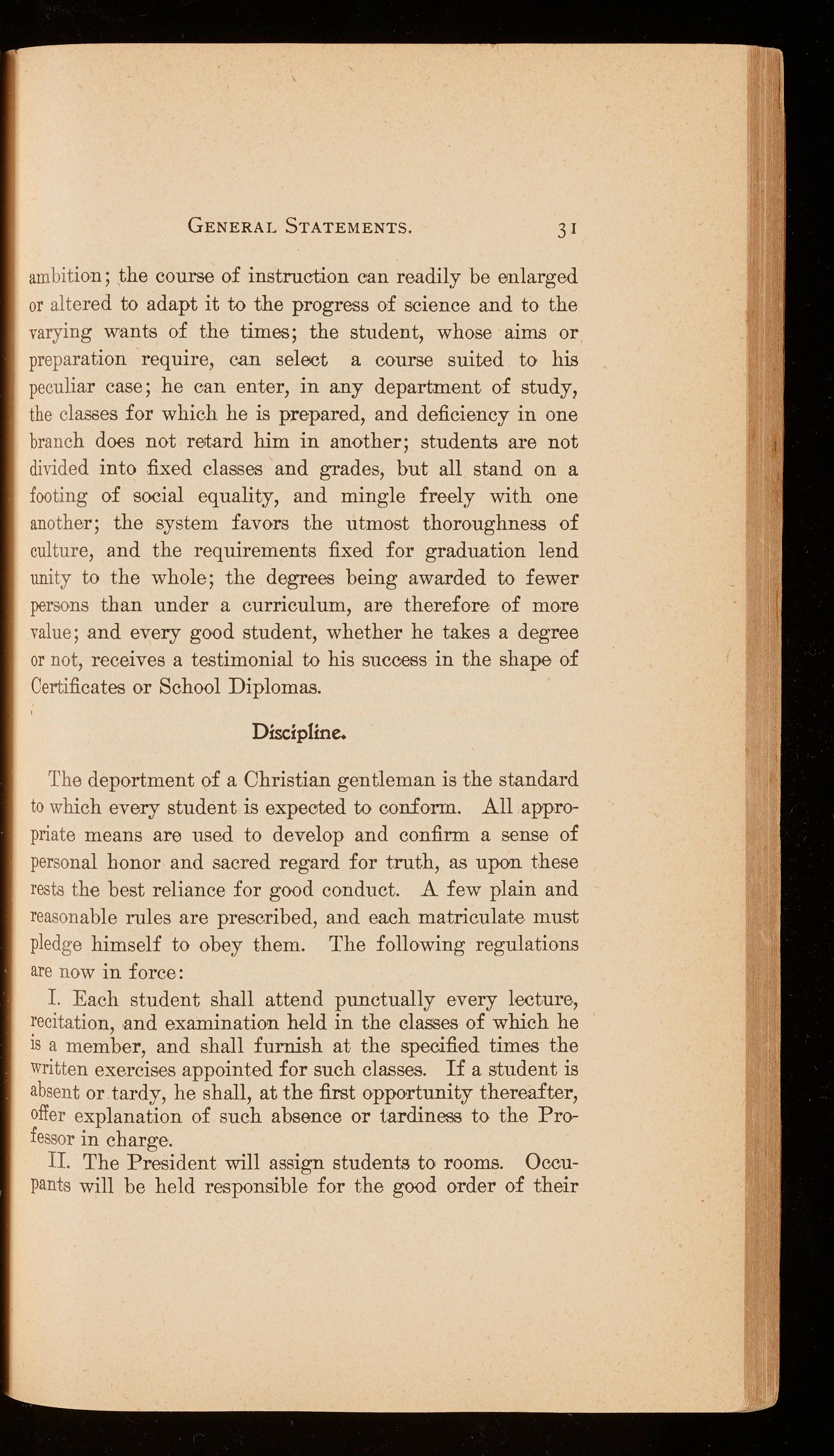
ambition; , the course of instruction can readily be enlarged or altered to adapt it to the progress of science and to the varying wants of the times; the student, whose aims or preparation require, can select a course suited to his peculiar case; he can enter, in any departrrnmt of study, the classes for which he is prepared, and deficiency in one branch does not retard him in another; students are not divided into fixed classes and grades, but all stand on a footing of social equality, and mingle freely with one another; the system favors the utmost thoroughness of culture , and the requirements fixed for graduation lend unity to the whole; the degrees being awarded to fewer persons than under a curriculum, are therefore of more value; and every good student, whether he takes a degree or not, receives a testimonial to his success in the shape of Certificates or School Diplomas.
The deportment of a Christian gentleman is the standard to which every student is expected to conform. All appropriate means are used to develop and confirm a sense of personal honor and sacred regard for truth, as upon these rests t he best reliance for good conduct. A few plain and reasonable rules are prescribed, and each matriculate must pledge himself to obey them. The following regulations are now in force:
I. E ach student shall attend punctually every lecture, recitation, and examination held in the classes of which he is a member, and shall furnish at the specified times the written exercises appointed for such classes. If a student is absent or tardy, he shall, at the first opportunity thereafter, offer explanation of such absence or mrdiness to the Pro,fessor in charge.
II. The President will assign students to rooms. Occupants will be held responsible for the good order of their
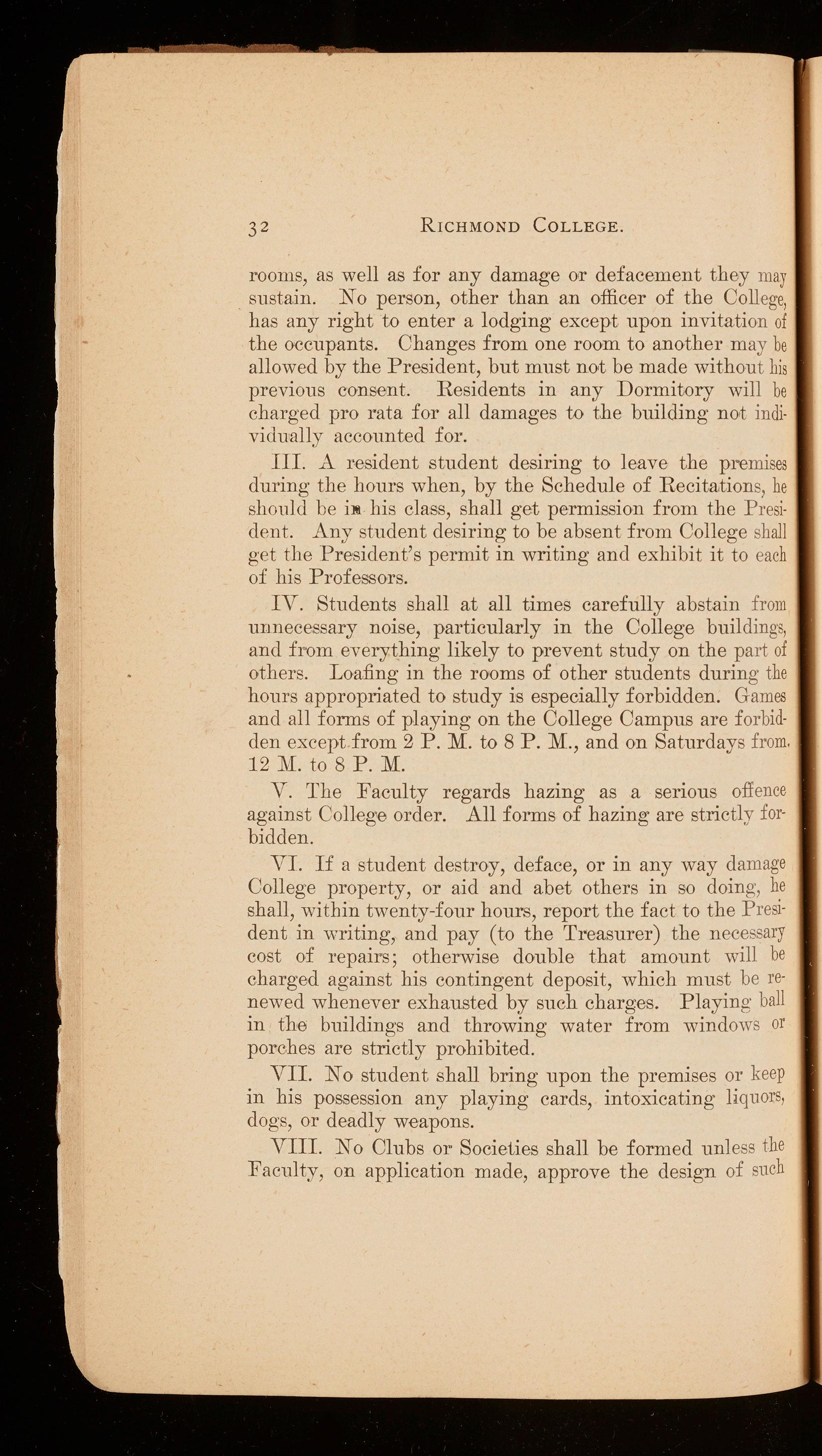
rooms, as well as for any damage o,r defacement they may . sustain. No person, other than an officer of the College, has any right to enter a lodging except upon invitati on of the occupants. Changes from one room to another may be allowed by the President, but must not be made withou t his previous consent. Residents in any Dormitory will be charged pro rata for all damages to the building not individually accounted for.
III. A resident student desiring to leave the pre mises during the hours when, by the Schedule of Recitation s, he should be i1t his class, shall get permission from the President. Any student desiring to be absent from College shall get the President's permit in writing and exhibit it to each of his Professors.
IV. Students shall at all times carefully abstain from unnecessary noise, particularly in the College build ings, and from everything likely to prevent study on the part of others. Loafing in the rooms of other students durin g the hours appropriated to study is especially forbidden. Games and all forms of playing on the College Campus are forbidden except from 2 P. M. to 8 P. M., and on Saturdays from. 12 M. to 8 P. M.
V. The Faculty regards hazing as a serious offence against College order. All forms of hazing are strictly for· bidden.
VI. If a student destroy, deface, or in any way damage College property, or aid and abet others in so doing, he shall, within twenty-four hours, report the fact to the Presi· dent in ,vriting, and pay (to the Treasurer) the nece ssary cost of repairs; otherwise double that amount will be charged against his contingent deposit, which must be renewed whenever exhausted by such charges. Playin g ball in the buildings and throwing water from windows or porches are strictly prohibited.
VII. No student shall bring upon the premises or keep in his possession any playing cards, intoxicating liquors, dogs, or deadly weapons.
VIII. No Clubs or Societies shall be formed unle ss the Faculty, on application made, approve the design of such
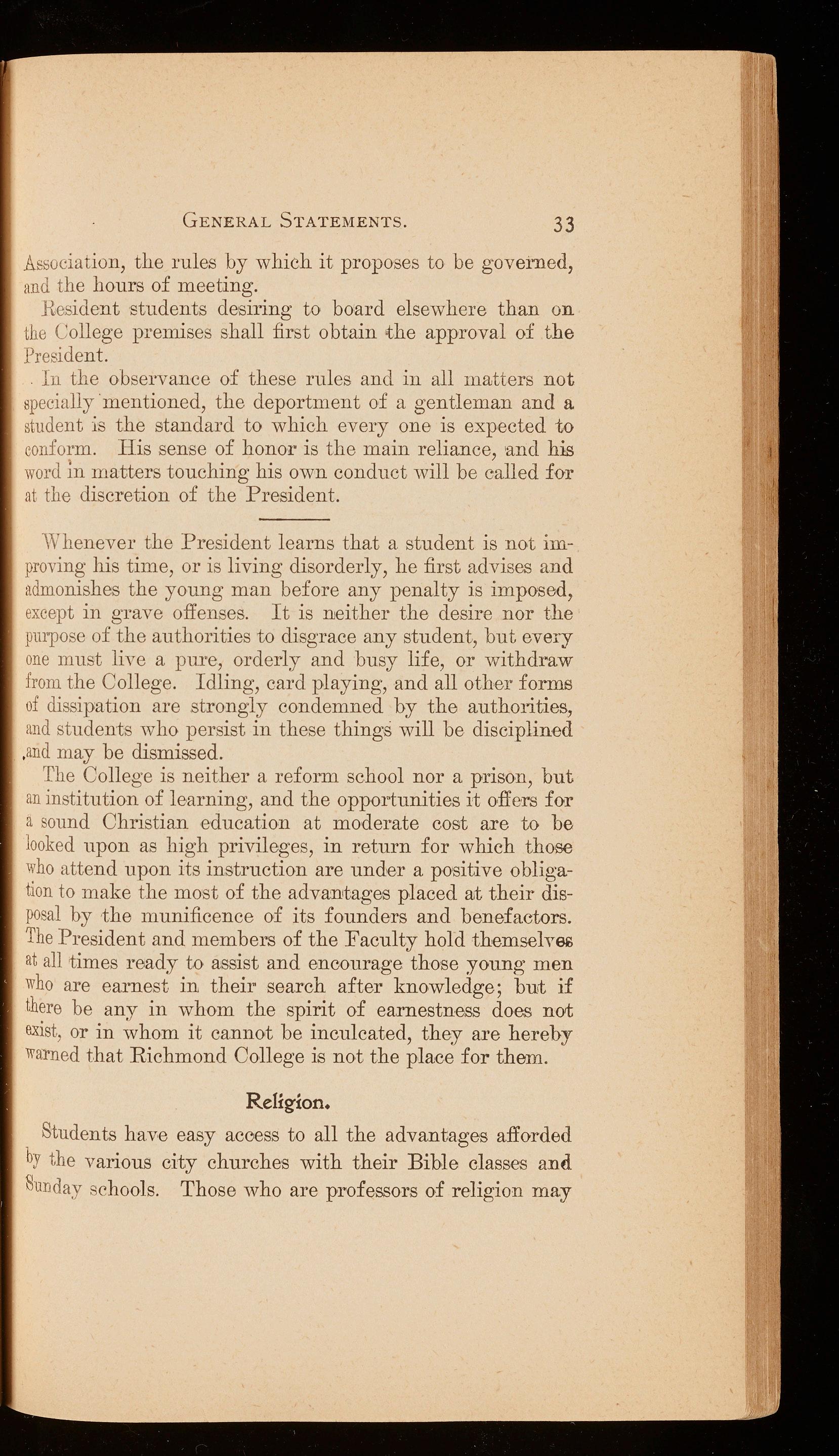
Association, the rules by which it proposes to be govetned, and the hours of meeting.
Resident students desiring to board elsewhere than on the (.;ollege premises shall first obtain et.heapproval of the President.
In the observance of these rules and in all matters not specially mentioned, the deportment of a gentleman and a student is the standard to which every one is expected to conform. His sense of honor is the main reliance, and his wordin matters touching his own conduct will be called for at the discretion of the President.
Wh enever the President learns that a student is not improving his time, or is living disorderly, he first advises and admonishes the young man before any penalty is imposed, excep t in grave offenses. It is rueither the desire nor the purpose of the authorities to disgrace any student, but every one must live a pme, orderly and busy life, or withdraw fromthe College. Idling, card playing, and all other forms of dissipation are strongly condemned by the authorities, andstudents who persist in these things will be disciplined ,and may be dismissed.
The College is neither a reform school nor a prison, but an institution of learning, and the opportunities it offers for a sound Christian education at moderate cost are to be looked upon as high privileges, in return for which those who attend upon its instruction are under a positive obligationto make the most of the advm:utagesplaced at their disposal by the munificence of its founders and benefactors. ThePresident and members of the Faculty hold themselYes at all times ready to assist and encourage those young men who are earnest in their search after knowledge; but if there be any in whom the spirit of earnestness does not exist, or in whom it cannot be inculcated, they are hereby wa:rned that Richmond College is not the place for them.
Students hav ,e easy access to all the advantages afforded by th e various city churches with their Bible classes and Sunday schools. Those who are professors of religion may
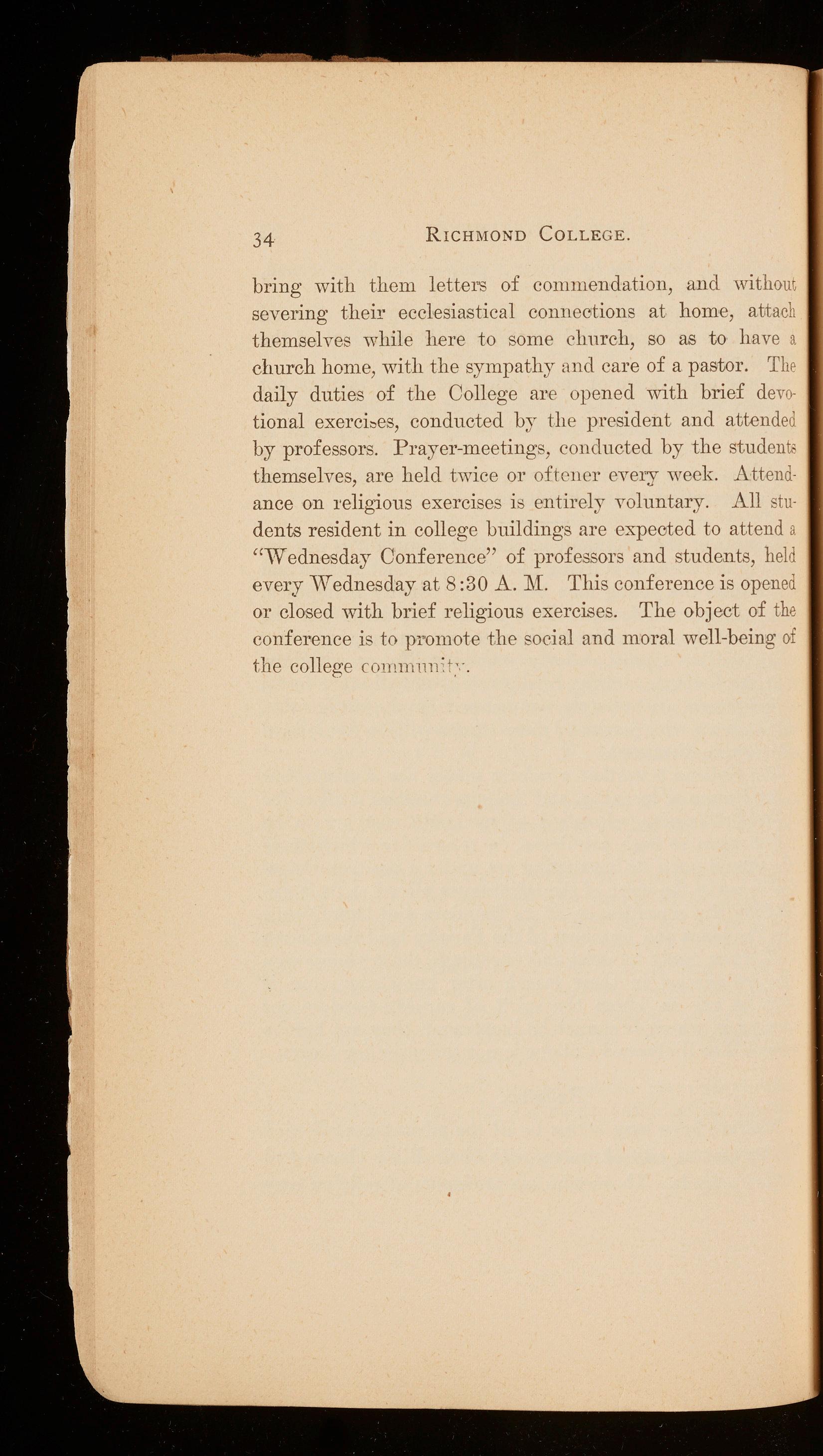
RICHMOND COLLEGE.
bring with them letters of commendation, and without severing their ecclesiastical com1ec:,tions at home, attach themselve s while here to some clmrch, so as to have a church home, with the sympathy and care of a pastor. The daily duties of the College are opened with brief devotional exerci,,es, conducted by the president and attended by professors. Prayer-meetings, conducted by the studentc themselves, are held twice or oftener every week. Attendance on religious exercises is entirely voluntary . All stu· dents resident in college buildings are expeoted to attend a "Wednesday Conference" of professors and stude.nts, held every Wednesday at 8 :30 A. JI.I. This conference is opened or closed with brief religious exercises. The object of the conference is to promote the social and moral well-being of the college rnrnrn 1111:+: ·

I. Sch ool of Latin Lan g uage and Literature.
Professor Mitchell.
Assistant,
The course of stu dy, embracing four yem·s, is indicated by the text-books u sed in the several classes. Students entering the school will be classed accord ing to their preparation. For t h e l owest class the1,e is required such acquaintance with the elemenrt:sof Latin grmnmar as will enableone to beg i n to translate with profit.
The SuB-J UNIOR and JUNIOR Cl asses are pers istently drilledin the forms and the syntax of the language, wit h dueattention to qu anti ty The INTERMEDIATEr"'ld SENIOR Classescontinue to g ive needful attention to g r ammatica l principles,wh ile t h ey ar e required to attain a g ood vocab ulary and to imbibe the spirit of Latin literat ur e by an extensivecour se of reading, somewhat varied from yem· t o year. In all t h e classes the student's progress is tested, and his powers of analysis and composition al'e cultivated bywritten exercises in rendering English into Latin and Latin into English. The disciplinary power and cultma l ralue of the study of Latin ar e equally emphasized.
TEXT-BOOKS.
ifob-Junior. - Nepos (Lindsay's or Rolfe 's edition); Cresar's Gallic War (Kelsey's edition); Allen and Greenough's Shorte r Latin Grammar.
Junior.-Sallust's Jugurtha or Catilina; Cicero's Orations an d Letters (Kelsey's edition); Vergil ' s JEneid (Ginn's edition ); C:esar's Civil War (Montgomery ' s edition) ; Gilde r sleeve's Lati11 Grammar (last edition). -
Intermediate. - Livy; Horace; Ci c ero de Senectute et de Am ieitia; The Agricola or Germania of Tacitus ; Plautus' Captiv i;

RICHMOND COLLEGE.
Gildersleeve's Grammar (last edition); assigned portions or Cicero's works for private reading. The leading Metres in Latin will be carefully studied. MacKail's Latin Literature Exercis e1 in Latin Prose Composition.
Senior.-The Satires of Juvenal; Cicero de Oratore (Owen's edition); The Annals and Histories of Tacitus, Quintilian, Ter• ence, Cicero de Nature Deorum. Assigned works for private reading. Original exercises in Latin Prose Composition.
For Reference: Harper's Latin Lexicon; Smith's English-Latin Dictionary; Ginn's Classical Atlas; Gayley's Classic Myths.
Professor Harris.
The aim of the school is threefold: (1) to enable the student, by the mastery of idiom, vocabulary and syntax, to read Greek with accuracy and readiness; (2) to givea clear insight into the life, genius and achievement s of the Greeks; (3) to cultivate habits of accurate expression and a sense for Greek literary standards.
The Elementary Courses and the course in Advanced Composition are given each year. Other advanced course, are given once in two years, being a1Tanged in alternating or rotating groups of two courses each, one of which is given each year.
The work as thus laid out aims to meet the needs of four classes of students: (1) those studying Greek for the sake of mental discipline and general culture; (2) those wishing to lay the foundation of a thorough knowledge of Biblical Greek; (3) those desiring to make Greek acces· sory to other ancient or modern languages or to the science of linguistics; (4) those aiming at future specializa· tion in Greek or in Greek and La tin.
No choice or election is allowed the student in the Sub-Junior ,and Junior Classes. For either the Intermediate or Senior year in Greek, any combination of advanced courses equivalent to four hours per week
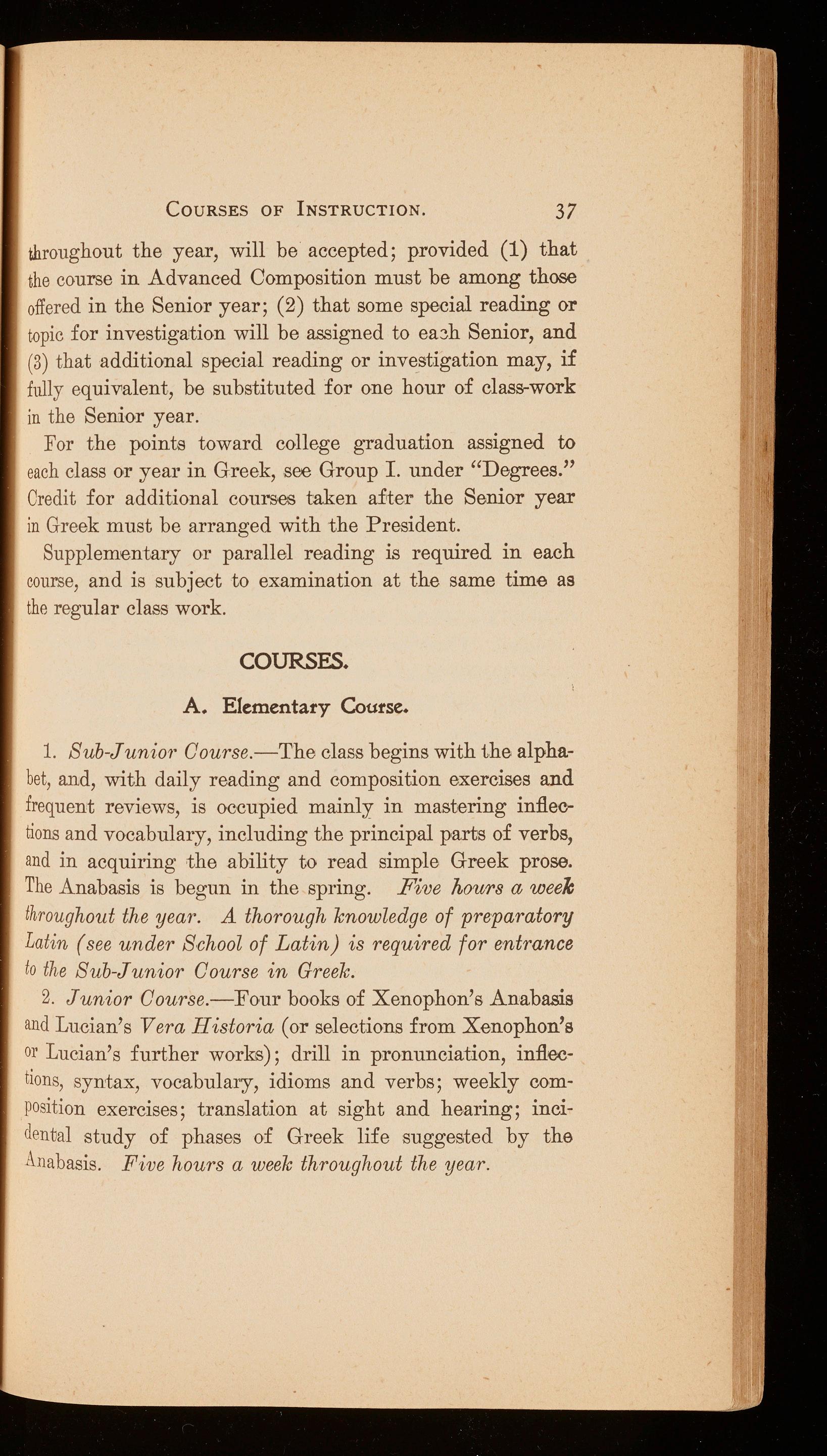
COURSES OF INSTRUCTION.
37 throughout the year, will be accepted; provided (1) that the course in Advanced Composition must be among those offered in the Senior year; (2) that some special reading or t-0pic for investiga t ion will be assigned to ea ~h Senior, and (3) th at additional special reading or investigation may, if fully equiV'alent, be substituted for one hour of class-work in t he Senior year.
For the points toward college gTaduation assigned to each class or year in Greek, see Group I. under "Degrees." Credit for additional courses taken afrter the Senior year in Gr eek must be arranged with the President.
Supplementary or parallel reading is required in each course, and i s subject to examination at the same time as the r egular class work.
1. Sub-Junior Course.-The class begins with the alphabet, and, with daily reading and composition exercises and frequent reviews, is occupied mainly in mast ,ering infl.ec-tionsand vocabulary, including the principal parts of verbs, and in acquiring the ability to read simple Greek prose. TheA nabasis is begun in the spring. Fiv e hours a week throughout the year. A thorough knowledge of preparatory Latin { see under S.Choolof Latin) is required for entrance to the Sub-Junior Course in Greek.
2 Junior Course.-Four books of Xenophon's Anabasis andLucian's Vera Historia (or selections from Xenophon's or Lucian's further works); drill in pronunciation, inflections, syntax, vocabulary, idioms and verbs; weekly compositi on exerci ses; translation at sight and hearing; incidental study of phases of Greek life suggested by the 1 Anabasis. Five hours a week throughout the year.
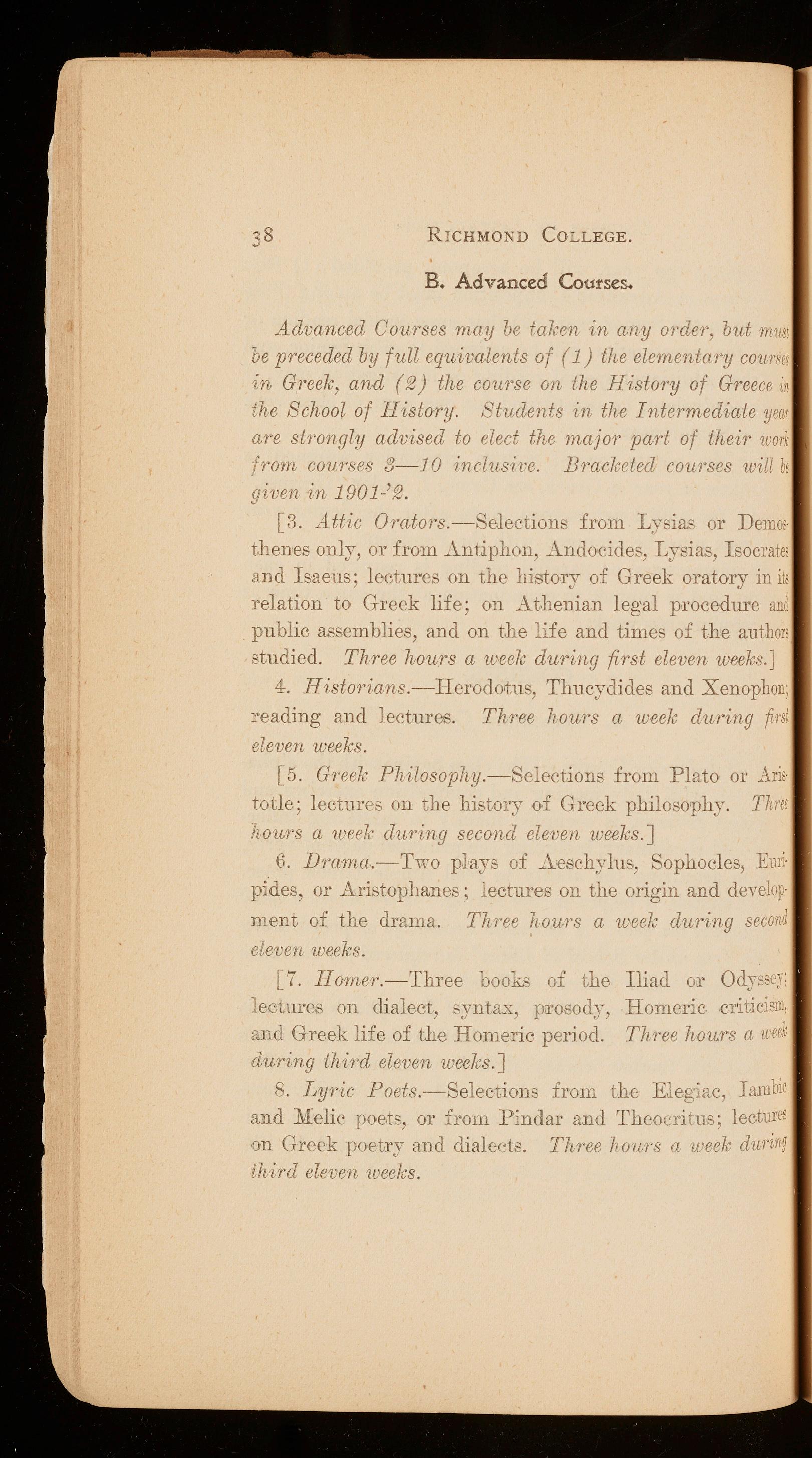
RIC HM OND C OLL E GE.
B. Advanced Courses.
Advanced Courses may be taken in a.11yorder, bid 111111 1 be preceded by full equivalents of ( 1) the elementary courses in G1·eek, and ( 92) the course on the History of Greece in the School of History Students in the Intermediate year are strongly advised to elect the major part of their work from cow·ses 3-10 inclvsire BmclcPiecl courses will bi given in 1901-'92.
[ 3. A ti ic Omtors.-Se1ections from Lysias or Demo; t.henes only, or from Antiphon, .A.ndocides,Lysias, Isocrate; and Isaeus; leetures on the history of Greek oratory in iil relation to Greek life; on Athenian legal procedure and public assemblies, and on the life and times of the authors studied. Three hours a week during first eleven weeks.]
4. IIisto1·ians.-Herodotus, Thucydides and Xenophon; reading and lecture£: Three lzourn ci iveek diiring fir1 1 eleven weeks.
[5. Greek Philosophy.-Selections from Plato or ATit· rotle; lectures on the history of Greek philosophy . Threi hours a weel,· diiring second eleven weelcs.]
6. Drama.-T,Yo plays of Ae chylus, Sophocles, Emi pides, or Aristophanes ; lectures on the origin and develop· ment of the drama. Tlz1'ee hou1's a iveek during second eleven weeks.
[7. llomer. - Three books of the Iliad or Odysser lectures on dialect, :::ynta.x, p:rosody, Homeric criticism. and Greek life of the Homeric period. Three hoiirs a iceek d11.ring third eleven weeks.]
8. Ly1·ic Poets -Selections from the Elegiac, Iambic and Melic poet 0 , or from Pindar and Theocritus; lectures on Greek poetry and dialectc. Three houl's a week duri.lig third eleven weeks.

9. Adi 1ancecl Gi·eel.: Oompos ,ition.-The exercises as;igned yary from year to year, so that the course may be iaken <luring two yearn, if desired. One exercise a week tht-oughoid the year, counting as one hour.
JO. New Testament G1·eek.-Reading; lectures on dialect an d on principles of criticism, interpretation and translation . One how· a week throughout the year.
[ 11. Tlie Seplitaginl.-Reading; lectures on the Sep-;uagint .-ersion and on the relations of Hebraistic Greek to ·hecommon dialect and to tlie language of the New Testament. One l1ow· a week throi1ghout the year.]
12. Ifistory of Greek Lileralure.-Lectures on the ·development and phases of Greek literature and its r elations to Greek history and life; supplementary reading as assigned. One hour a week throughout the year. · [13 Old Gree!,;Life.-Lectures on the private, politiGal and relig ious institutions of the ancient Greeks. One hour a week throughout the year.]
14. Comparative Grammar of Greek and Latin. - Lecnues on the sounds and inflections of Greek and Latin, as compared with other Indo-European languages and English. Thi s course requires a knowledge of Greek, Latin, either French or G errnan, and preferably of Old English. [lf:1. Linguistics (or Comparative Philology).-Lectures on the 12rinciples and history of the science of lan~uage,and on the nature of linguistic organism and change. This cour se requir es a knowledge of Greek, Latin, either French or German, and pr eferably of Old English. One ho1:,1·n wed: thrniighoid the yea1·.]
TEXT-HOOKS.
1. Si::u-JuKIOR Coi::nsE.-Class.-Forman's First Greek Book,; Colson's First Greek Reader; Harper and Wa11ace 's Xenophon's A,1<1bas i s; Goodwin's or Hadley-Allen's Greek Urnmmar.

RICHMOND COLLEGE.
Parallel ..-Mahaffy's Old Greek Life; Murray's Manual o f Mythol-Ogy (classical portion).
2. JUNIOR CouRsE.-Class.-Anabasis and Grammar as under 1; Pearson's (h-eek Prose Composition; Williams ' seiections from Lucian.
Parallel.-Becker's Charicles (with Excursuses); Gow's Companion to School Classics (pp. 78-146); Butcher and Lang's Od11mv of Homer.
[3. Attic Orators.-Class.-Tyler's Olynthiacs and Philippics o1 Demosthenes.
Parallel.-Jebb's Attic Orators; Mahaffy's Social l./4fe vn Greece; (portions of) Grote's or Curtius' History of Greece.]
4. HISTORIANS.-Class.-Frost's Sicilian Empedition.
Parallel.-(Portions of) Grote's or Curtius' History of G1eece.
[5. GREEK PHILOSOPHY.-Class.-Purves' Selectfons frnm Plato
Parallel.-Zeller's History of Greelc Plvilosophy; Mahaffy's Ok1 Greek Education; Xenophon's MemorabiUa (in English).]
6. Drama.-Class.-Humphrey's Aristophanes' Clouds; Merry's Knights of Aristophanes.
Parallel.-Haigh's Attic Theatre; Moulton's Ancient Classical Dmma; Jebb's Classic Greelc Poetry.
[7. HOMER.-Class.-Clapp's Homer's Iliad, Bks. XIX-XXI V.
Parallel.-Lang, Leaf, and Myer's Iiiad of Homer; Gladston e's Homer; Jebb'.s Homer.]
8. LYRIC PoETs.-Class.-Seymour's Selected Odes of Pinda r.
Parallel.-Symond's Greek Poets.
10. NEW TESTAMENTGREEK.-Class.-Westcott and Hort's (}ree,k New Testament (with Rickie's Lemicon); McClymont's New Testa· moot and its Writers.
Reference.-Thayer's Greek-English Lemicon of the New Testament [11. THE SEPTUAGINT.-Class.-Swete's text, or Bagster' s Sep· tuagint Greek and EngUsh. ]
12. GREEK LITERATURE.-Class.-Jebb's G1·eekLiterat1tre. Parallel.-J evon's Greek J;iteratiire; Mahaffy's (h·eek Lit erature [13. OLD GREEK LIFE-Paralle.l.-Bliimner's Home Life of tke A1wient Greeks; Guhl & Koner's Life of the Greeks and Romans ; Becker's Charicles; Mahaffy's Old Greek Life and Social Lif e i• Grnece.
Reference.-Schreiber's Atlas of Classical Antiquities; Seyfl'ert's Di.ctionary of Classical Antiqitities.]
14. COMPARATIVE GRAM1L~R OF GREEK AND :CATIN.-ClassKing and Cookson'.s Comparative G1·ammar of Greek and Lat i n
Parallel.-King and Cookson's Sounds and Inflections in (}reek at1d Latin; Henry's Sllort Comparative Grammar of Greek and Latin,
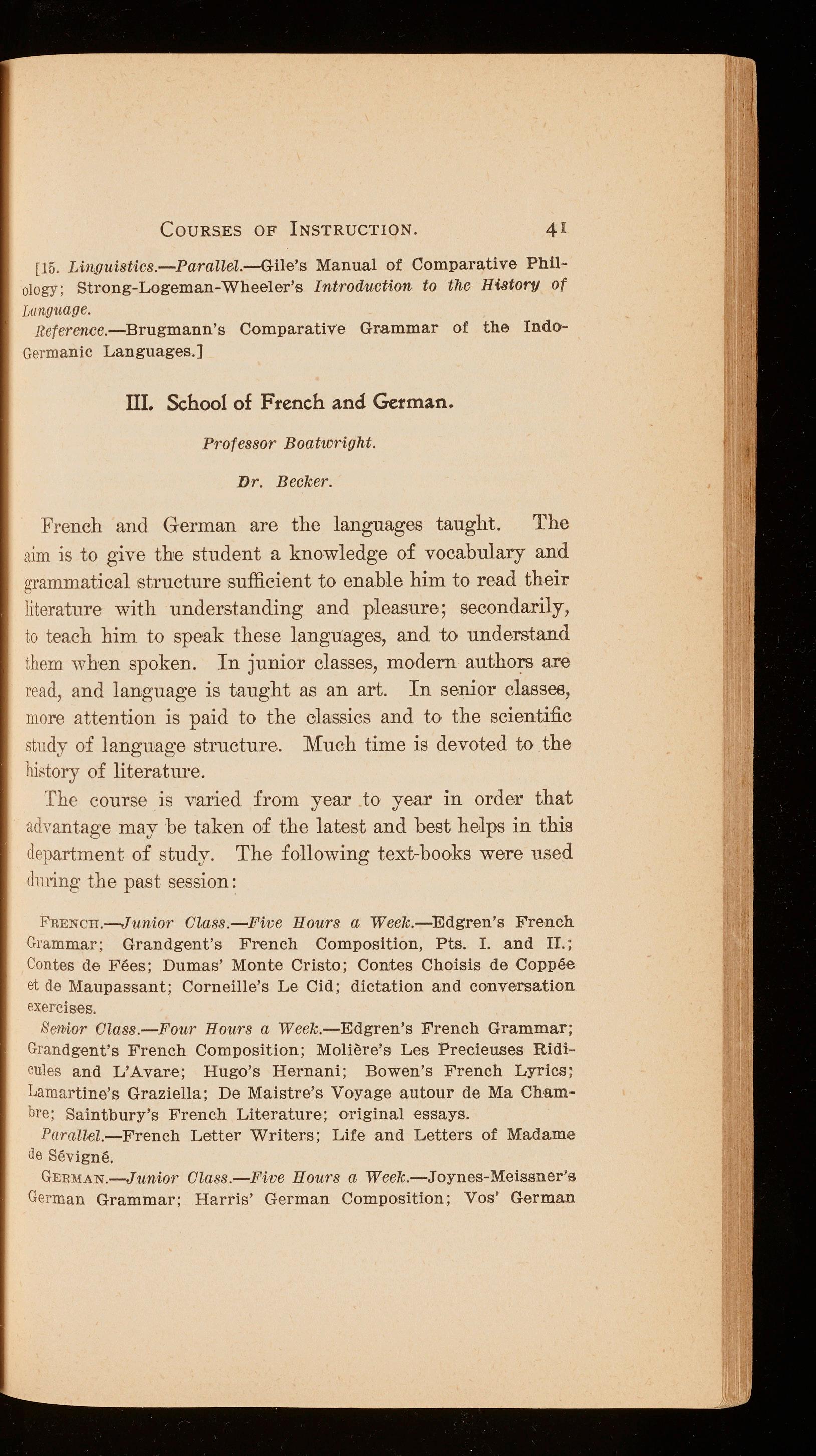
[15. Lin171tisti cs.-Parall,e.l.-Gile's Manual of Comparative Philology; Strong-Logeman-Whee ler 's Introduction to the History of Language.
Reference.-Brugmann's Comparative Grammar of the IndoGermanic Languages.]
Professor Boatwright
Dr. Becker.
Frenc h and German are the languages taught. The aim is to give the student a knowledge of vocabulary and grammatical structure sufficient to enable him to read their literatur e with under standing and pleasure; secondarily, to teach him to speak these languages, and to understand them when spoken. In junior classes, modern authors are read, and language is taught as an art. In senior classes, more atte ntion is paid to the classics and to the scientific stndy of language structure. Much time is devoted to the history of literatur e
The course i s varied from year to year in order that adYantagemay be taken of the latest and best h elps in this department of stud y . The following text-books were used dming the past session :
FRENCH.-Junior OZ.ass-Fi v e Hours a Weelc.-Edgren's French Grammar ; Grandgent's French Composition, Pts. I. and II. ; Contes de Fees; Dumas' Monte CrLsto; Contes Choisis de Coppee et de Maupassant; Corneille's Le Cid; dictation and conversation exercises.
Se1»io1 · Olass.-Four Hours a Week.-Edgren's French Grammar; Grandgent ' s French Composition; Moliere's Les PrecieUBes Ridicules and L'Avare; Hugo's Hernani ; Bowen's French Lyrics; Lamartine's Graziella; De Maistre's Voyage autour de Ma Chrunbre; Sa intbury's French Literature; original essays Para llel.-French Letter Writers; Life and Letters of Madame de Sevigne.
GERMAN.-Jttnior Olass.-Fi ve Hours a Weelc.-Joynes-Meissner'a German Grammar; Harris' German Composition; Vos' German
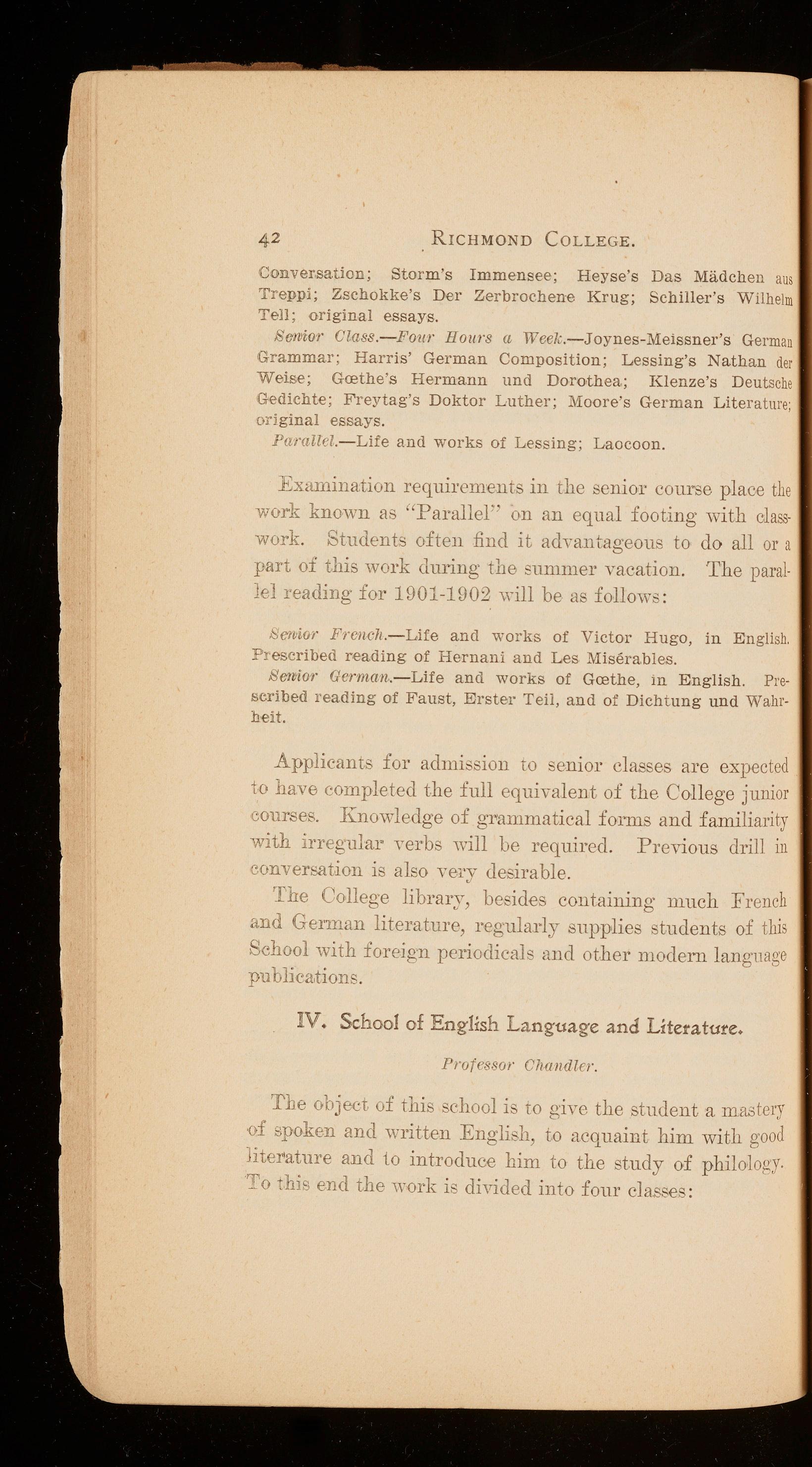
Conversation; Storm's Immensee; Heyse's Das Ma d chen aus Treppi; Zschokke's Der Zerbrochene Krug; Schiller's Wilhelm Tell; original essays .
Scrvior Class.- Four Hours a Week.- Joynes -Meiss n er 's German Grammar; Harris' German Composition; Lessing's Na t han der Weise; Grethe's Hermann und Dorothea; Klenze's Deutsche Gedichte; Freytag's Doktor Luther; Moore's German Li t erature; original essays
Parallel. - Life and works of Lessing; Laocoon
Examination requirements in the senior course place the work known as "Parallel'' on an equal footing with classwork. Students often :find it advantageous to do all or a part of this work dm:ing the rnmmer Yacation. T h e paral]e] reading for 1901 -1902 ·will be as follows :
l::ierPiOl Frcuch. - Life and works of Victor Hugo, i n English. Prescribed reading of Hernani and Les Miserables.
Scwior German..- Life and works of Grethe, in E n gli s h Prescribed reading of Faust, Erster Tei!, and of Dichtun g und Wahrheit.
Applicants for admission to senior cl asses are expected io have completed the full equivalent of the Coll ege junior courses . Knowledge of g1•ammatical forms and familiarity with irregular Yerbs will be required. Previo u s drill in conversat ion is also Ye,·y desirable . The College library, besides containing much French and German literature, regularly supplies students of this School with foreign periodicals and other modern langnage pu b1ica,tions.
terature.
Professor Cha 11dlfl'.
The object 0£ this school is to give the student a mastery 0£ spoken and written English, to acquaint him wi th good Jiterature and i.o introduce him to the study 0£ ph ilolop.y. To this end the work is divided into four classes:
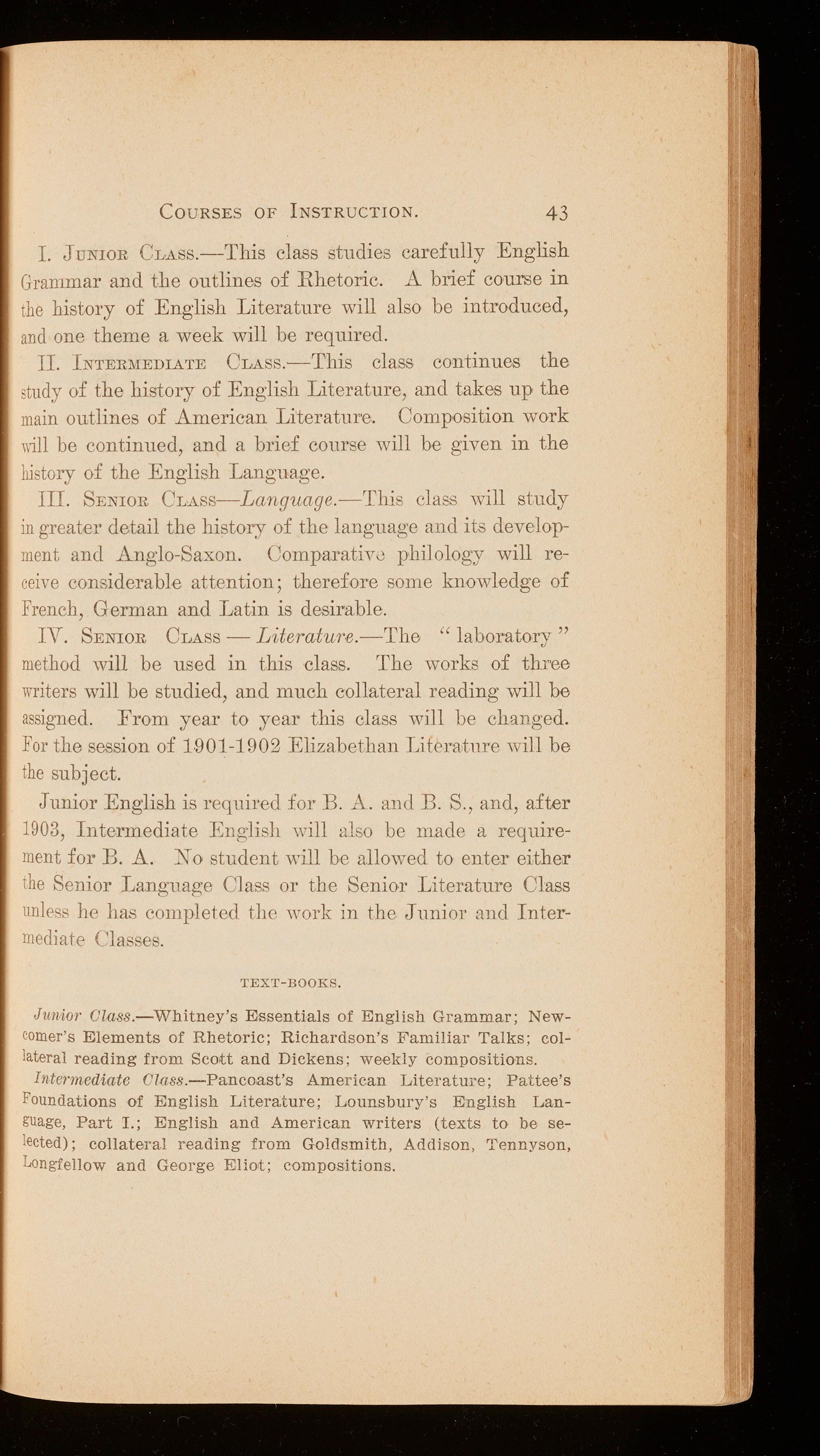
I. JUNIORCLASs-This class studies carefully English Grammar and the outlines of Rhetoric. A brief course in the history of English Literature will also be introduced, and one theme a week will be required
II. INTERMEDIATECLASs.-This class continues the studyof the history of English Literature, and takes up the main outlines of American Literature. Composition work will be continued, and a brief course will be given in the history of the English Language.
III. SENIORCu ..ss-Language.-This class will study in greater detail the history of the language and its development and Anglo-Saxon. ComparativJ philology will receive considerable attention; therefore some knowledge of French, German and Latin is desirable.
IV. SENIOR CLASS - Literatur-e.-The " laboratory " method will be used in this class. The works of three writers will be studied, and much collateral reading will be assigned. From yeaT to year this class will be changed. Forthe session of 1901-1902 Elizabethan Literatnre will be the subject.
Junior English is required for B. A. and B. S., and, after 1903, Intermediate English will also be made a requirement for B. A. No student will be allowed to enter either the Senior Language Class or the Senior Literature Class unless he has completed the work in the Junior and Intermediate Classes.
Junior Olass.-Whitney's Essentials of English Grammar; Newcomer's Elements of Rhetoric; Richardson's Familiar Talks; collateral reading from Scott and Dickens; weekly compositions. Intermediate 0/nss. - Pancoast's American Literature; Pattee's Foundations of English Literature; Lounsbury's English Language, Part 1.; English and American writers (texts to be selected); collateral reading from Goldsmith, Addison, Tennyson, Longfellow and George Eliot; compos.itions.
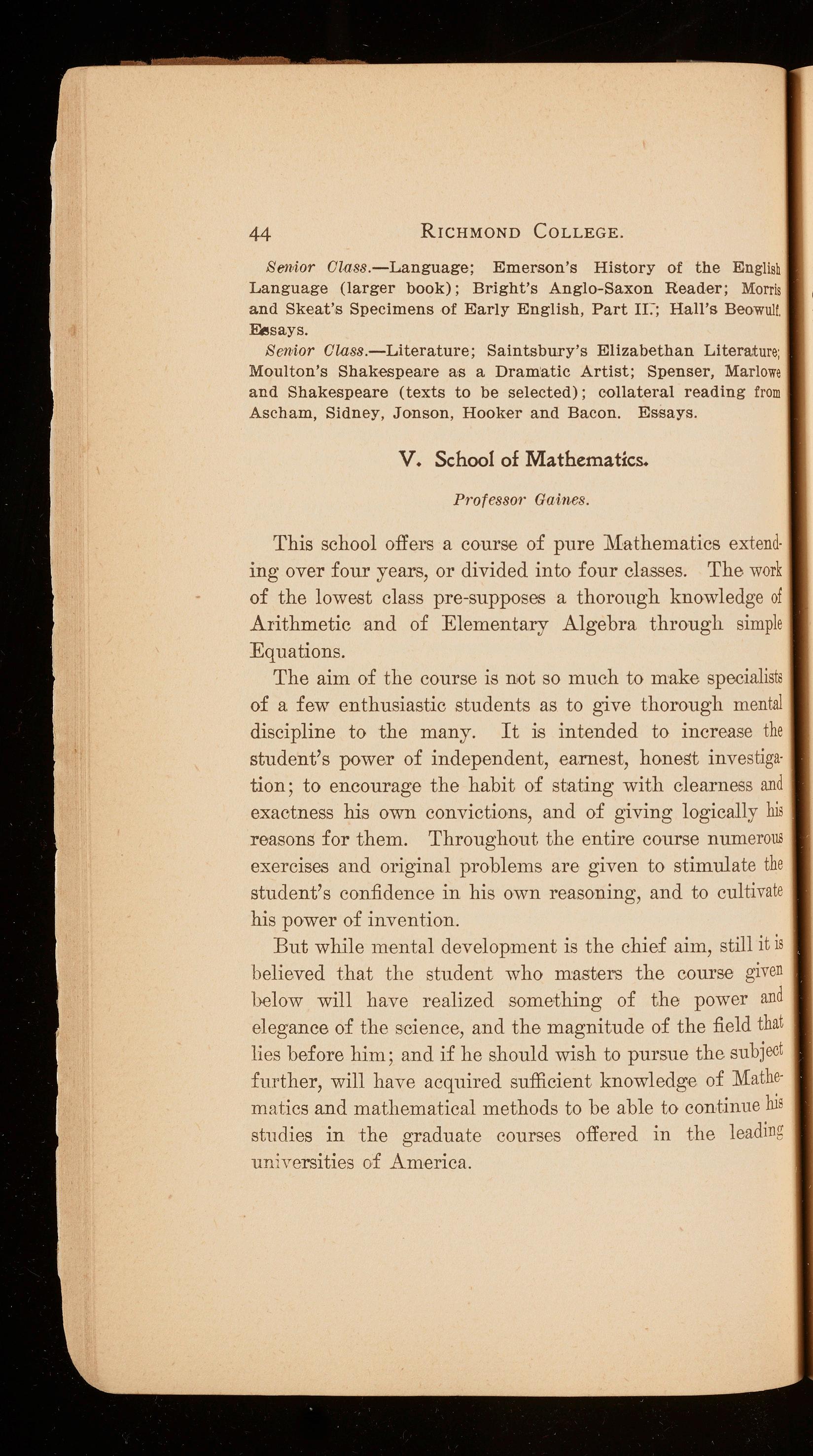
Sen,ior Olass.-Language; Emerson's History of the English Language (larger book); Bright's Anglo-Saxon Reader; Morris and Skeat's Specimens of Early English, Part ir.·; Hall's Beowulf. Fesays.
Sen,ior OZass.-Literature; Saintsbury's Elizabethan Literature; Moulton's Shakespea,re as a Dram •atic Artist; Spenser, Marlowe and Shakespeare (texts to be selected); collateral reading from Ascham, Sidney, Jonson, Hooker and Bacon. Essays.
Professor Ga-ines.
This school o:ffers a course of pure Mathematics extending over four years, or divided into four classes. The work of the lowest class pre-supposes a thorough knowledge of Arithmetic and of Elementary Algebra through simple Equations.
The aim of the course is not so much to make specialists of a few enthusiastic students as to give thorough mental discipline to the many. It is intended to increase the student's power of independent, earuest, honest investiga· tion; to encourage the habit of stating with clearness and exactness his own convictions, and of giving logically his reasons for them. Throughout the entire course numerous exercises and original problems are given to stimulate the student's confidence in his own reasoning, and to cultivate his power of invention.
But while mental development is the chief aim, still it is believed that the student who masters the course given below will have realized something of the power and elegance of the science, and the magnitude of the field that lies before him; and if he should wish to pursue the subjeet further, will have acquired sufficient knowledge of :Mathe· matics and mathematical methods to be able to continue his studies in the graduate courses offered in the leading universities of America.

COURSES OF INSTRUCTION. 45
Sub-J unior.-Algebra through Quad r atic Equ a tions and Plane Geometry (five times a week). T ext-Books; Hall and K ni ght ' s Element ar y Algebra ; Chauvenet's Geometry.
Jimior.-Algebra , b eginning with Quadratic Equations; Solid Geometry ; Plan e Trigonometry (five times a week). Tex t-B ooks: C. Smith's Alg ebra; Chauvenet's Geometry; Wentworth ' s T r igonometry.
l11tennediat e.-l ~·ir st Half Year.-Conic Sections including t h e method of trilin ear co-ordinat es (thre e times a week). Second Half Year.-Elementar y cours e in the Differential and Integ r al Calculus (t w ice a we ek), and in th e Theory of Equation (on ce a week). Tex t-Book s : C. Smith's Conic Sections ; Byerly's Calcu lus Senio1·.-P.ir st Half Yea r.-Advan ced course in the Different ia l and Integr al Calculus (three times a w e ek). Second Half Year.Lecture courses on sp ecial topics va ri ed from year to year (thr ee times a we ek) On e, or at mo s t t wo, of the following cour ses willbe give n ea ch y ear. (1) An el ementary course in Differential Equatio n . (2) The theory of Infinite Series and Products. ( 3) The theory of complex quantities with a brief introduction to the Theory of Fun ction s. (4) The theory of Invariants and Covariants, with applications to geometry . (5) Modern methods in geometr y. As parallel work the students are required to read a shor t history of mathematics in order that they may know something of the development of the science and of the mathematicians who have principally contributed to this development. The s ubject of Land Surveying is t a ught in an additional class, open t o students who have finished the Junior class Much of the time devoted to thi s class is spent in the field , thus giving the student familiarity with the instruments used and considerable practice in doing th e field work ' Peret-Book s : Gillespie's Land Surveying.
Professor Winston
The School of Physics embraces the several subje cts usually grouped under this title, or under the practicall yequivalent name-Natural Philosophy. These include t he General Properties of Matter; Mechanics proper, or the cardinal doctrines of Fo-rce, Equilibrium, Motion, and Ener gy , in their various kinds, their relations to the several states of matter, and their pra ctical applications; the
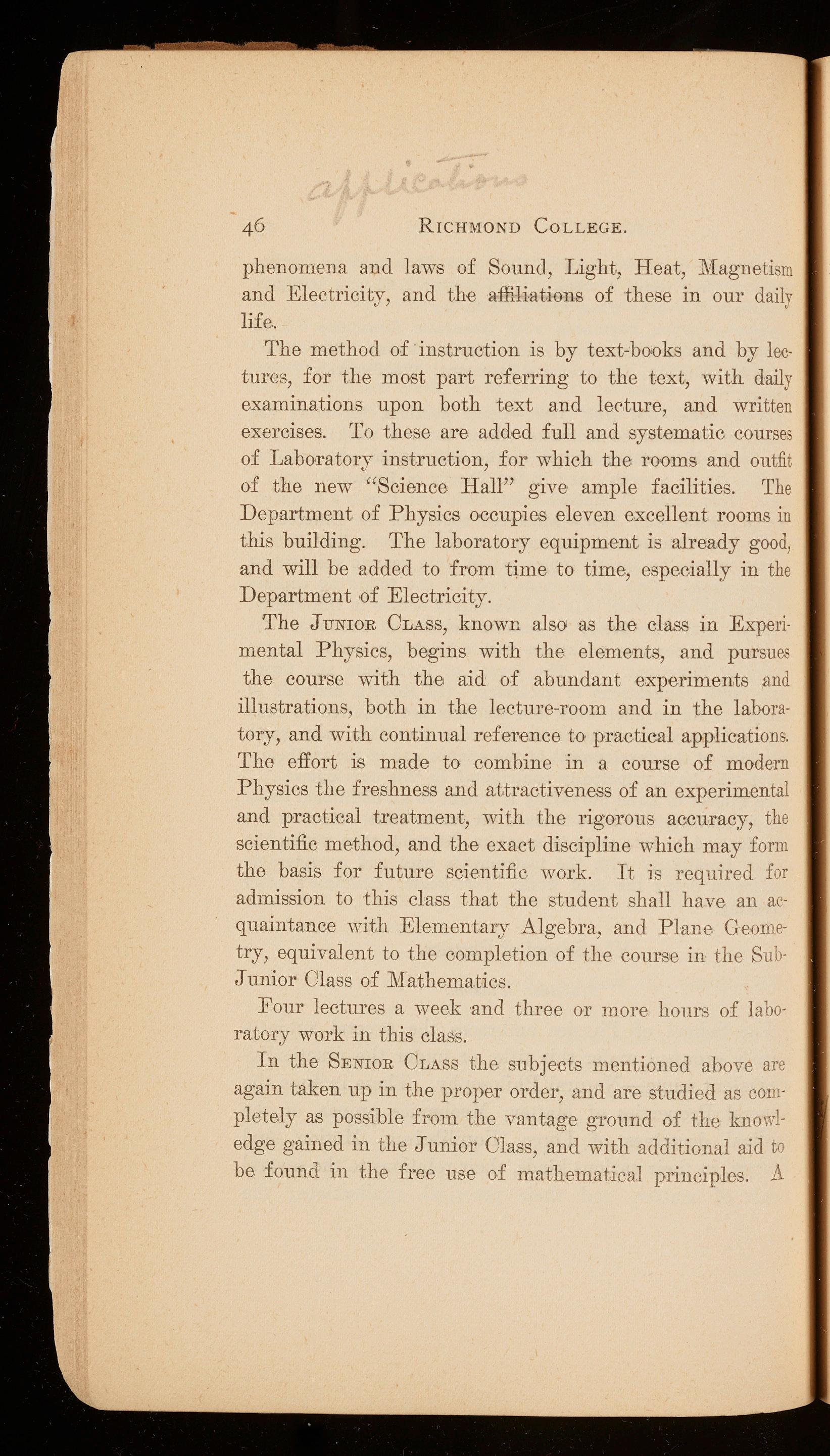
RICHMOND CoLLEGE.
phenomena and laws of Sound, Light, Heat, Magnetism and Electricity, and the affiliations of these in our daily life.
The method of instruction is by text-books and by lectures, for the most part referring to the text, with daily examinations upon both text and le<>tme, and written exercises. To these are added full and systematic courses of Laboratory instruction, for which the rooms and outfit of the new "Science Hall" give ample facilities. The Department of Physics occupies eleven excellent rooms in this building. The laboratory equipment is already good, and will be added to from time to time, especially in the Department ,of Electricity.
The JUNIORCLASS, know:c. also as the class in Experimental Physics, begins with the elements, and pursues the course with the aid of abundant experiments and illustrations, both in the lecture-room and in the laboratory, and with continual reference to practical applications. The e:ffort is made to combine in a course of modern Physics the freshness and attractiveness of an experimental and practical treatment, with the rigorous accuracy, the scientific method, and the exact discipline which may form the basis for future scientific work It is required for admission to this class that the student shall have an ac· quaintance with Elementary Algebra, and Plan e Geometry, equivalent to the completion of the course in the SubJunior Class of Mathematics.
Four lectures a week and three or more hours of labo· ratory work in this class.
In the SENIORCLASS the subjects mentioned above are again taken up in the proper order, and are studied as completely as possible from the ·rnntage ground of the knowledge gained in the Junior Class, and with additional aid to be found in the free use of mathematical principles. A
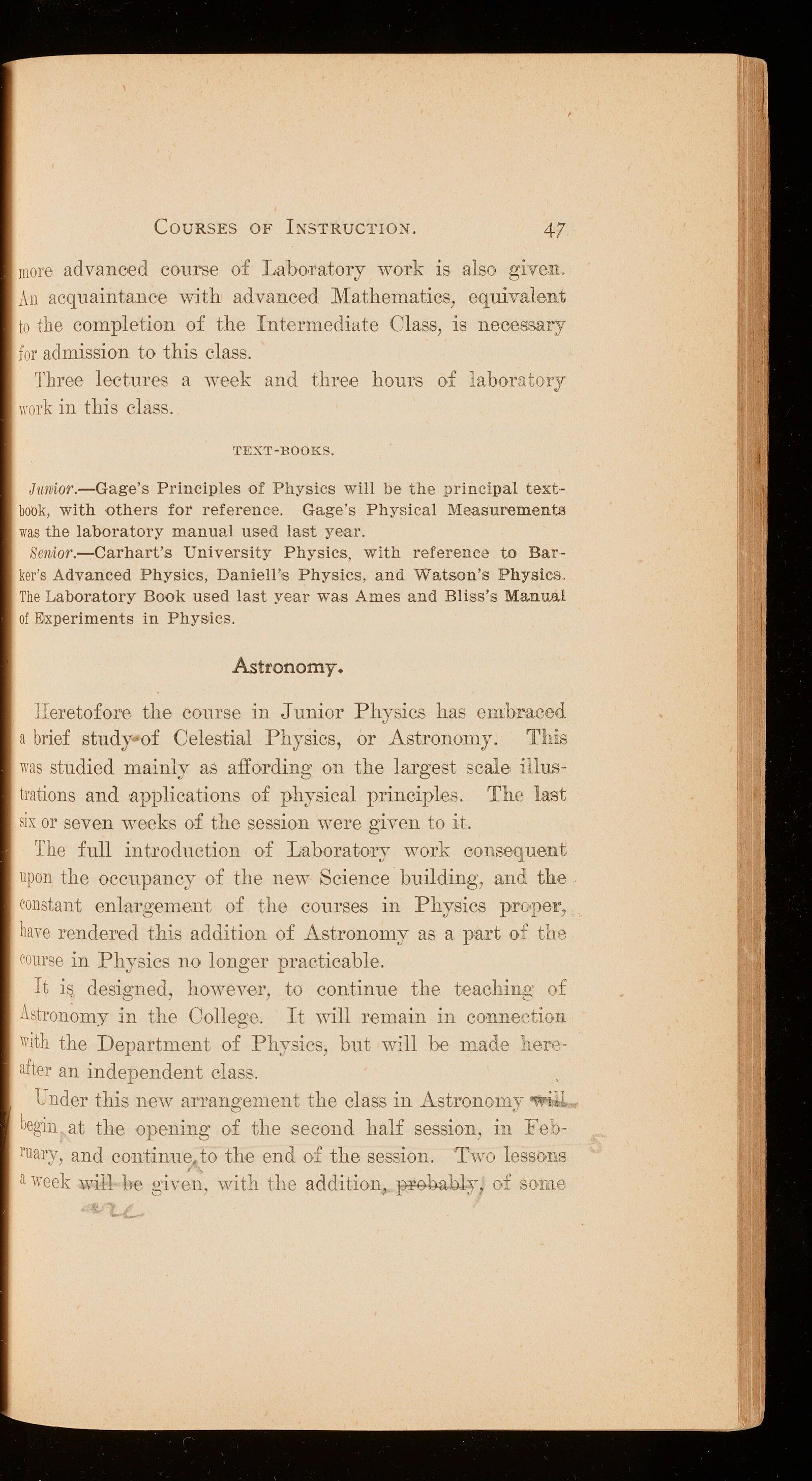
more advanced course of Laboratory work is also given. An acquaintance with advanced Mathematics, equivalent to the completion of the Intermediate Class, is necessary foradmission to this class.
Three lectures a week and three hours of laboratory workin tl1is class.
Jimior.-Gage's Principles of Physics will be the principal textbook, with others for reference. Gage's Physical Measurements wasthe laboratory manual used last year.
Senior.-Carhart's University Physics, with reference to Bar -ker's Advanced Physics, Daniell's Physics, and Watson's Physics TheLaboratory Book used last year was Ames and Bliss's Manual of Experiments in Physiics.
Heretofore the course in Junior Physics has embraced a brief study of Celestial Physics, or Astronomy. This m studied mainly as affording on the lai·geBt scale illustrntionsand applications of physical principles. The last sixor seven weeks of the session were given to it.
The full introduction of Laboratm·y work consequent uponthe occupancy of the new Science ·building , and the constant enlargement of the courses in Physics proper, hamrendered this addition of Astronomy as a pai-t of the coursein Physics no longer prac.ticable.
It ifl designed, however, to continue the teaching of Astronomyju the College. It will remain in connection withthe Department of Physics, but will be made hereafteran independent class.
ender this new arrangement the class in Astronomy ill Leginat the opening of the second half session, in February,and continu 7 to the end of the session. Two lessons a week :will he giYen. with the addition: ~Jly, of some
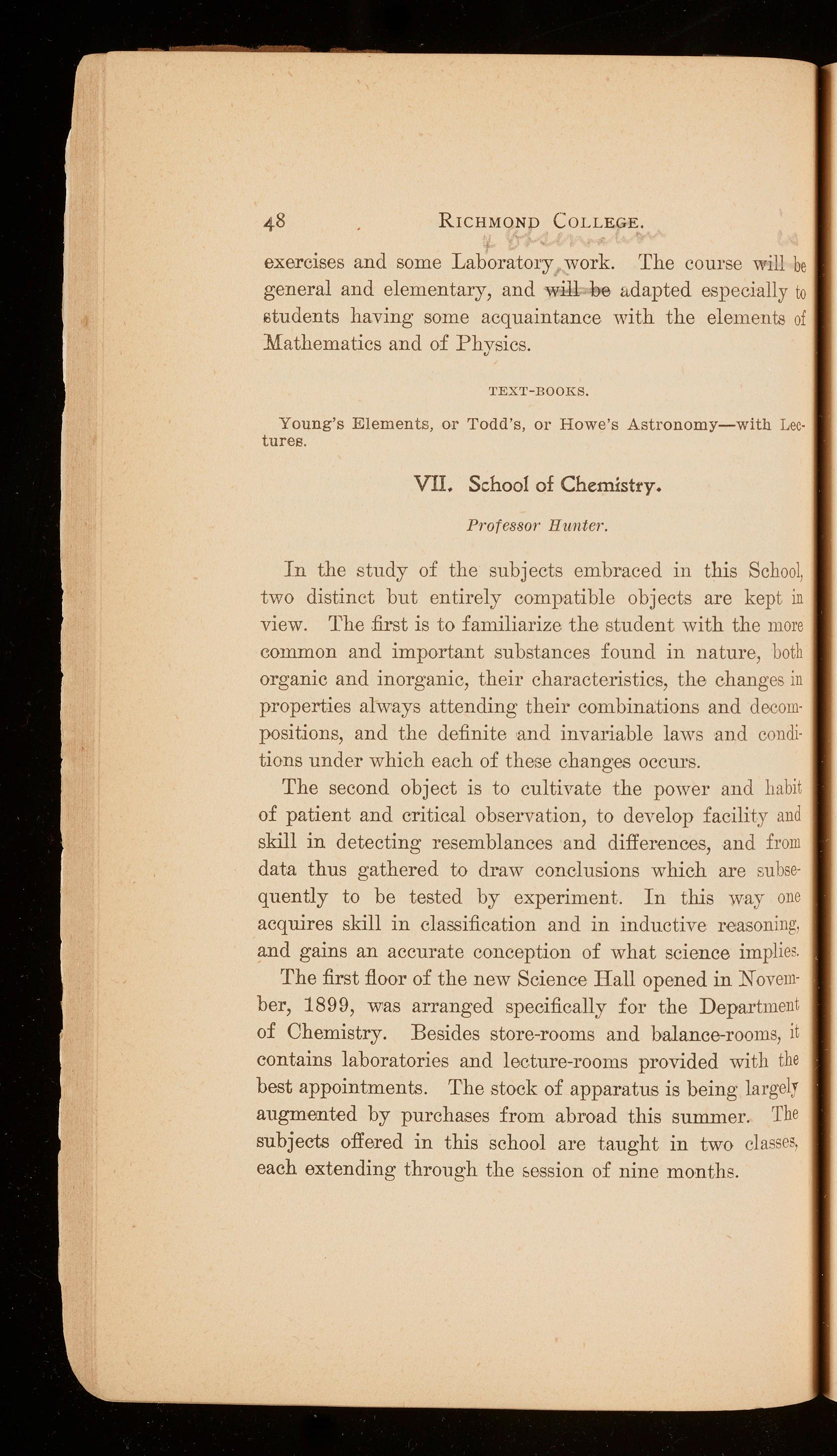
RICHMOND COLLEGE.
exercises and some Lab'oratory work. The course will be general and elementary, and will be adapted especially to students having some acquaintance with the elements of Mathematics and 0£ Physics.
'l'EX'l'-BOOKS.
Young's Elements, or Todd's, or Howe's Astronomy-with Lectures.
Professor Hunter.
In the stu dy 0£ the subjects embraced m this School, two distinct but ent irely compatible objects are kept in view. The .first is to familiarize the stude nt with the more common and important substances found in nature, both organic and inorganic, their characteristics, the changes in properties always attending their combinations and decom· positions, and the definite and invariable law s and conditions under which each 0£ these changes occms.
The second object is to cultivate the power and habit 0£ patient and critical observation, to develop facility and skill in detecting resemblances and di:ffel'ences, and from data thus gathered to draw conclusions which are subse· quently to be tested by experiment. In this way one acquires skill in classification and in inductive reasoning, and gains an accurate conception 0£ what science implies.
The first floor 0£ the new Science Hall opened in N ovem· ber, 1899, was a1Tanged specifically for the Department 0£ Chemistry. Besides store-rooms and balance-rooms, it contains laboratories and lecture-rooms provided with the best appointments. The stock 0£ apparatus is being largely augmented by purchases from abroad this summer. The subjects offered in this school are taught in two classes, each extending through the session 0£ nine months.
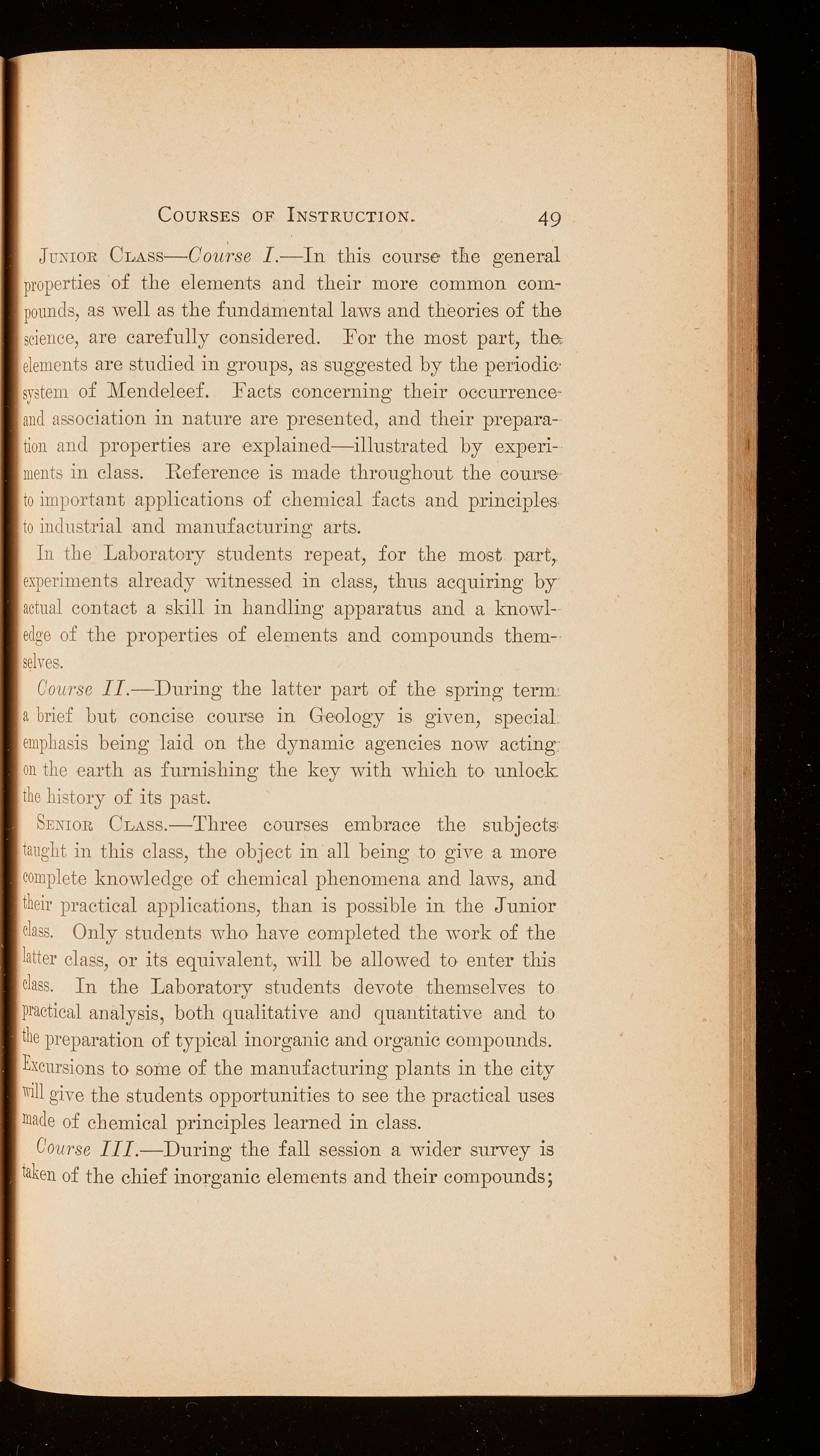
JuxIOR 0LAss-Oou~se J.-In this course the general properties of the elements and their more common compounds,as well as the fundamental laws and theories of the science,are carefully considered. For the most part, the. elementsare studied in groups, as suggested by the periodic · systemof Mendeleef. Facts concerning their occurrence· andassociation in nature are presented, and their preparationand properties are exp lained-illustrat ed by experimentsin class. Reference is made throughout the coursetoimportant applications of chemical facts and principles . toindustrial and manufacturing arts.
In the Laboratory students repeat, for the most part, experimentsalready witnessed in class, thus acquiring byactualcontact a skill in handling apparatus and a knowledgeof the properties of elements and compounds themselves.
Course JI.-During the latter part of the spring term , a brief but concise course in Geology is given, special emphasisbeing laid on the dynamic agencies now acting onthe eart h as furnishing the key with which to unlock thehistory of its past.
SEXIOR 0LAss.-Three courses embrace the subjects: taughtin this class, the object in all being to give a more complete knowledge of chemical ph enom ena and laws, and !.heirpractica l applications, than is possible in the Junior class. Only students who have completed the work of the latterclass, or its equivalent, will be allowed to enter this class. In the Laboratory students devote themselves to practicalanalysis, both qualitative and quantitative and to thepreparation of typical inorganic and organic compounds. Excursions to some of the manufacturing plants in the city willgive the students opportunities to see the practical uses madeof chemical principles learned in class.
Course JJJ.-During the fall session a wid€r survey is takenof the chief inorganic elements and their compounds;

RICHMOND COLLEGE.
and the fundamental laws of chemical combination, the .atomic theory, and the valence hypotheses are considered, ..and their historical development traced. This course is prerequisite to courses four and five.
Course IV.-This course is concerned especially with ihe applications of the science of Chemistry to the purposes -of every-day life. It deals minutely with processes dependent on chemical principles involved in the more important arts and manufactures which contribute so largely to the development of our natural resources, such .as mining, metallurgy, bleaching and tanning.
Course V.-This course is confined to a study of the Chemistry of Compounds of Carbon. The aim is to give ·a general view of the subject, and to show the relations of the hydrocarbons to their various derivatives, and study the ;reactions by which these relations may be experimentally shown. The thorough classification of organic compounds .makes this one of the most interesting of all the fields of Chemistry.
Courses four and five are given during the spring term <-0falternative sessions.
TEXT-BOOKS.
Jimior Class.-Remsen's Chemistry (Briefer Course); Dana's Revised Text-Book of Geology.
Senior Class.-.Newth's Inorganic Chemistry (Longmans & Co.); ·stoddara's, or Congdon's, Qualitative Analysis; F. E. Thorpe's 'Outlines of Industrial Chemistry; Remsen's Organic Chemistry.
A number of reference books are provided by the College, such as Watt's Chemical Dictionary (4 vols.). Mendeleef's Chemistry, Roscoe & Schorlemmer's Treatise on Chemistry, Sadtler's Industrial Organic Chemistry, and Roberts-Austen's Metallurgy.
Professor Whitsitt.
The subjects assigned to this School are divided among three classes. The Junior Class embraces Physiology,
COURSES OF

I
Psychology, and Ethics. The Intermediate Class studies Logi c and the History of Philosophy. The Senior Class studiesPolitical Economy ·and Sociology. A mastery of toosubjects studied in the Junior Class is essential to obtainingthe degree of Bachelor of Arts. Study of the subjectsembraced in the higher classes is very important asa part of liberal education, and, though often overlooked, i.sof great practical value, both as to thought and conduct.
In the JUNIORCLASSthe course of psychological development,as seen in its history, is briefly traced, and considerableattent ion given to the anatomy and physiology of the nervoussystem. The subject will be pursued as a science, andaccording- to scientific methods. In seeking to ascertainthe results of Experimental, Comparative, and Child Psychology , cm·eful effort is made to discriminate between whatis purely conjectural, possible, or probable, and what seemsto be established. Since, however, Psychology, like othersciences, brings us face to face with metaphysical problems,and the human mind cannot be restrained from suchinquiries, no hesita6on will be felt in discussing these problems.
Much time is devoted to Ethics, theoretical and practiool. Amo ng the matters receiving particular attention may be mentioned the different modes of investigation which have been pursued, the mo11e important ethical theorieswhich have been advanced, the progress of ethical thought,and the value of Christian ethics.
In the l NTER:'.IIEDIATECLASSLogic, deductive and inductive,is £rst studied as extensively and as thoroughly as the time at command will allow. The remaining portion of the session is devoted to History of Philosophy. The aimis to familiarize the student with clear conceptions of the probl ems of Philo sophy, to trace the general course of philosophic thought, to examine critically the more

RICHMOND COLLEGE.
important teachings of epoch-making Philo sophies, with special attention to living issues of to-day.
The SENIORCLASSstudies Political Economy and Sociology.
TEXT-BOOKS.
Jiin ior CZass.-Huxley's Physiology; Ladd's Outlines of Descriptive Psychology; References to Sully, James, Davis, and Stout; Thilley's Introduction to Ethics; References to Sidgewick, Calderwood and Davis.
Intermediate Class.-Davis' Elements of Deductive and Inductive Logic; Problems of Philosophy-Hibben; References to Windelbano and other writers on History of Philosophy.
Senior Class. -Walk er's Political Economy, with references to Mill, Hadley, and others. Text-Books on Sociology will be announced in due time.
Acting-Profe~sor }rlitcl,ell.
History is taught with the desire of prcsen ting an insight into the past, so that the mind may be disciplined for the judgment of the present. History is rrganlcd as one stream, with Rome as the great resen-oir, into which the best of Greece and the Orient was emptied 1 and from which, by many outlets, Europe has been supplied. Facts are studied to discover principles and to explain social phenomena, and the method of instruction is from cause to effect. History is viewed more especially from the standpoint of politics and economics, for hi tory is properly the account of the evolution of social organization. This School is divided into thr ee classes, as follows:
1. GENERALHrs-roRY.-Ethnology will be outlined, followed by a discussion of such topics as primitive man, the beginnings of civilization, and the origin of ciYrl society. The civilizrution of the non-Aryan peoples will then be taken up, after which the history of Greece will
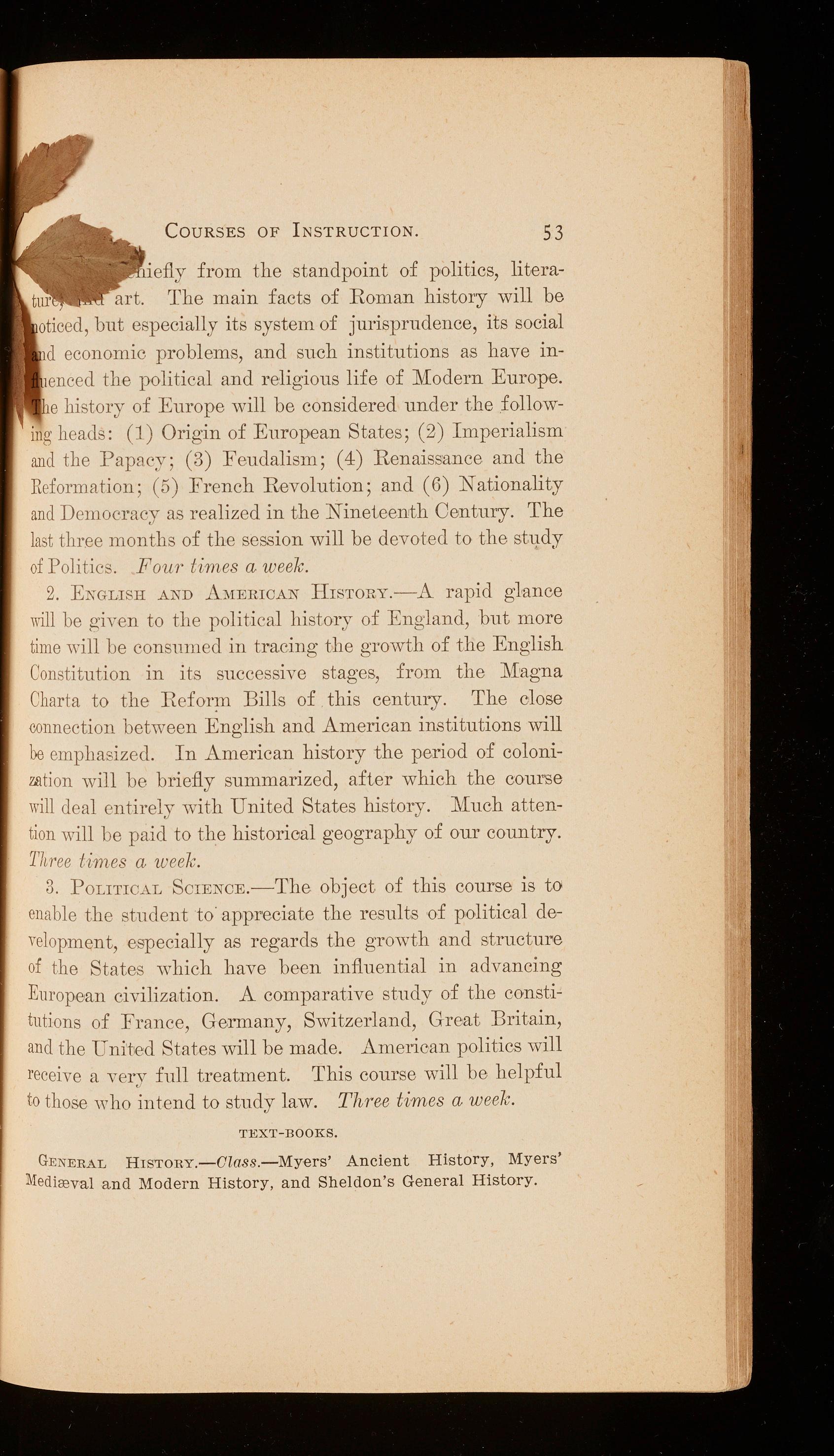
-,,.y;,l;_).lo"~·~· efly from the standpoint of politics, literatlU' art. The main facts of Roman history will be oticed,but especially its system of jurisprudence, its social 1d economic problems, and such institutions as have in1encedthe political and religious life of Modern Europe. e history of Europe will be considered under the followingheads: (1) Origin of European States; (2) Imperialism and the Papacy; (3) Feudalism; (4) Renaissance and the Reformation; (5) French Revolution; and (6) Nationality andDemocracy as realized in the Nineteenth Century. The lastthree months of the session will be devoted to the sh}dy ofPolitics. Four times a week.
2. EKGLISH AND A:1rnmCANHISTORY.-A rapid ghnce 11111 be g'i-rnn to the political history of England, but more time,vill be consumed in tracing the growth of the English Constitution in its successive stages, from the 11fagna Charta to the Refor!n Bills of this century. The close connection between English and American institutions will be empha sized. In American history the period of colonization wi11 be briefly summarized, after which the course willdeal entirely with United States history. Much attentionwill be paid to the historioal geography of our c01mtry. Threetimes a week.
3. PoLITIC.,L ScrnNCE.-The object of this course is to enablethe stude nt to appreciate the result of political development, especially as regards the growth and structm,e of the States ,vhich have been influential in advancing European civilization. A comparative study of the constitutions of France, Germany, Switzerland, Great Britain, andthe "Gnited States will be made. American politics will receive a wry full treatment. This course will be helpful to those who intend to study law. Thre,e times a weelc.
TEXT-BOOKS.
GENERAL HISTORY.-Glass. - Myers' Ancient History, Myers' Mediaeval and Modern History, and Sh el don's General H i s t ory.
52
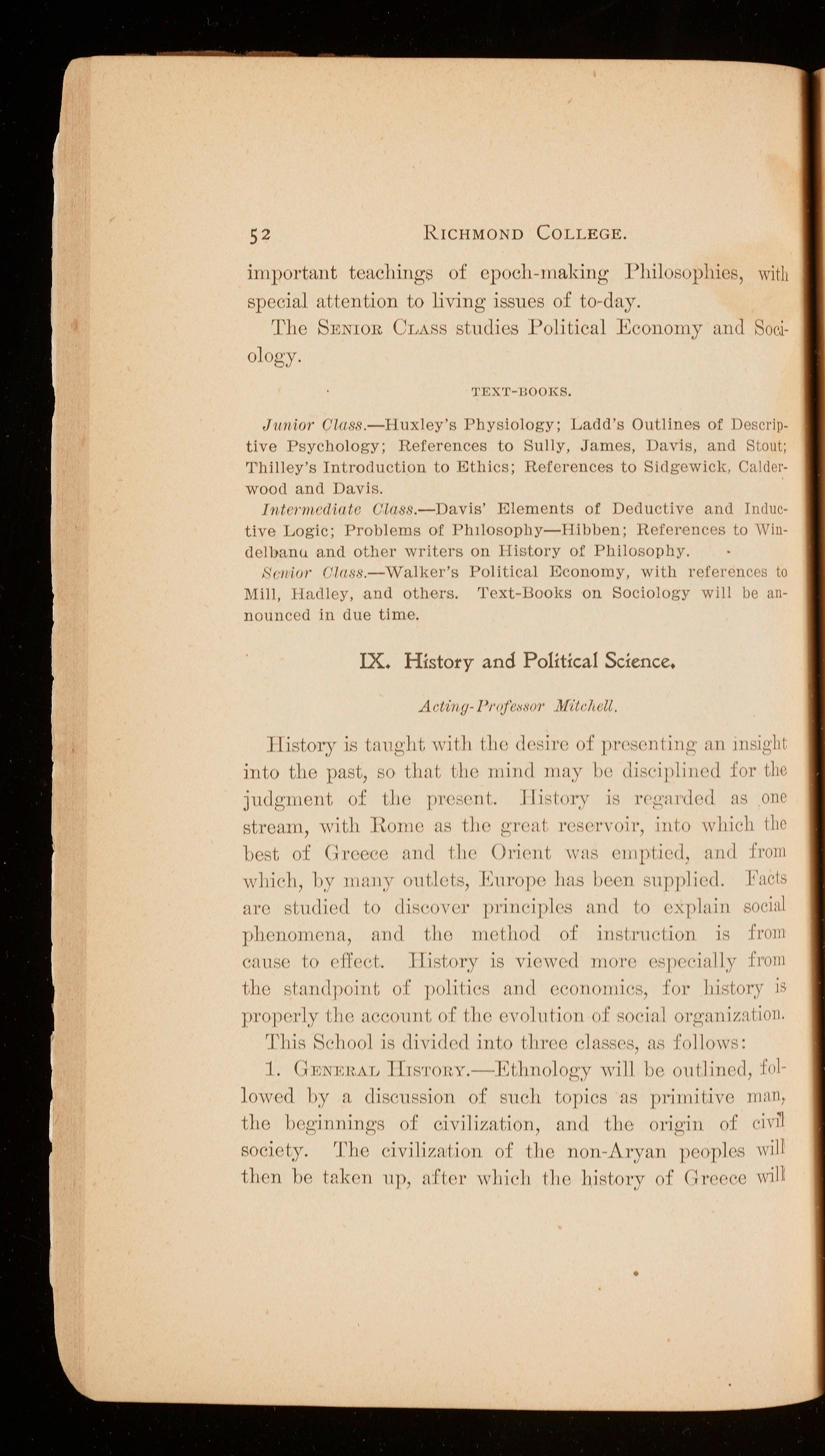
RICHMOND COLLEGE.
important tcacl1i11g::lof cpoch-111aking I>J1ilosoph ics, with special attention to livin g issues of to-day.
The S1rn10H.Cr,Ass sl udi es J.>oliLical Economy and Sociology.
TEXT-BOO K R.
J1111iorC'/ass.-Hu x l ey's Physiology; Laclcl's Outlines of Descriptiv e Psychology; References to Sully, J a m es, DaYis, ancl Stout; Thilley's Introdu ction to Ethics; References to Siclgewick, Calderwood and Davis.
b1t ern1crliul ,c C/a &s.-Davis' El em ent s of Decluclive :rnd Inductiv e Logic; Prob! ms of Ph11osophy-11ibben; llcJ'ercnccs to Wiuclelbanu and other writers on History of Philosophy.
8('1/ior (' /1rns.-W alker's Political B co nomy, with refer ences to Mill, Ilacll ey, and others. Text-Books on Sociology will be ann ounced in clue time.
] Iistory is lm1gl1Lwitl1 tl1c <lc·si,·c• of p1·<•::1c•11I ing a n rnsiglit into tho past, so liinL llio Jlli]l(I rnn_y be di,wipli11ed for the judgment of U10 1n·C'~(•11t. J li -.;tol'_yi::1n·g:11·dC'd as one strearn, wiLh RornC' as the grc•,ll 1·c·s<•rrnir, into wliiC'h the best of (Jrre<'C n nd the Oric•nt wns c 1nptiC'd1 nn<l from wl1i <· h , hy rnnny oul lcls, Europe' l1ns bc'< ' ll s11pplit>d. Facts arc st 11die<l Lo dis(·O\'('J"prineipl<•s and to C'xplnin socin l phenonH•na, mid 111 0 rnel11ocl o f i11stn1<·tion is from cause lo pffr<·I. 1Ii stor_y is Yiewcd rnon• <'~P<'<·inl ly fro111 t,hc s lm1dpoi11t,of pol iti es and c•<·o110111i<·s, fol' hi story is propc·l'1.YLl1 0 :1cco11nL o f 111 0 evol11tio11o f RO<'inl o rg:1niz:1tio11. Tl,i s 8(·hool is <livid d int o ll1l'CO<'lnsscs,ns f'ollowfl: 1. (Ji. :N 1mAr, 1I1sT01:Y.-E t.lrnol og_ywill be 0 11Ili11rd, foll owed by a clisC'11,-sion o f 11eh t opi c-s as prirnitivc mnn, the l irg-i1rnings o f' C'ivilization, and th e o rig-i11 of C'ivn society. Th e c·ivilizalion o f tl1e n o n-Aryan p eoples will th en hr takr11 up , nftc•r whic-11tl1C'}1iRlor _yo f (1 l'<'f'<'Cwilt
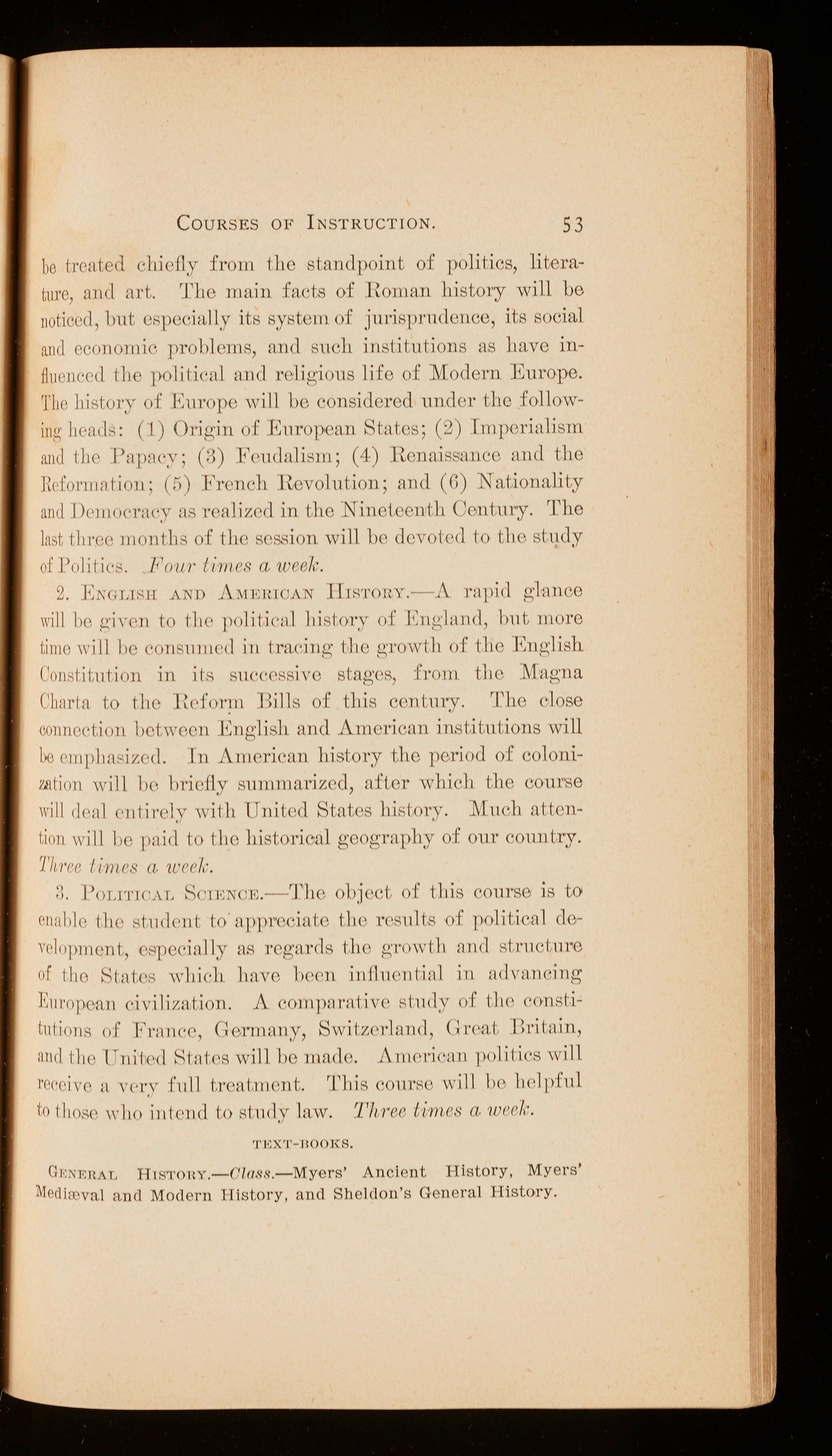
COUR S E S OF IN STRUCTION.
53 be (rrnted c11idly fr om th e sta ndp oint of p olitic s, lit e rature, and art. 'J'lic main fact ( R oma n ]1isLory will be noticed,but eRpcei,tlly it s syste m o[ jnri sp n1dcncc, it s social and ce011omic problems, and s11ch institutions as have inil11e11C' r d th politic·al nn<l r r•li g iou s lifo of Modem Europe. Tlir l1istory of Eu rope wiJl b eon s idor o<l und er tho followin/.(hcnds: (I) (h ig in o{ Enropean States; (~) frnporinlism and thr Pnp:1<·y; (:3) l<'C'udalisrn; (4-) Ronai ss,rn ce all(l Lho Hdonnn(io11; (:i) French Revolution; nnd (G) Nationa lit y and])c,111uc·rnc·y ns realized in th o Nineteenth ConLmy. Th e lastthree mo11tlrno( th e scs.sion will be devotc,cl to tho s (t)dy of Politic·::;. /I'm/I' I i111l'Sa wPek.
2. AND 1\:111m 1cAN J]1 RTOHY. - J\ n1p icl g lnn co willhe giw n lo (lie' politic-nl l1istor,Y of E11glnncl,lrnt more ti1110ll'ill ho c·011s 11111 c'< I i11tra c-i11 g tli e g rowt h o f' tl10 E11gli sh Constitution in it s su ec-rssi, ·o stnp;C's, from Ll1C'.Mngna C'linrtato the Hdo1·:11 l 3ill s o f this cen tur y Tho close com1ection l>ot,voen J~ngli sh and Arnerienn in st.iLnti ons will ho0111plin:;ize< l. In Amerienn hi tory the period of col oniwtion w ill be lll'idl y urnrnari zecl, a (Lor which Lho c 1use ll'ill<knl Pntircl)· wi th U nit ed Stnte s hi s tory. M11(•hatlcnt,io11will l>op:ti<l to tl1c hi sto ri cal g oo-rnph y oi om cou nLry. 'l'/11·1,e I im('s a. 1l'<'l'k.
:J. Po1.rT1c'.\ 1, 8<'1,,:NcK- Tli o obj e •t of' il1is com · e i s Lo 0nalilc,ll1e strn!C'11tto·n pp1"r<·int o tl1c r csult s o f p oliti cal clYC'loprncnt,r1-1pcC'in Ily as r ega rd s tl1c gnm tl1 fllHl st rn ct Ill" of llio 8tnt<·s wl1ic·l1hnv c hC'C'll i11f111 c 11tinl in nclvm1cing E11rnpen.11eivili zn(ion. J\ eompnrntiv r Rtrnly o f tl10 c<rns t,ili1tiom;of Frnnc·c, Ocrmm1y, Switzrrln11<l, (l renL lhib1in, n11dt11e1 l ' nit ,cd 8tntrs will be rnnclc . J\ 111C ' i-ie,1n politiC's will 1·0<·c•i,·r a Y<'r,, · f'11llt.1·raL111c11t.Thi s cour se will l>C'l1r lpful to tl1osr w ho inte11d to s 1.ll(l y lnw. 'l'h1'ee lim ps a, wel'k. 'l'J•:X 'l' - l!OOKS.
0 1,:NP:HAL H1H'l'OHY.-G/aRR.-Myers' Anci e nt ]Ilslory, Myers' M~oia-val ancl Moel rn Hi sto ry , ancl She l don 's General Hi sto ry.

RICHMOND COLLEGE.
Collateral Readin.g. -R agozin's Chaldea; Sayce's Assyriology; Tighe's Roman Constitution; E.merton's Introduction to the Middle Ages; Judson's Nineteenth Century.
EN GLISH AND AMERICAN H1s'rORY.- Class. -M ontgomery' ,s History of England; Thwaite's The Co l onies; Hart's Formation of the Union, and Wilson's Division and Reunion.
Colla~eral Reading. - Curry's South; Bartlett's Facts I Ought to Know; Seeley's Expansion ,of England.
POLITICAL SCIENCE.- Class. -Wil son's The State; Montague's Constitutional History of England; Bryce's American Commonwealth.
Collateral Readin,g .- Burgess' Political Sc i ence and Constitutional Law; Miiller's Political History of Recent Times.
Biology.
Instriwtor,
Beginning with 1901-'2, it is proposed to offer inst111ction in general biology. The course will cover one year, and will treat of tho simp l e laws of lif e and the relations of plants and animals. Typical forms ·of animal life will be studied, with reference ,also to some of the fund amental facts concerning the morphology and physiology of plants
The work of th e cl a s-room will be illu strated by abundant experiments, and, in addition, each st ud ent will be expected to work four h ours a week in the laborator y.
Text-books will be announced at the opening of the session.
English Bible.
Dr. Tupper.
The aim of this study is to give, in a two-years' course, knowledge, as thorough as pmcticable, of the Scriptures as the inspired Word of God. The history, geography, and Jit,ernture of the Bible, with nece ssary exegesis, serve to throw light upon the sacred text and to discover the divine mind and spirit in this rev elation. Intelligent knowledge, by syste m at ic effort, of the Maker and Ruler
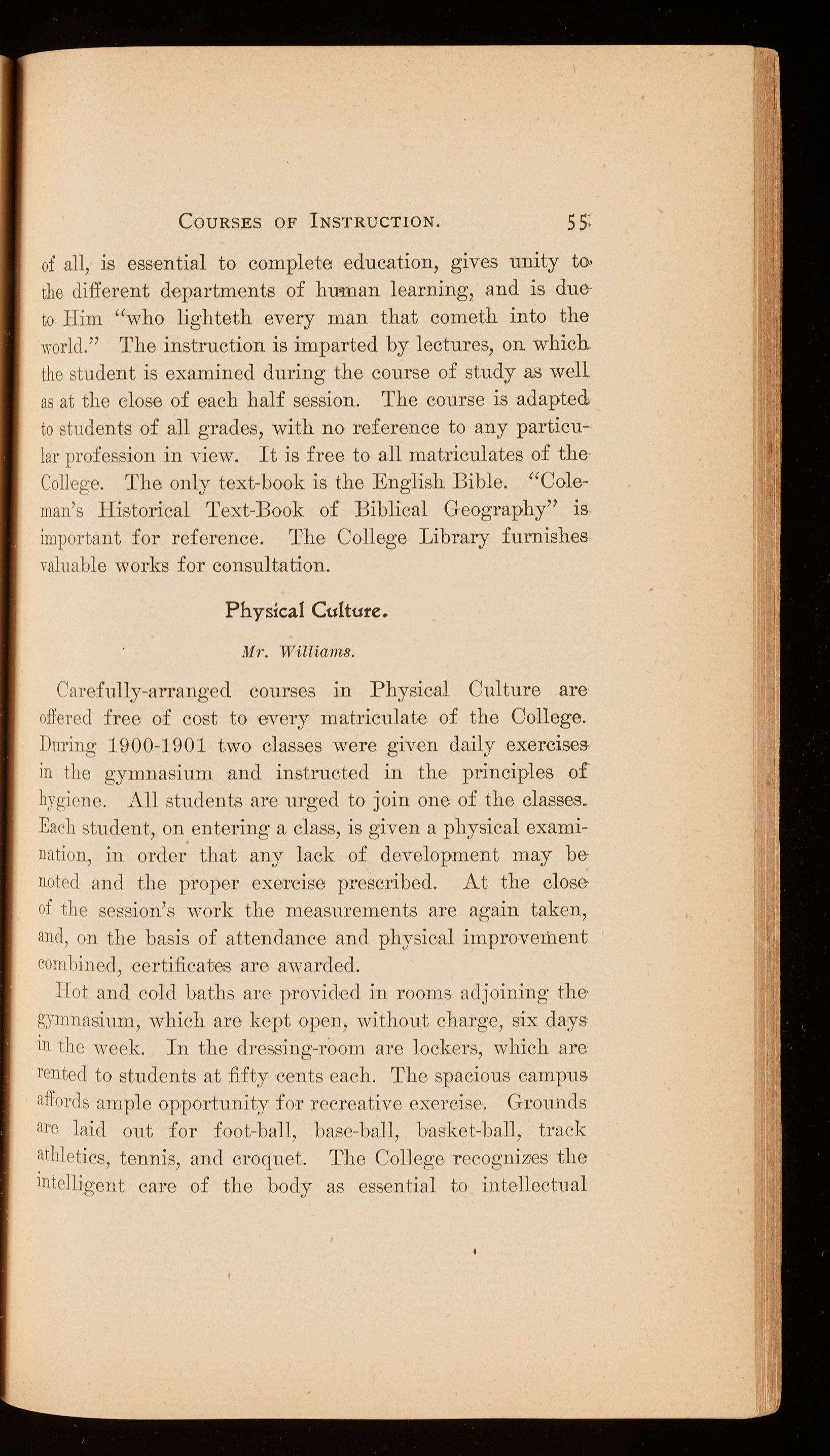
COURSES OF INSTRUCTION.
55: of all, is essential to complete education, gives unity to, the different departments of human learning 1 and is due to Him "who lighteth every man that cometh into the world." The instruction is imparted by lectures, on which the student is examined during the course of study a8 well asat the close of each half session. The course is adapted to students of all grades, with no reference to any paiticular profession in view. It is free to all matriculates of the · College. The only text-book is the English Bible. "Coleman's Historical Text-Book of Biblical Geography" is . important for reference. The College Library furnishes . valuableworks for consultation.
Mr. Williams.
Car efnlly-arranged courses in Physical Culture are · offered free of cost to ,every ma.tricnlate of the College. During J 900-1 DOl two classes were given daily exerdsesin tho gymnasium and instructed in the principles o:f hygiene . All students are urged to join one of the classes_ Each student, on entering a class, is given a physical examination, in order that any lack of development may be· noted and the proper exercise prescribed. At the close of tho session's work the measurements are again taken, and, on the basis of attendance and physical improve1hent comhinecl, certificates are awarded.
H ot and cold baths are provided in rooms adjoining the gymnasium, which are kept open, without charge, six clays in the week. In the chessin g-1·oomm·e lockers, which are rented to students at fifty cents each. The pacious campus affords amp l e opportunity for recreative exercise. Grounds am laid out for foot-ba ll , base-ball, basket-ball, track ~thlctics, tennis, and croquet. The Co]]ege recognizes the llltelligent care of the body as essential to intellectual
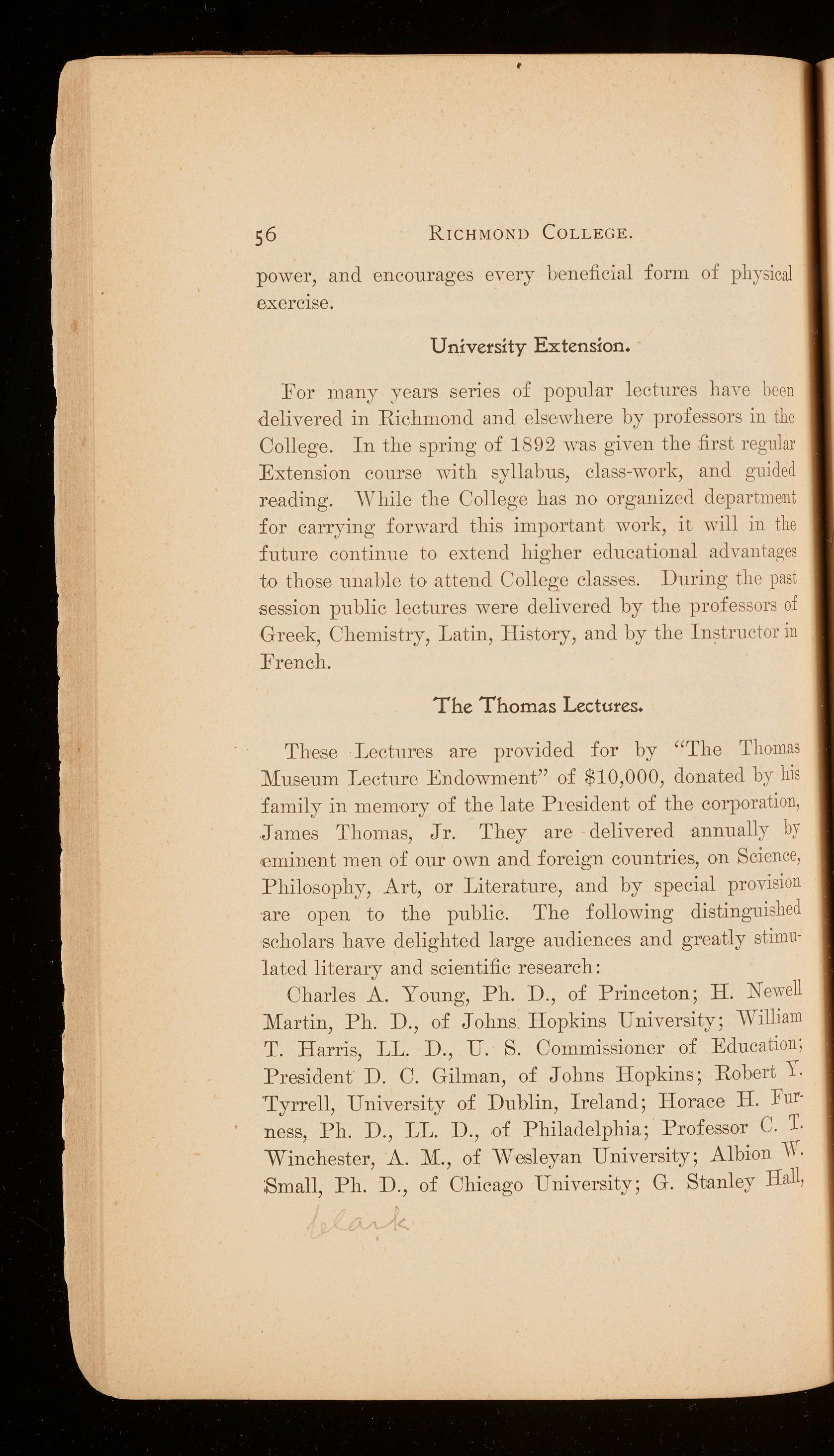
RICHMOND COLLEGE.
power, and encourages every beneficial form of physical exercise .
University Extension.
For many years series of popular le ct ures haYe been delivered in Richmond and e]sewhere by profe ssors in the College . In the spring of 1892 was given the first regular Exten sion course with syllabus, class-work, and guided reading. while the College has no organized department for carrying forward this important work, it will in the future continue to extend higher educational adnntages to those unable to attend OoHege c]asscs During the past session public lectures were delivered by the professors of Greek, Chemistry, Latin, Hi story, and by the In st ru ctor in French.
The Thomas Lectures.
These Lectures are provided for by "The Thomas Museum Lecture Endowment" of $10,000, donated by his family in memory of the late P1 esident of the corporation, James Thomas, Jr. They are delivered annually by ,eminent men of our own and foreign countries, on Science, Philosophy, Art, or Literature, and by special provision are open to the public. The following distingui shed scho]ars have delighted large audiences and greatly stimulated literary and scientific research:
Char le s A. Young, Ph. D., of Princeton; H. Newell Martin, Ph. D., of Johns Hopkins University; William T. Harris, LL. D., U. S. Oommi6sioner of Education; President D. 0. Gilman, of Johns Hopkins; Rober t Y. Tyrrell, University of Dublin, Ireland; Horace H. Furness, Ph. D., LL. D., of Philadelphia; Professor C. T. Winchester, A. M., of Wesleyan University; Albion 11· :Small, Ph. D., of Chicago Un iversity; G. Stanley Hall,
COURSES OF INSTRUCTION.

57
Eh. D., LL. D., President of Clark University; James Henry Breasted, Ph. D., of Chicago University; Professor ,roodrow vYilson, Ph. D., LL. D., of Princeton University; President Benjamin Ide 1i\Theeler, Ph . D., LL. D., of the Un iYer.sity of Cal ifornia, and Hamilton Wright :Mabie,LL. D., of X ew York.
There ·will be two cour ses of lectures on the Thomas Foundation in 1901-'2. Thie autumn course ·will b e given by John Fiske, LL. D., of Cambridge, Mass., on "Early Virginia History." The spring course ,_.illbe given by Professor IIemy Yan Dyke, LL . D ., of Princeton University,on "Poetry."
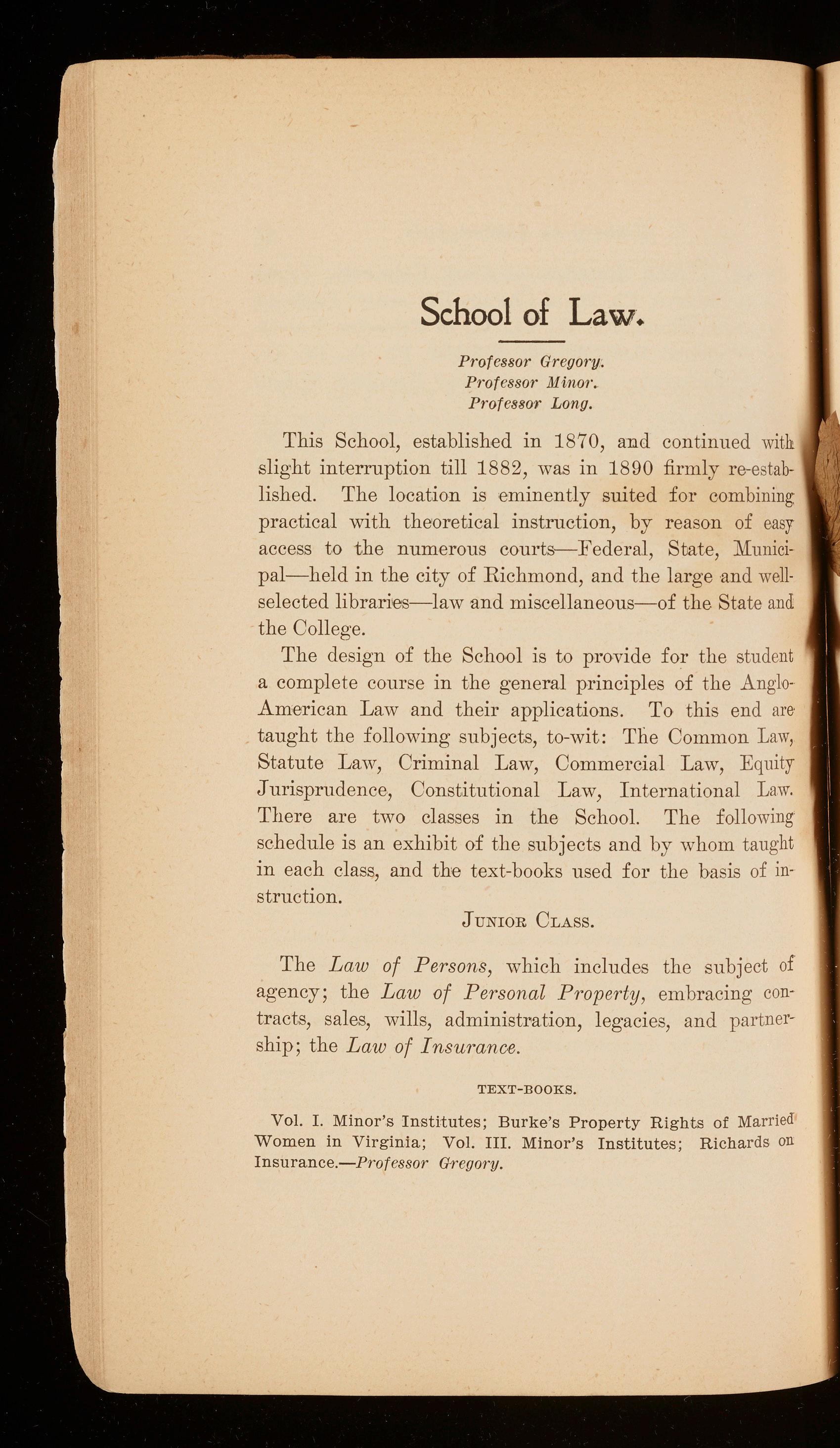
Professor Gregory.
Professor Minor.
Professor Long.
This School, established in 1870, and continued with: slight interruption till 1882, was in 1890 firmly re-established. The location is eminently suited for combining practical with theoretical instruction, by reason of easy access to the numerous courts-:E'ederal, State, Municipal-held in the city of Richmond, and the large and wellselected librariies-law and miscellaneous-of the State and the College.
The design of the School is to provide for the student a complete course in the general principles of the AngloAmerican Law and their applications. To this end are· taught the following subjects, to-wit: The Common Law, Statute Law, Criminal Law, Commercial Law, Equity Jurisprudence, Constitutional Law, International Law. There are two classes in the School. The following schedule is an exhibit of the subjects and by whom taught in each class, and the text-books used for the basis of instruction.
JUNIOR CLASS.
The Law of Persons, which includes the subject of agency; the Law of Personal Property, embracing contracts, sales, wills, administration, legacies, and partnership; the Law of Insurance.
TEXT-BOOKS.
Vol. I. Minor's Institutes; Burke's Property Rights of Married Women in Virginia; Vol. III. Minor's Institutes; Richards on Insurance.-Professor Gngory.

SCHOOL OF LAW.
Criminal Law and Procedure.
TEXT-BOOK.
Minor ' s Synopsis of the Law of Crimes and Punishments.-Professo r Minor.
·ons, Constitutional, and International Law.
TEXT-BOOKS.
or's Insti.tutes; Elliott on Private Corporations; ciples of Constitutional Law; Davis' Outline of · Law.-Prof essor Long.
SENIOR CLASS.
e Law of Negotiable Instruments.
TEXT-BOOKS,
Norto n on BilJs and Notes; Virginia Negotiable Instrument Act.- Professor Long.
The Law of Evidence.
TEXT-BOOK.
McKe lvey on Evidence.-Professor Mi11or.
The Law of Real Prop erty; the Law of Pleading andPractice i n Courts of Law in civil cases; Equity Jurisprudence;Pl eading and Practice in Equity.
TEXT-BOOKS.
Vols . II. and IV. Minor's Institutes; Adams' Equity.-Prof essor · Gregory.
F or Reference: Blackstone's Commentaries; Barton's Law Pract ice; Barton's Chancery Practice; Lomax Digest of Real Proper ty; Sands' Suit in Equity; Sams on Attachment; Va. Law Registe r; Graves' Title to Personal Property; Virginia Reports; Code of Virginia and Pollard's Supplement.
The Faculty r eserve the right to rearrange subject s between classes, and to change text-books as may be deemed' beneficial to the School.

Professor Gregory.
Professor Minor.
Professor Long.
This School, established in 1870, aud continued with. slight interruption till 1882, was in 1890 firmly re-established. The location is eminently suited for combining practical with theoretical instruction, by reason of easy access to the numerous courts-]Tederal, State, Municipal-held in the city of Richmond, and the large and wellselected librari 1es-law and miscellaneous-of the State and the College.
The design of the School is to provide for the student a complete course in the general principles of the AngloAmerican Law and their applications. To this end are taught the following subjects, to-wit: The Common Law, Statute Law, Criminal Law, Commercial Law, Equity Jurisprudence, Constitutional Law, International Law. There are two classes in the School. The following schedule is an exhibit of the subjects and by whom taught in each class, and the text -books used for the basis of instruction.
JUNIOR CLASS.
The Law of Persons, which includes the subject of agency; the Law of Personal Property, embracing contracts, sales, wills, administration, legacies, and partnership; the Law of Insurance.
TEXT-BOOKS.
Vol. I. Minor's Institutes; Burke's Property Rights of Married Women in Virginia; Vol. III. Minor's Institutes; Richards on Insurance.-Professor (Jregory.
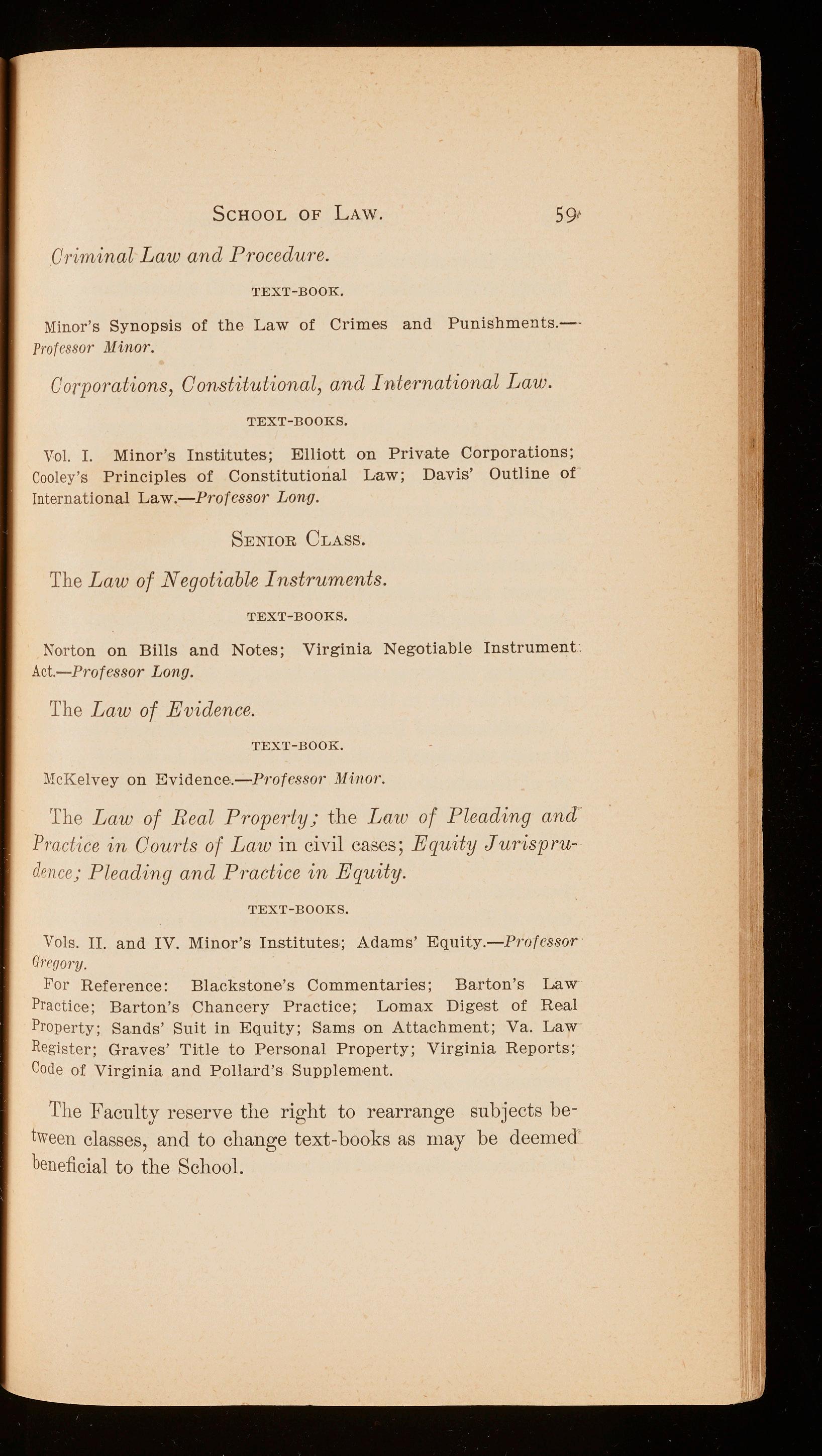
SCHOOL OF LAW. 59, Crimina l Law and Procedure.
TEXT-BOOK.
Minor's Synopsis of the Law of Crimes and Punishments.-Professor Minor.
Corporations, Constitutional, and International Law.
TEXT-BOOKS.
Vol. I. Minor's Institutes; Elliott on Private Corporations; Cooley's Principles of Constitutional Law; Davis' Outline of International Law.-Profcssor Long.
The Law of Negotiable Instruments.
TEXT-BOOKS.
Norton on Bills and Notes; Virginia Negotiable Instrument Act.-Profcssor Long.
The Law of Evidence.
TEXT-BOOK.
McKelvey on Evidence -Professor Minor.
The Law of Real Property; the Law of Pleading and · Practice in Courts of Law in civil cases; Equity Jurisprudence;Pleading and Practice in Equity.
TEXT-BOOKS.
Vols . II. and IV. Minor's Institutes; Adams' Equity.-Professor Gregory.
For Reference: Blackstone's Commentaries; Barton's Law Practice; Barton's Chancery Practice; Lomax Digest of Real Property; Sands' Suit in Equity; Sams on Attachment; Va. Law Regis ter; Graves' Title to Personal Property; Virginia Reports; Code of Virginia and Pollard's Supplement.
The Faculty r eserve the right to rearrange subjects between classes, and to change text-books as may be deemed beneficial to the School.
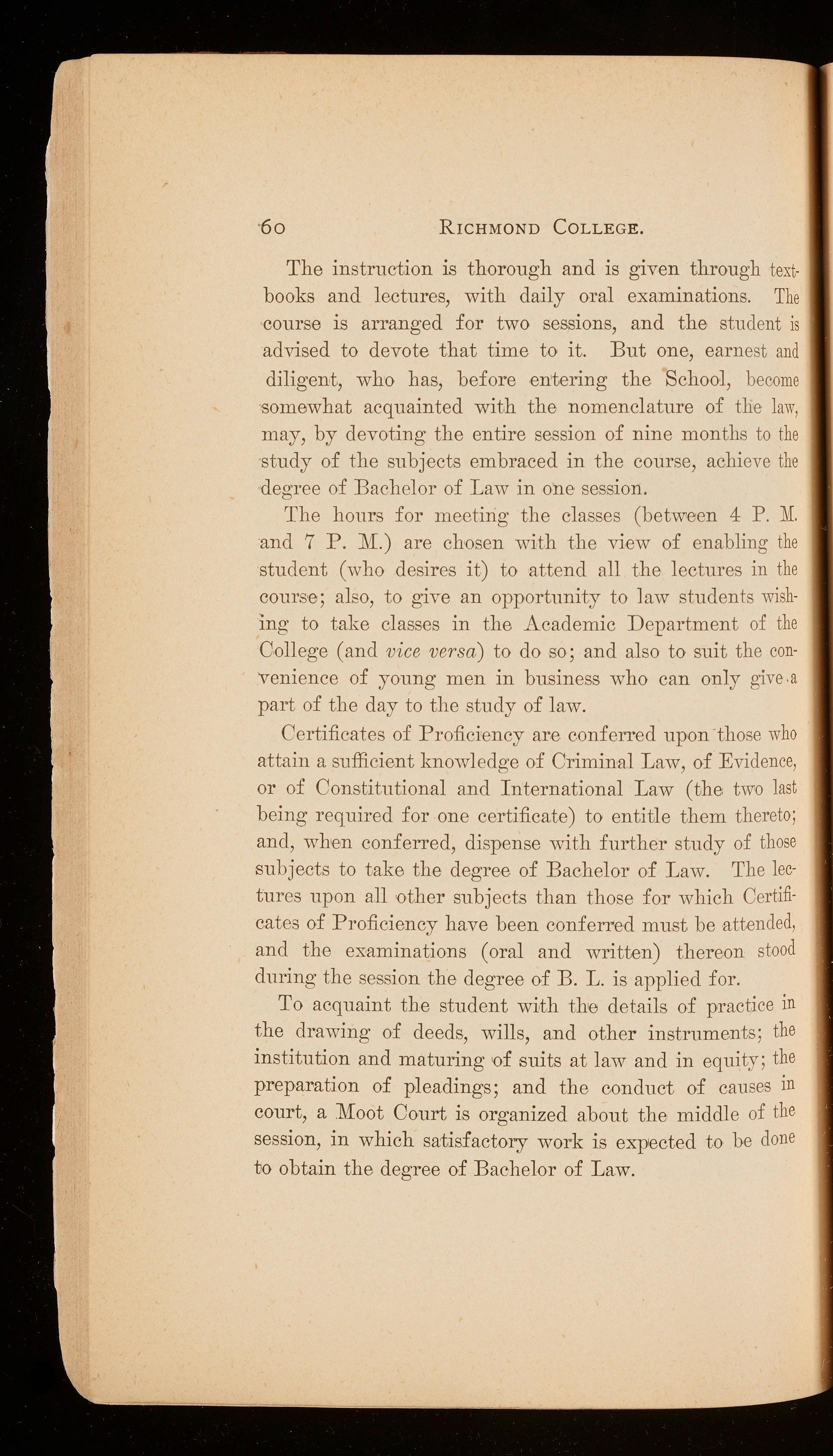
RICHMOND COLLEGE.
The instruction is thorough and is given through textbooks and lectures, with daily oral examinations. The course is arranged for two sessions, and the student is advised to devote that time to it. But one, earn est and diligent, who has, before errtering the School, become somewhat acquainted wit ,h the nomenclature of the law, may, by devoting the entire session of nine month s to the study of the subjects embraced in the course, achi eve the degree of Bachelor of Law in one session.
The hours for meeting the classes (between 4 P. M. and 7 P. M.) are chosen with the view of enabling the student (who desires it) to attend all tlie lectures in the cours ·e; also, to give an opportunity to law students wishing to take classes in the Academic Department of the College ( and vice versa) to do so; and also to suit the convenience of young men in business who can only give.a part of the day to the study of law.
Certificates of Proficiency are conferred upon tho se who attain a sufficient knowledge of Crimina l Law, of Evidence, or of Constitutional and International Law (the two last being required for one certificate) to entitle them thereto; and, when conferred, dispense with further study of those subjects to take the degree of Bachelor of Law. The lee· tures upon all •other sub je cts than those for which Certificates of Proficiency have been con£erred must be attended, and the examinations (oral and written) thereon stood during the session the degree of B. L. is applied for.
To acquaint the student wi,th the details of practice in the drawing of deeds, wills, and other instruments; the institution and maturing 10£ suits at law and in equity; the preparation of pJeadings; and the conduct of causes in court, a Moot Court is organized about the middl e of the session, in which satisfactory work is expected to be done to obtain the degree of Bachelor of Law.
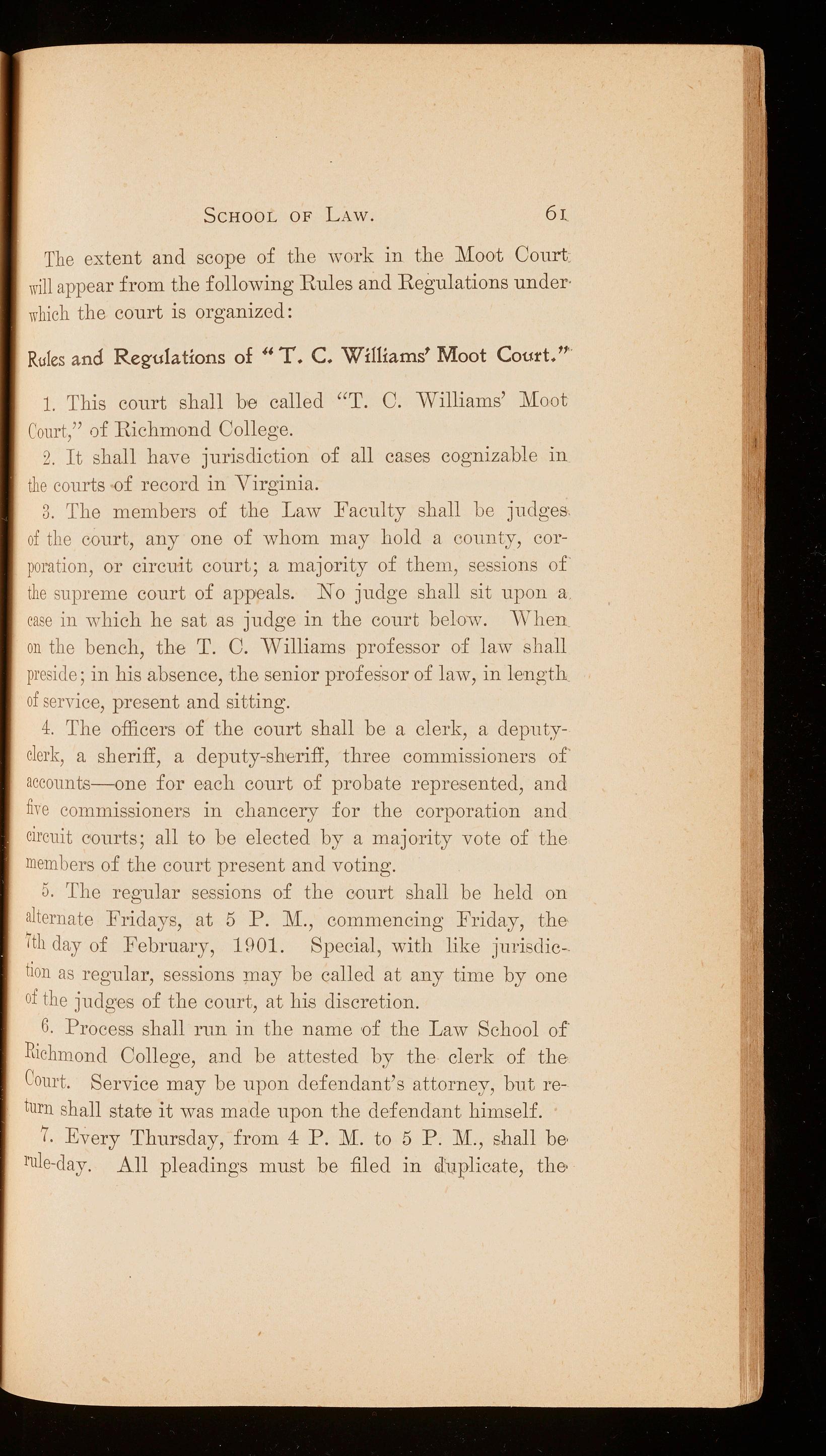
The ext ent and sco·pe of the ,rnrk in th e Moot Court . willappear fr om the following Rules and R eg ulations und er· whichthe court is organized: Rule s and Regulations of "T. C. Williams' Moot Court.''
1. This court sha ll he called "T. 0. ·Williams' Mo ot Court,"of Richmond Coll ege .
2. It shal l have juri sdiction of all cases cognizable in thecourts of record in Virginia.
3. The members of the Law Faculty shall be judges . of the court, any one of wh om may hold a county, corporation,or circuit court; a majority of them, sessions of thesupreme court of appea l s. No judge shall sit upon a casein which he sat as judge in the court belo-w. ·yrhen onthe bench, the T. 0. ·Willia ms professor of la w sha ll preside;in his absence, the senior profe ssor of l aw, in l ength ofserYice,present and sitting.
4. The officers of the court shal l be a clerk, a deputyclcrk, a sher iff, a deputy-sheriff, three commissioners of accounts-one for each court of probate represented, and fire commissioner s in chancery for the corporation and circuitcourts; all to be el ected by a majority vote of the membersof the court pre sent and voting.
5. The regular sessions of the court shall be held on alternate Fridays, at 5 P. M., commencing Friday, the 7thday of Feb ru al'y, 1901. Special , with like juri sdictionas regular, sessions may be call ed at any time by one ofthe judges of the court, at hi s discretion.
6. Process sha ll nm in the name of the Law School of Richmond Coll ege, and be attested by the clerk of the Court. Serv i ce may be upon defendant's attorney, but return shall stat e it was made up on th e defendant him self.
7. Every Thursday, from 4 P M. to 5 P. J\f., shall be• rule-day. All pleadings mu st be filed in d\1plicate, the•
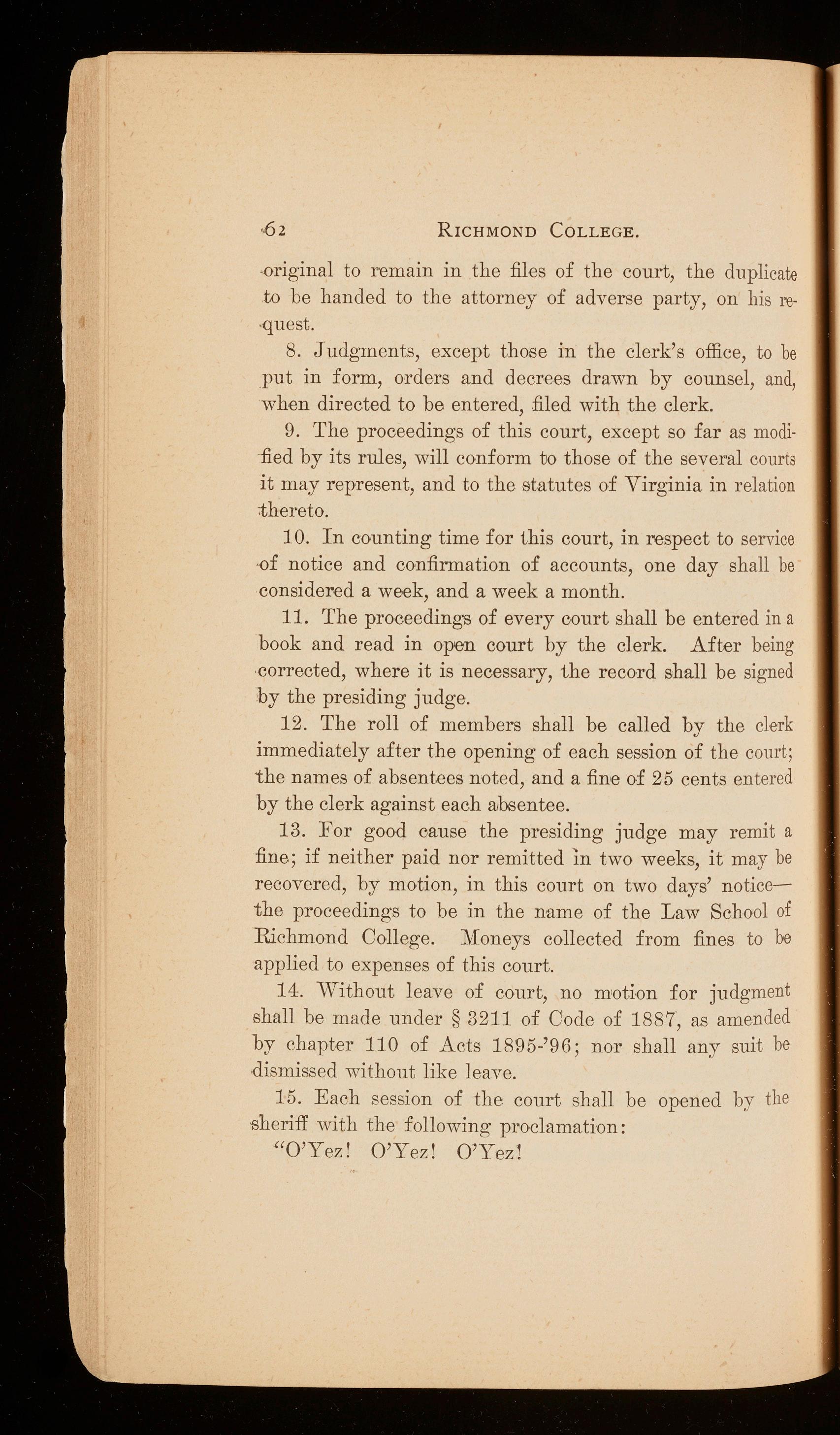
-0riginal to remain in the files of the court, the duplicate to be handed to the attorney of adverse party, on his re.quest.
8. Judgments, except those in the clerk's office, to be put in form, orders and decrees drawn by counsel, and, when directed to be entered, filed with the clerk.
9. The proceedings of this court, except so far as modified by its rules, will conform tJo those of the several courts it may represent, and to the statutes of Virginia in relation thereto.
10. In counting time for this court, in respect to service -0f notice and confirmation of accounts, one day shall be considered a week, and a week a month.
11. The proceedings of every court shall be entered in a book and read in open court by the clerk. After being •Corrected, where it is necessary, ihe record shall be signed by the presiding judge.
12. The roll of members shall be called by the clerk immediately after the opening of each session of the court; the names of absentees noted, and a fine of 25 cents entered by the clerk against each aibsentee.
13. For good cause the presiding judge may remit a -fine; if neither paid nor remitted 1n two weeks, it may be recovered, by motion, in this court on two days' notic ethe proceedings to be in the name of the Law School of Richmond College . Jl.foneys collected from fines to be applied to expenses of this court.
14. Without leave of court, no motion for judg ment shall be made under § 3211 of Code of 1887, as amended by chapter 110 of Acts 1895-'96; nor sha]l any suit be dismissed without like leave.
15. Each session of the court shall be opened by the sheriff with the following proclamation: "O'Yez! O'Yez! O'Yez!

&ciNOOL OF LAW.
"SilenC'e is commanded, on pain of fine, while t,he 'T. C.Williams' Moot-Court' is in session. All persons having motions to make, pleas to enter, suits to prosecute, or other business before this court, will .come forward and .they shall beheard.
"May all persons present, during the session of the court, deport themselv,es in a decorous and gentlemanly manner "
Law Class Orator.
The students of the Law School are authorized by the Board of Trustees of the College to select one of their number as "Law-Class Orator," to deliver an oration at the Commencement of the College. Their selection is subjectto the approval of the President of the College.
Fees in School of Law. Matriculation
uition in both classes, whe:n taken together.
The matriculation fee is payable at entrance. Tuition fees are payable half in September and half in Febrnary.
Most students enter for the Junior Class. Their fees forthe entire session, therefore, amount to $61, of which $2.50 is refundruble July 1st. The matriculation f ee admits a student to all College privileges, such as use of library, gymnasium, bath, etc. If law students desire to re side on the College grounds, they may engage rooms and tableboardon equal terms with academic students. R ates are fully st ated further on in this catalogue under the head of"Expen ses."
The cost of all text-book s needed for the entire Law course is about $75.
1
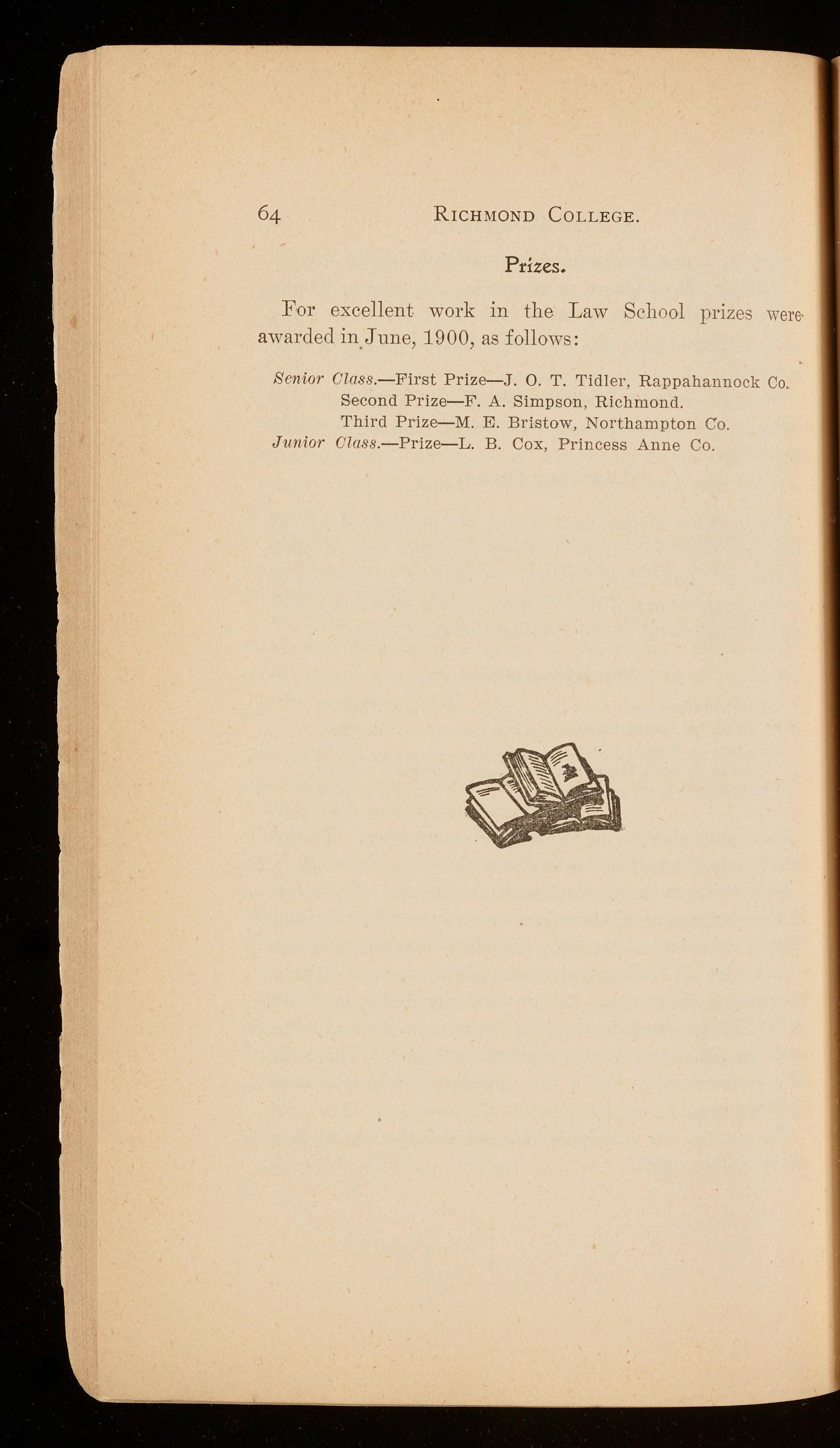
RICHMOND COLLEGE.
Prizes.
For excellent work in the Law School pnzes wereawarded in.June, 1900, as follows:
Senior Olass.-First Prize-J. 0. T. Tidier, Rappahannock Co.
Second Prize-F. A. Simpson, Richmond
Third Prize-M. E. Bristow, Northampton Co.
Junior Glass.-Prize-L. B. Cox, Princess Anne Co.
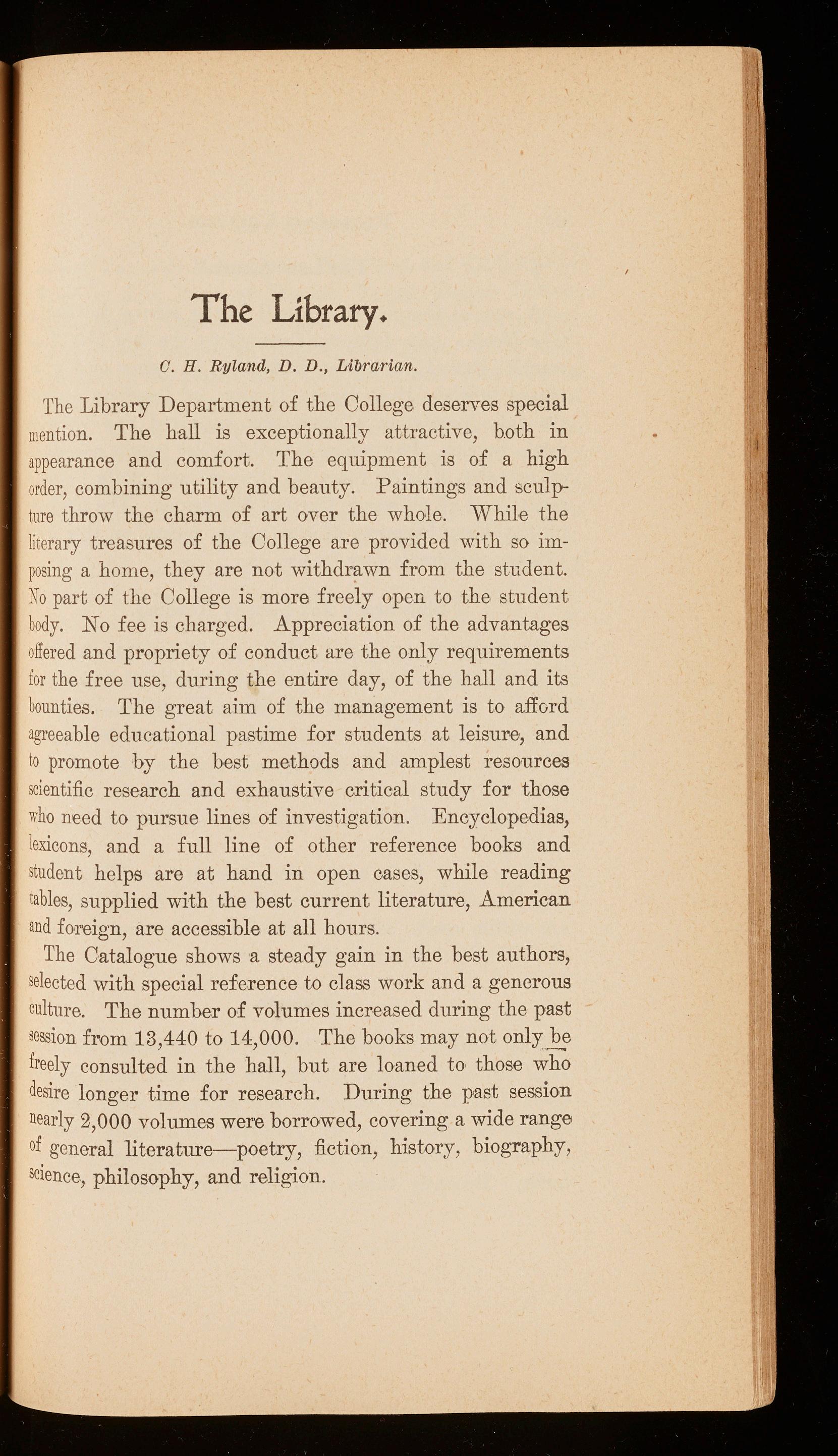
a. H. Ryland, D. D., Librarian.
The Library Department 0£ the College deserves special mention. The hall :is exceptionally attractive, both in appear ance and comfort. The equipment is 0£ a high order, combining utility and beauty. Paintings and sculpturet hrow the charm 0£ art over the whole. While the literary treasures 0£ the College are provided with so imposing a home, they are not withdrawn from the student. Io part 0£ the College is more freely open to the student body. No iee is charged. Appreciation 0£ the advantages offeredand propriety 0£ conduct a.re the only requirements fo r the free use, during the entire day, 0£ the hall and its bounties. The great aim 0£ the management is to a:fford agreeable educational pastime for students at leisure, and to promote hy the best methods and amplest resources scientific research and exhaustive critical study for those 11'ho need to pursue lines 0£ investigation. Encyclopedias, lexicons, and a foll line 0£ other re£erence books and student helps are at hand in open cases, while reading tables,supplied with the best current literature, American andforeign, are accessible at all hours.
The Catalogue shows a steady gain in the best authors, select ed with special reference to class work and a generous culture. The number 0£ volumes increased during the past sessionfrom 13,440 to 14,000. The books may not only be freely consulted in the hall, but are loaned to those who desire longer time for research. During the past session nearly2,000 volumes were borrowed, covering a wide range of general literature-poetry, fiction, history, biography, science,philosophy, and religion.

R ICHMOND COLLEGE.
The Law Alcove.
A special feature in the hall is the al covie devoted to The Heaton Law Library, founded by the late Mrs. Har· riet M. Purcell, at a cost of $3,000, in honor of her deceased brother, Hon. Henry Heaton, of Loudoun county. On this foundation of the most approved and valuable works on l aw, the College is building by yearly accessions of valuable Reports from the Genera l and St.ate Governments, and all necessary Current Magazines. The studenl8 in t h e Law Department are given access to this Law Library, and use it very freely.
B ible Stu dy and Su nday R ea ding .
A special Reading-Room for the Young Men' s Christian Association has been fitted up. Here is the Missionary Library-the religious periodicals and appliances for the thorough study of the Sunday-school lesson. On Sunday afternoon this special reading-room may be the gatheringplace of all students who can be induced to read, for pleasure or profit, the curr ent religious literatur e of the country.
Bible study finds many accessories in the Library. .A long line of the best commentaries on the Holy Scriptures are within reach, and the critical and experimental study of God's 1,Vorkis constantly encouraged.
Museum.
The beautiful James Thomas, J1·., Museum and Art Hall has been opened, and is now dedicated to its specific use . Into it have already been gathered some casts of celebrated statuary, a few paintings, and many valuable curios and objects of ethnographical interest from all lands. Recently there were ad<led by purchase life-size
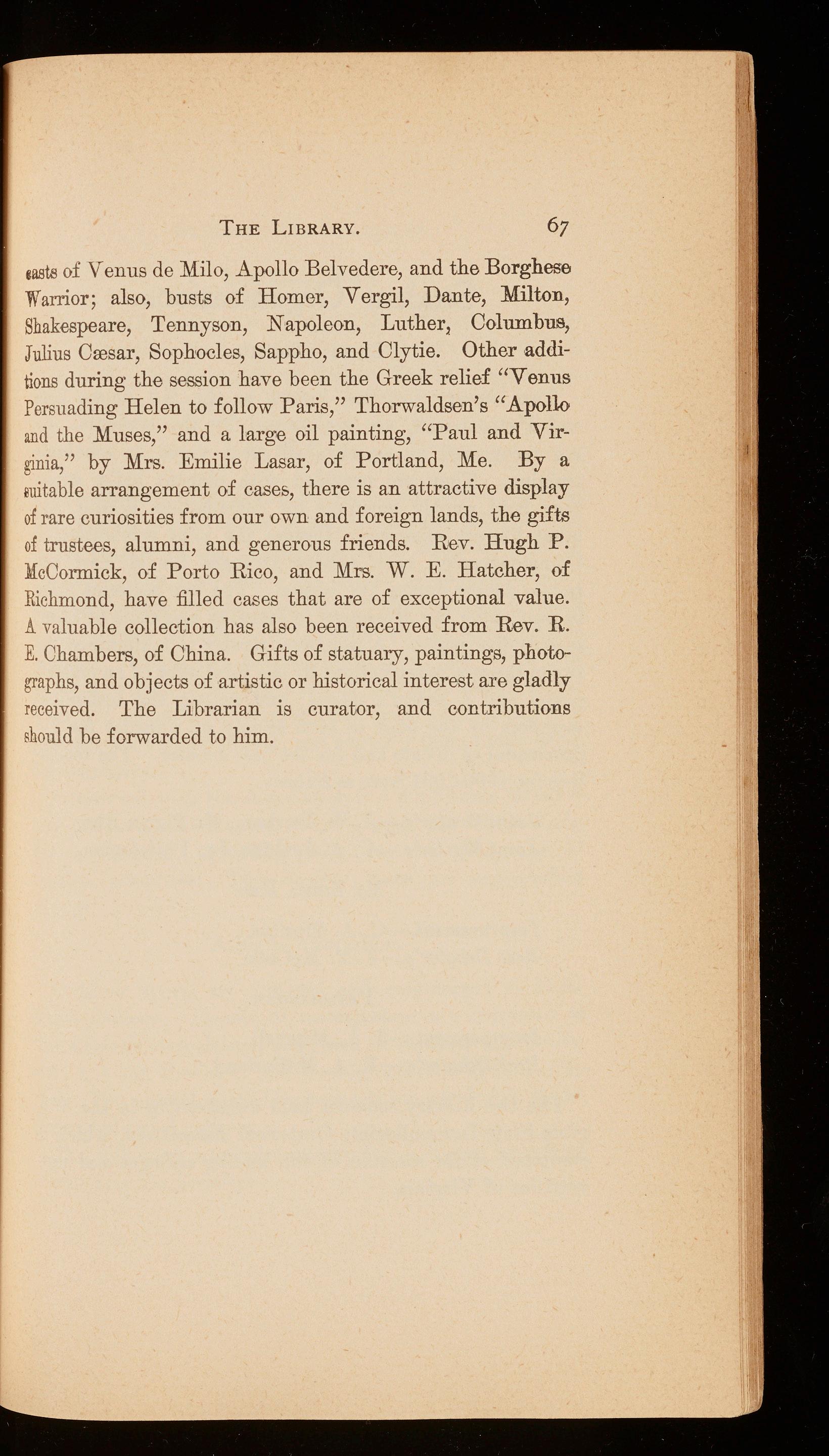
THE LIBRARY. casts of Venus de Milo, Apollo Belvedere, and the Borghese Warri or; also, busts of Homer, V ergil, Dante, Milton, Shakespeare, Tennyson, Napoleon, Luther, Columbus, Julius Cresar, Sophocles, Sappho, and Clytie. Other additions during the session have been the Greek relief "Venus Persuading Helen to follow Paris," Thorwaldsen's "Apollo andthe Muses," and a large oil painting, "Paul and Virginia," by Mrs. Emilie Lasar, of Portland, Me. By a tiuitable arrangement of cases, there is an attractive display ofrare curiosities from our own and foreign lands, the gifts of trustees, alumni, and generous friends. Rev. Hugh P. :McCormick, of Porto Rico, and Mrs. W. E. Hatcher, of Richmond, have filled cases that are of exceptional value . .A.valuable collection has also been received from Rev. R. E.Chambers, of China . Gifts of statuary, paintings, photographs, and objects of artistic or historical interest are gladly received. The Librarian is curator, and contributions should be forwarded to him.

Two literary societies, known as the Mu SrmrA Rm, and PmLOLOGIAN,are maintained by the students, and are recognized as agencies of great value in scholastic training. They are provided with elegant halls, where they hold weekly meetings for declamation, debate, and other literary exercises. Besides the joint celebration at Commencement, each society arranges for at least one public debate during the session. The two societies unit.e in publishing the Messenger, a monthly magazine of about seventy-five pages. A generous rivalry is maintained between the two organizations by the joint offer of an orator's medal and a writer's medal; and among the individual members by the offer in each society of a medal for improvement in debate and for the best debater. The medallists for 1900-1901 were as follows:
Joint Orator's.-J. W. Durham, Mu Sigma Rho.
Joint Writer's.-0. A. Jenkins, Jr., Philologian.
Mu SIGMA RHo.
I mprov~ment.-0. A. Sinclair.
Best Debater's.-J. P. McCabe. PHILOLOGIAN.
Improvement.-J. L. Mitchell.
Best Debater's.-R. A. McFarland.
The two literary societies hold membership in the Virginia State Intercollegiate Oratorical As.sociation, which is composed of the societies of the leading colleges and universities of Virginia. '
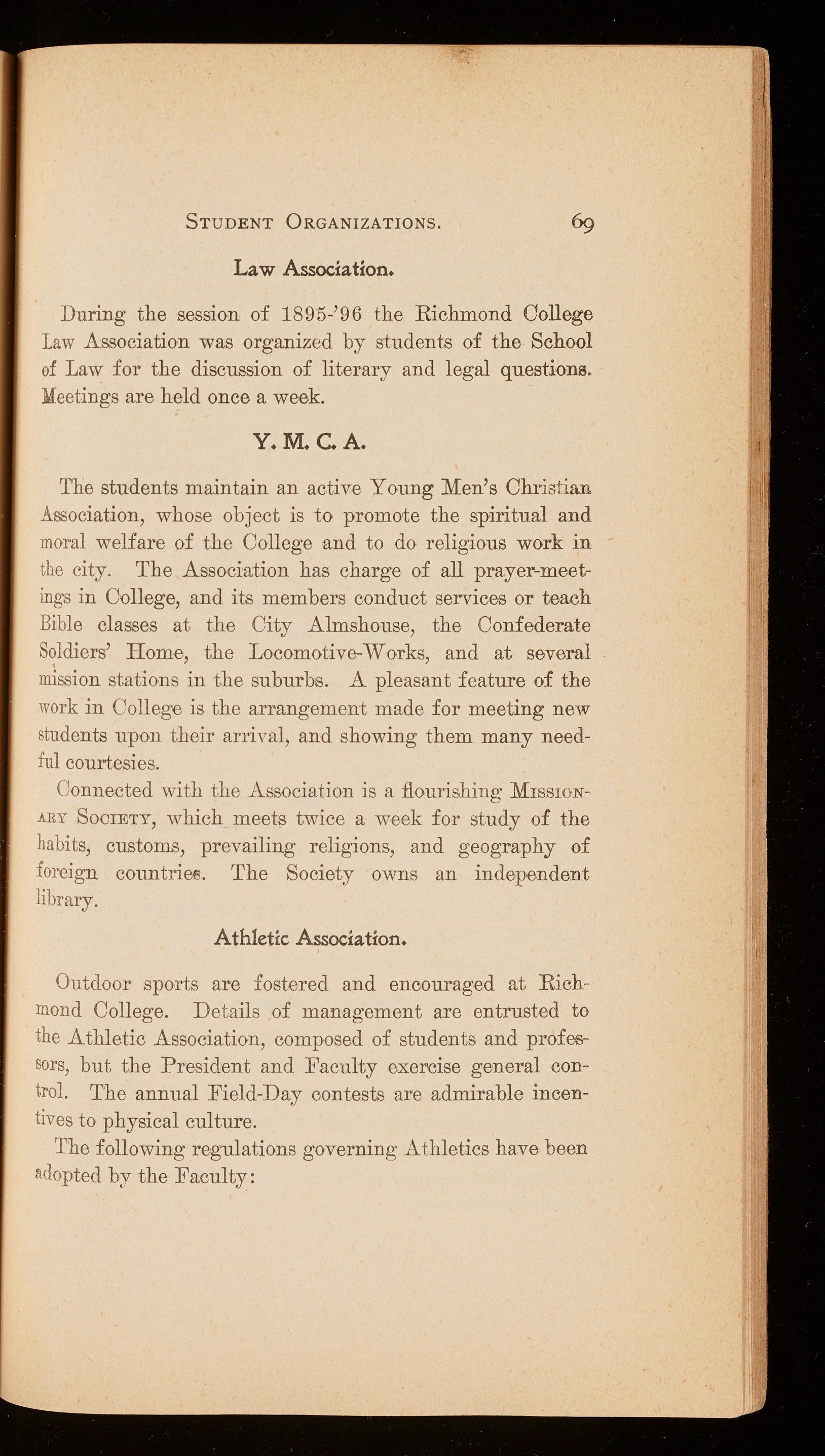
During the session of 1895-'96 the Richmond College Law Association was organized by students o:f the School of Law for the discussion of literary and legal questions. Meetings are held once a week.
The students maintain an active Young Men's Christian Association, whose object is to promote the spiritual and moral welfare of the College and to do religious work in the city . The Association has charge o:f all prayer-meetings in CoHege, and its members conduct services or teach Bible classes at the City Almshouse, the Confederate Soldiers' Home, the Locomotive-Works, and at several mission stations in the suburbs . A pleasant feature o:f the work in College is the armngement made for meeting new students upon their arrival, and showing them many needful courtesies.
Connected with the Association is a :flourishing M1ss10NARYSocIETY, which meetf! twice a week for study of the habits, customs, prevailing religions, and geography o:f foreign countrie£1. The Society owns an independent library.
Outdoo r sports are fostered and encouraged at Richmond College. Details o:f management are entrusted to the Athletic Association, composed o:f students and professors, but the President and Faculty exercise general control. The annual Field-Day contests are admirable incentives to physical culture.
The following regulations governing Athletics have been adopted by the Faculty:

1. The President of the College has general oversight and control of field and track athletics, and is authorized to forbid any features in these exercises which endan ger the health or morals of the participants.
2. Only matriculated students m·e eligible to play on & College team in any public contest. The Faculty reserves the right to remove from the t eam at any time any member who may neglect his class duties, or prove himself in any way unworthy.
3. Each team is allowed four trips from Colleg e, provided that these four trips do not involve being away from College more than four school days. All proposed games must have the approval of the President of the College before engagements are made.
4:. No student under 21 year s of age is permitt ed to become a member of a regular team exc ept upon written permission f-riom hi s parent or guardian, addressed to the President of the College.
5. Any member of an athletic team who is report ed for neglect of his duties or non~attendan ce on lectures m ay be required by the Faculty to sever his connection with such team.
6. Athletic teams are permitted to engage in contests away from Richmond only with teams from other institutions of learning.
The Alumni of the College have long been orga nized into a Society which holds annual meetings 1Jorene w old associations, maintain a close connection with Alma M ater, and further the cause of education and letters. For several years the custom has been to have an annual banqu et on Wednesday evening of Commencement week. The officers of the Society are:

s.LEE KELLY, Esq., Richmond, Va ......... President.
REV . 0 . s. BUNTING, D. D., Petersburg . 1,1irst Vice-President.
A.D J ONE S, Esq., Newport News, Va ... Second Vice-President.
MB.R. B. LEE, New York . ...... : .. . .. . . 'l'foird Vice-President.
DR.J . M. WHITFIELD, Richmond, V a .. .... . . . Secretary.
MR C. M. GRAVES, Richmond, Va . ... . .. . Treasurer.
Degree men are me mbers of the Society without eleccion,an d all former students are eligible for election. The initiation fee of $3 has been abolished, and an annual fee of $1 substituted therefor.
Iu May, 1898, there was organized in Louisville a Chapter of the General Society of Alumni, which will be known as the "Kentucky Association of Richmond College Alumni." The Kentucky Association holds annual meetings in May. The pre sent officers are: Dr. S. E. Woody, Louisville, president; Profe s sor W. 0. Carver, Louisville, secretary and treasurer.
In February, 1899, the alumni resident in Norfolk, Va., and vicinity organized a "Norfolk Chapter of Richmond College .Alumni." Th~ chapter holds annual meetings in February. The present officers are: Samuel Dickinson, Esq., Norfolk, president; 0. W. Coleman, Esq., Ohurchland, secretary and treasurer.
The President of the College will be glad to correspond with alumni who desire to form local associations.
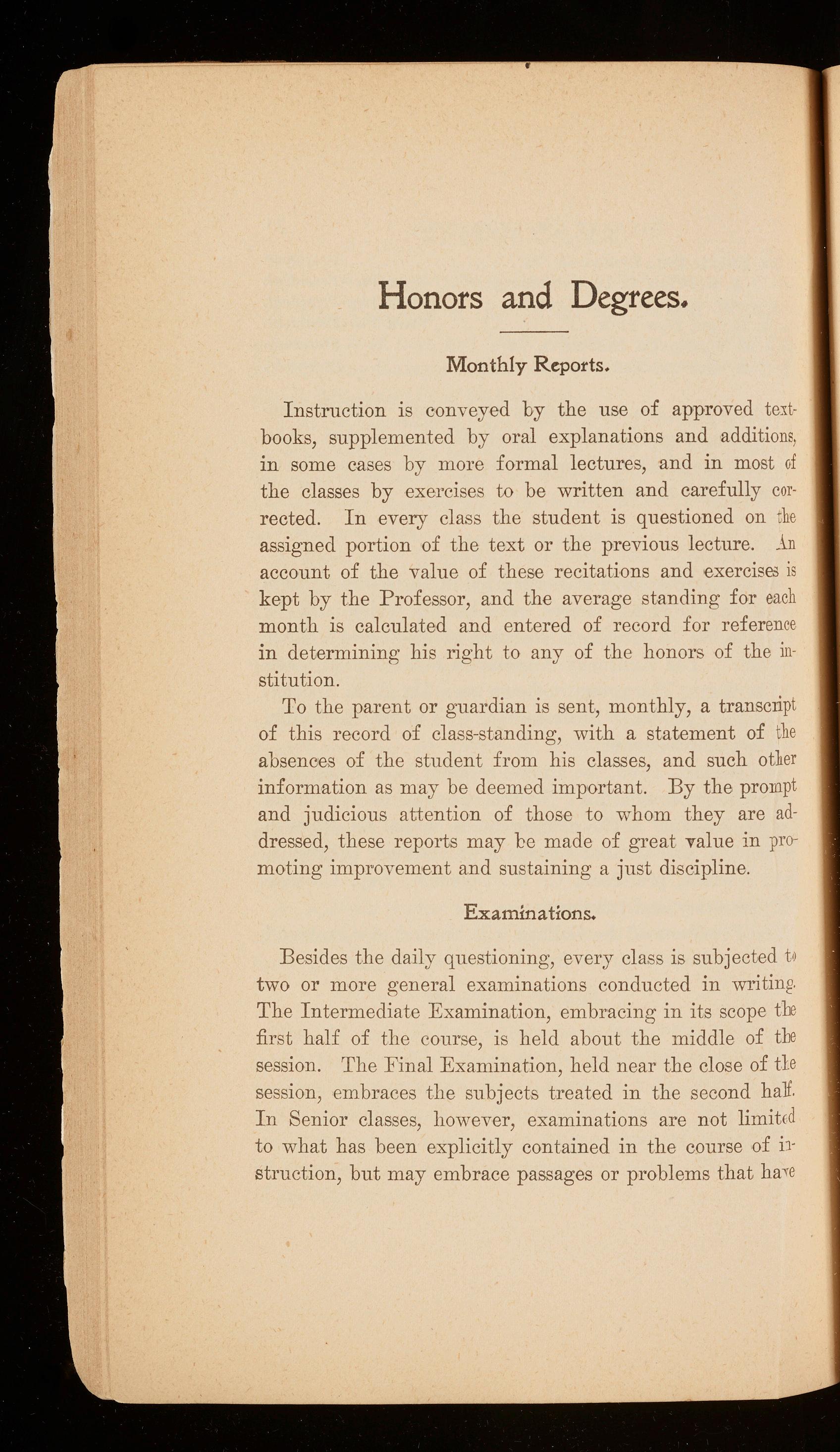
Instruction is conveyed by the u se 0£ approved t extbooks, supplemented by oral explanatio n s and additions , in some cases by more formal l ectures, and in most of the classes by exercises to be written and carefully corrected. In every class the student is questioned on the assigned portion 0£ the text or the previous lecture. An account 0£ the value of these recitations and exercisea is kept by the Professor, and the average standing for each month is calculated and entered of record for reference in determining his right to any of the honors of the institution.
To the parent or guardian is sent, monthly, a transcript 0£ this record of class-standing, with a statement 0£ the absences of the student from his classes, and such ot:her information as may be d eemed important. By the prompt and judicious attention of those to whom they are addressed, these reports may be made of great value in promoting improvement and sustaining a j ust discipline.
Exami n ati ons.
Besides the daily questioning, every clas s is subjected t,J two or more general examinations conducted in writin g. The Intermediate Examination, embracing in its scope t hl first half of the cour se, is held about the middle of tbl session. The Final Examination, held near the close of tle session, embraces the subjects treated in the second half. In Senior classes, however, examinations are not limit(d to what has been explicitly contained in the course 0£ i1struction, but may embrace passages or problems that ha -v e
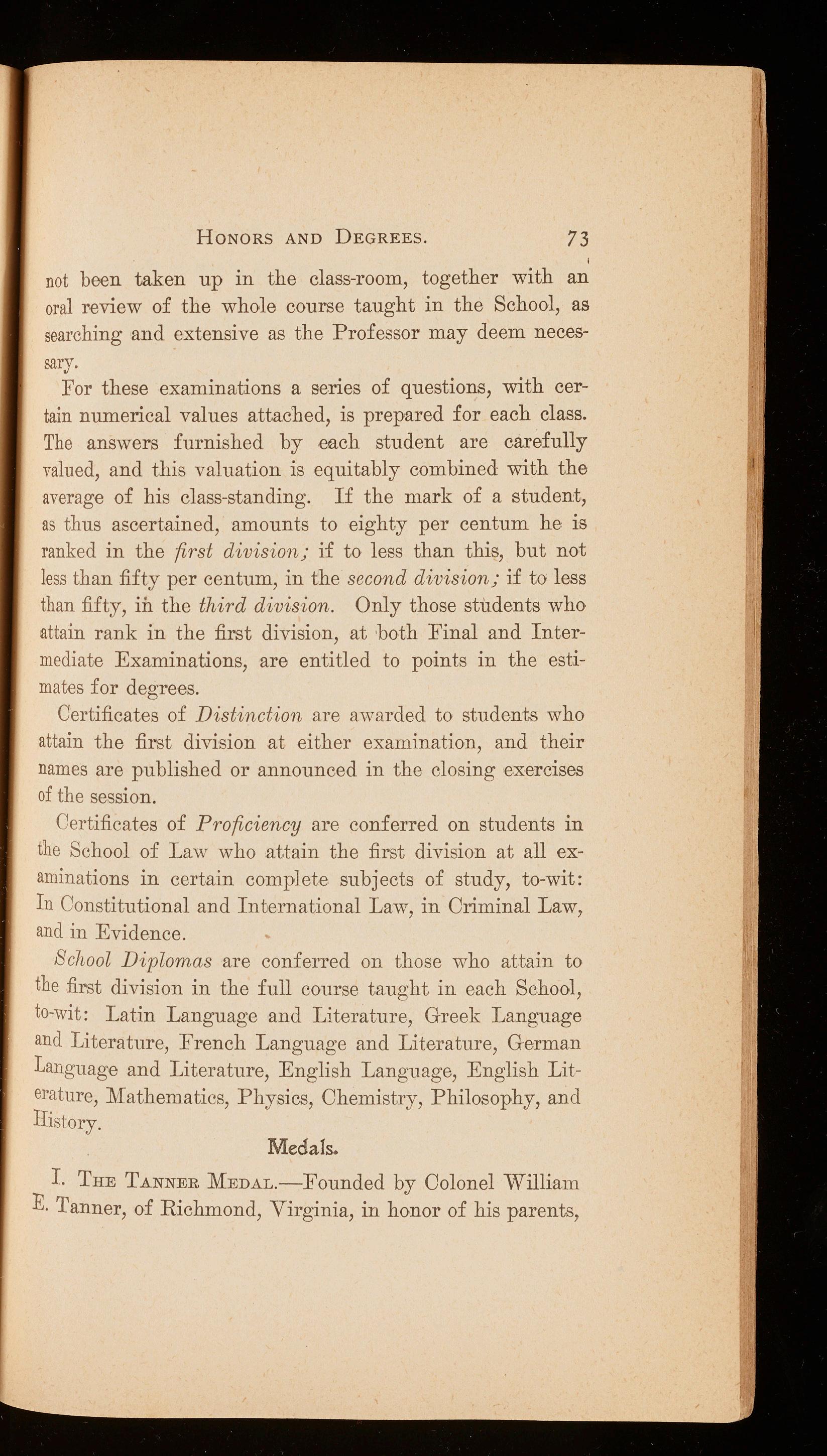
not been taken up in the class-room, together with an oral review of the who,le course taught in the School, as searching and extensive as the Professor may deem necessary.
For these examinations a series of questions, with certain numerical values attached, is prepared for each class. The answers furnished by each student are carefully valued, and this valuation is equitably combined with the average of his class-standing. If the mark of a student, as thus ascertained, amounts to eighty per centum he is ranked in the first division; if to less than this, but not lessthan fifty per centum, in t'he second division; if to less than fifty, in the third division. Only those students who attain rank in the first division, at ·both Final and Intermediate Examinations, are entitled to points in the estimatesfor degrees.
Certificates of Distinction are awarded to students who attain the first division at either examination, and their names are published or announced in the closing exercises of the session.
Certificates of Proficiency are conferred on students in the School of Law who attain the first division at all examinations in certain complete subjects of study, to-wit: In Constitutional and International Law, in Criminal Law, and in Evidence.
School Diplomas are conferred on those who attain to the first division in the full course taught in each School, to-wit: Latin Language and Literature, Greek Language and Literature, French Language and Lit ,erature, German Language and Literature, English Language, English Literature, Mathematics, Physics, Chemistry, Philosophy, and History. Medals.
I. THE TANNERMEDAL.-Founded by Colonel William E. Tanner, of Richmond, Virginia, in honor of his parents,
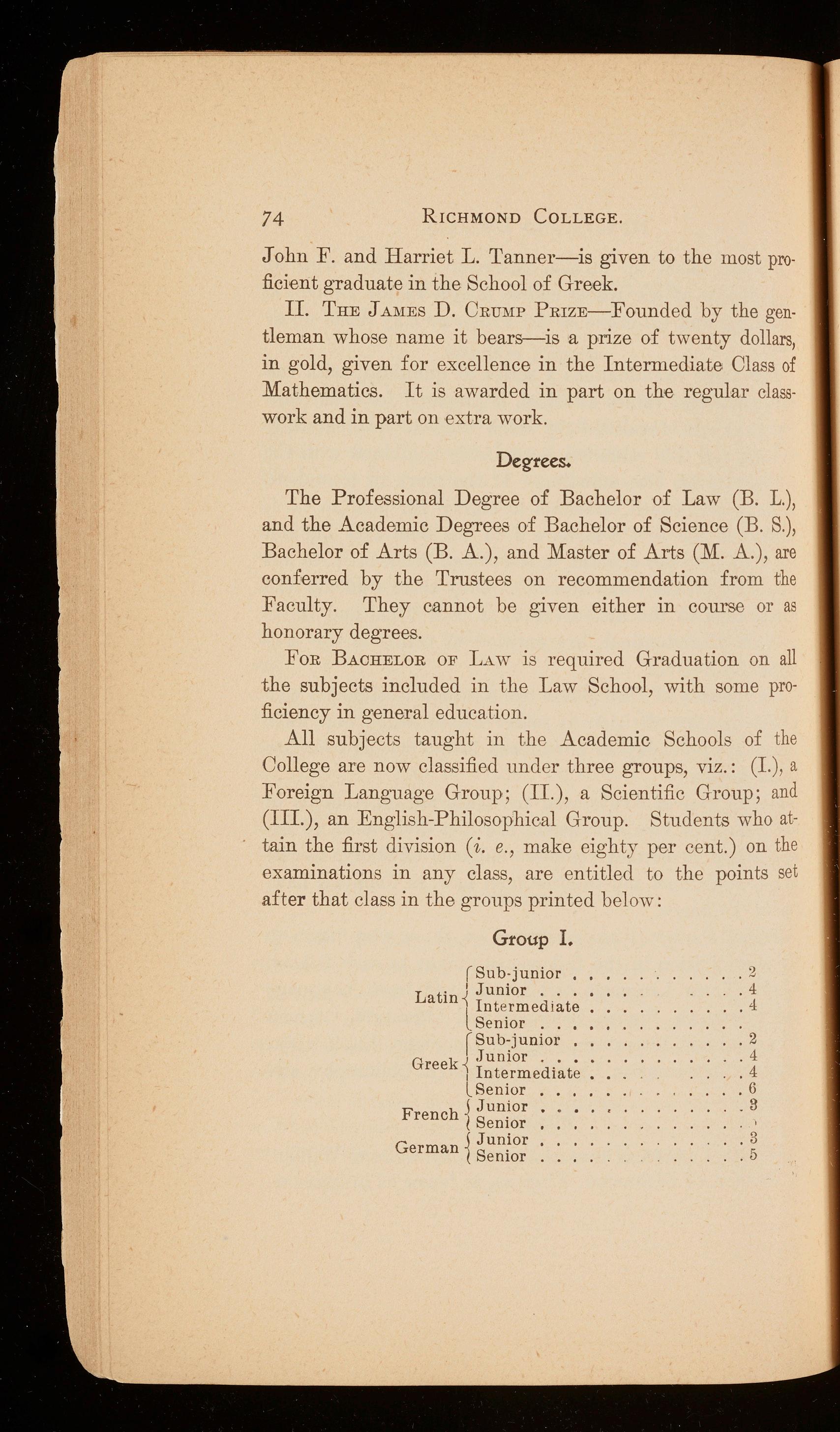
RICHMOND COLLEGE.
John F. and Harriet L. Tanner-is given to the most proficient graduate in the School of Greek.
II. THE J.A.MESD. CRUMPPmzE-Founded by the gentleman whose name it bears-is a prize of twenty dollars, in gold, given for excellence in the Intermediate Class of Mathematics. It is awarded in part on the regular classwork and in part on extra work.
Degrees.
The Professional Degree of Bachelor of Law (B. L.), and the Academic Degrees of Bachelor of Science (B. S.), Bachelor of Arts (B. A.), and Master of Arts (M. A.), are conferred by the Trustees on recommendation from the Faculty. They cannot be given either in course or as honorary degrees.
FoR B.A.CHELOROF LAw is required Graduation on all the subjects included in the Law School, with some proficiency in general education.
All subjects taught in the Academic Schools of the College are now classified under three groups, viz.: (I.), a Foreign Language Group; (II.), a Scientific Group; and (III.), an English-Philosopbical Group. Students who attain the first division (i. e., make eighty per cent.) on the examinations in any class, are entitled to the points set after that class in the groups printed below:
Group I.
18ub-junior , • Latinl' Junior . . · . ' Intermediate , Senior , , rsub-junior , . Greek-{

FoR BACHELOROF ScrnNCEis required eight points from Group I., thirty-two points from Group II., and eleven points, including Junior English and Junior Philosophy, fromGroup ill.
FoR BACHELOROF ARTS is required a total of seventy points,of which twenty-four points, including one diploma, mustcome from Group I.; fifteen points, including Junior Mathematics and Junior Physics, or Junior Chemistry, from Group II.; fifteen points, including Junior English and Junior Philosophy, from Group III. The remaining sixteenpoints may come from any or all of the groups.
The candidate for Bachelor of Science or Bachelor 0£ Arts must submit to the Faculty by May 1st of the year in whichhe expects to graduate, an oration or essay, composed by himself, which he shall deliver in public at the close 0£ the session, if so directed.
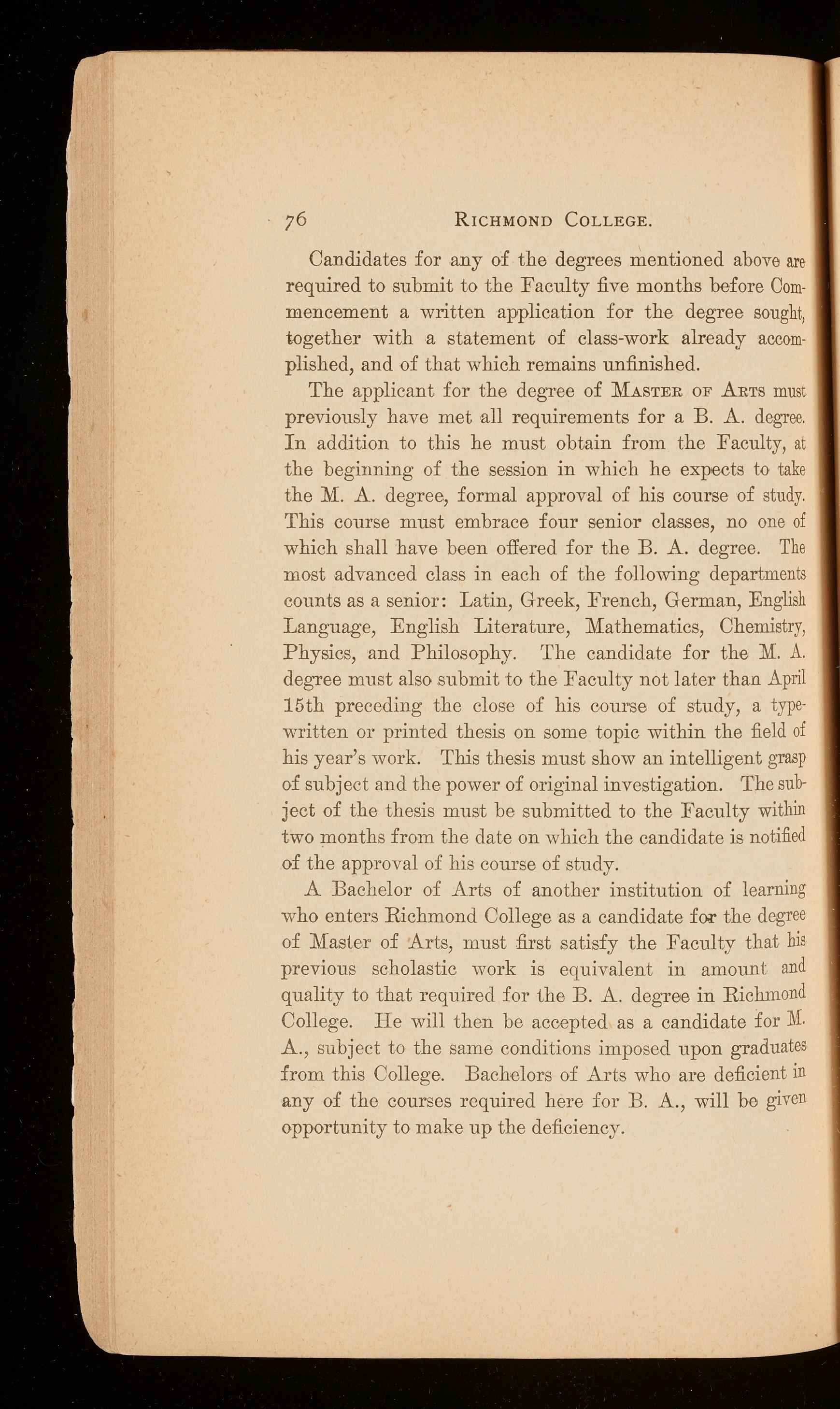
RICHMOND COLLEGE.
Candidates for any of the degrees mentioned above are required to submit to the Faculty five months before Commencement a written application for the degree sought, t-Ogether with a statement of class-work alr eady •accomplished, and of that which remains unfinished .
The applicant for the degree of MASTEROF ARTSmust previously have m€t all requirements for a B. A. degroo. In addition to this he must obtain from the Faculty, at the beginning of the session in which he expects to take the M. A. degree, formal approval of his course of study. This course must embrace four senior classes, no one of which shall have been offered for the B. A. degree. The most advanced class in each of the following departments counts as a senior: Latin, Greek, French, German, English Language, English Literature, Mathematics, Chemistry, Physics, and Philosophy. The candidate for the M. A. degree must also submit to the Faculty not later than April 15th preceding the close of his course. of study, a type· written or printed thesis on some topic within the field of his year's work. This thes i s must show an intelligent grasp of subject and the power of original investigation. The subject of the thesis must be submitted to the Faculty within two months from the date on which the candidate is notified of the approval of his course of study.
A Bachelor of Arts of another institution of learning who enters Richmond College as a candidate for the degree of Master of Arts, must first satisfy the Faculty that his previous scholastic work is equivalent in amount and quality to that required for the B. A. degree in Richmond College. He will then be accepted as a candidate for :M. A., subject to the same conditions imposed upon graduates from this College. Bachelors of Arts who are deficient in any of the courses required here for B A., will be given opportunity to make up the deficiency.
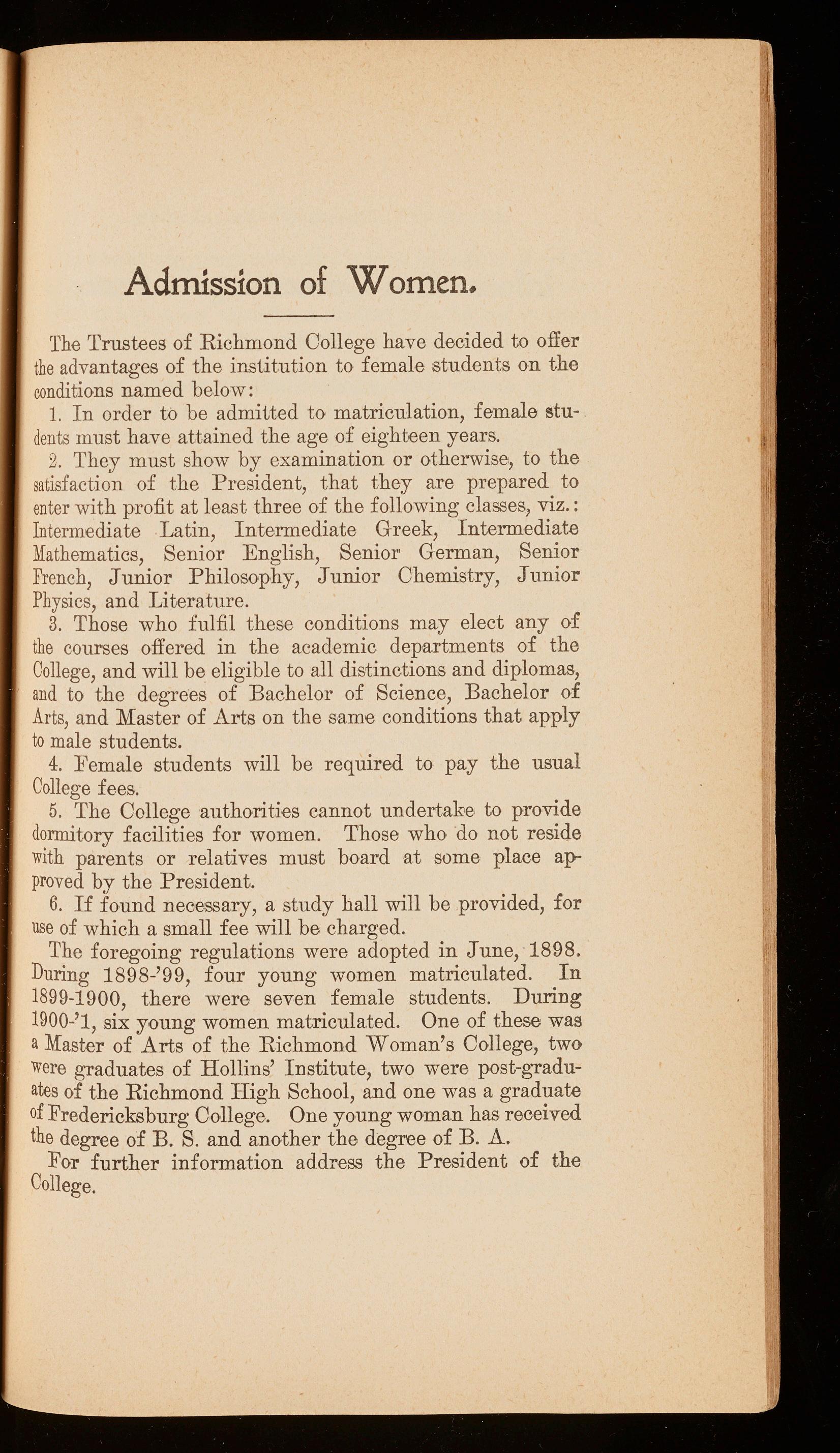
The Trustees of Richmond College have decided to offer theadvantages of the institution to female students on the conditionsnamed below:
1. In order to be admitted to matriculation, female stu- . dentsmust have attained the age of eighteen years.
2. They must show by examination or otherwise, to the satisfaction of the President, that they are prepared to enterwith profit at least three of the following classes, viz.:
Intermediate Latin, Intermediate Greek, Intermediate Mathematics, Senior English, Senior German, Senior French, Junior Philosophy, Junior Chemistry, Junior Physics,and Literature.
3. Those who fulfil these conditions may elect any 0£ the courses offered in the academic departments of the College,and will be eligible to all distinctions and diplomas, and to the degrees of Bachelor of Science, Bachelor of Arts,and Master of Arts on the same conditions that apply to male students.
4. Female students will be required to pay the usual Collegefees.
5. The College authorities cannot undertake to provide dormitory facilities for women. Those who do not reside with parents or relatives must board at some place approvedby the President.
6. If found necessary, a study hall will be provided, for useof which a small fee will be charged.
The foregoing regulations were adopted in June, 1898. During 1898-'99, four young women matriculated. In 1899-1900, there were seven female students. During 1900-'1,six young women matriculated. One of these was a Master of Arts of the Richmond Woman's College, two weregraduates of Hollins' Institute, two were post-graduatesof the Richmond High School, and one was a graduate ofFredericksburg College. One young woman has received the degree of B. S. and another the degree of B. A.
For further information address the President of the College.
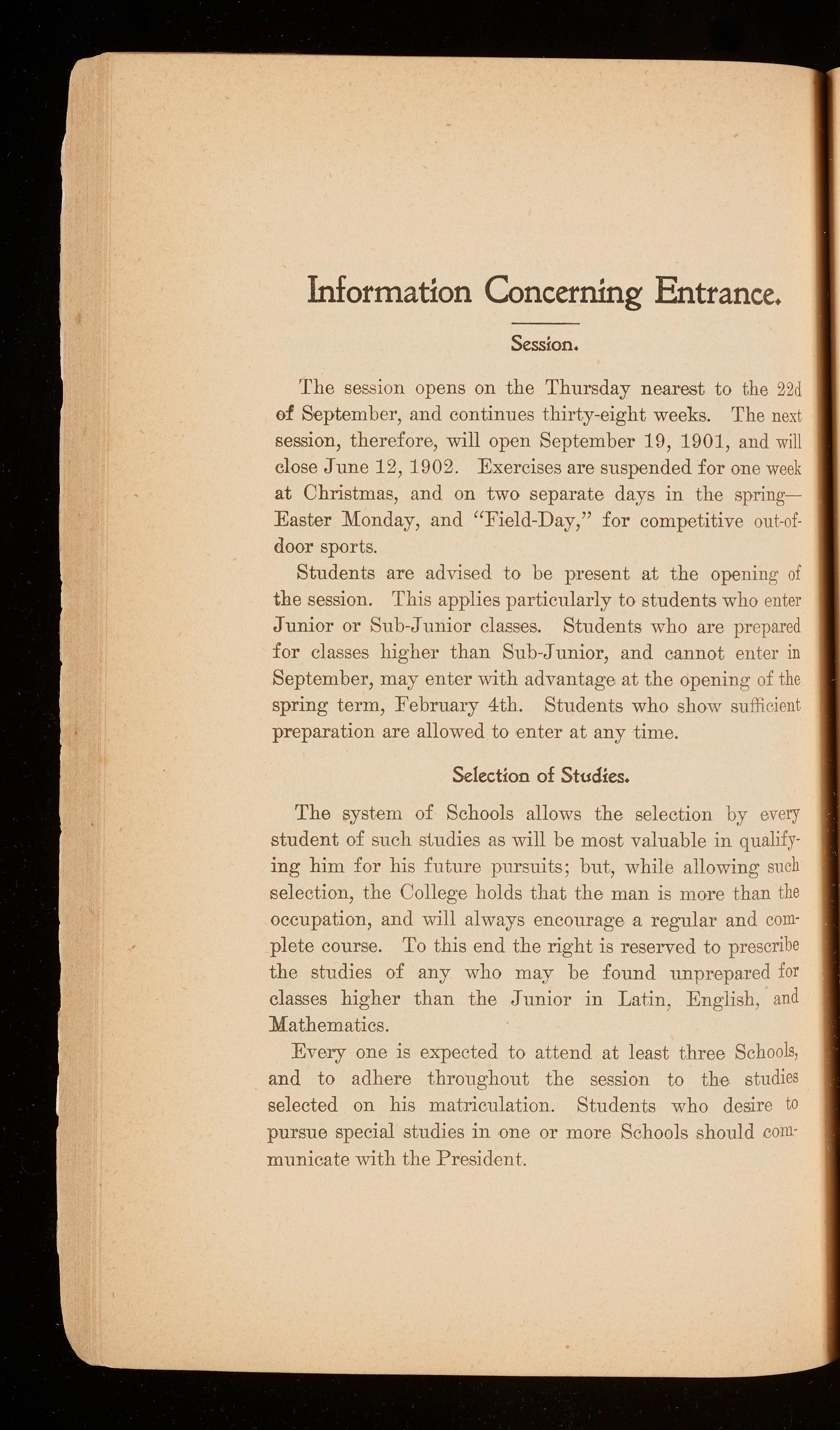
S ession.
The session opens on the Thursday nearest to the 22d of September, and continues thirty-eight weeks. The next session, therefore, will open September 19, 1901, and will close June 12, 1902. Exerc ises are suspended for one week at Christmas, and on two separate days in the springEaster Monday, and "Fie l d-Day," for competitive out-ofdoor sports.
Students are advised to be present at the opening of the session This applies particularly to students who enter Junior or Sub-Junior classes. Students who are prepared for classes higher than Sub-Junior, and cannot enter in September, may enter with advantage at the opening of the spring term, February 4th . Students who show sufficient preparation are allowed to enter at any time.
The system of School s allows the selection by every student of such studies as will be most valuable in qualifying him for his future pursuits; but, while allowing such selection, the College holds that the man is more than the occupation, and will always encourage a regular and complete course . To this end the right is reserved to prescribe the studies o:f any who may be found unprepared for classes higher than the Junior in Latin, English, and Mathematics.
Every one is expected to attend at least three Schools, and to adhere throughout the session to the studies selected on his matriculation. Students who desire to pursue special studies in one or more Schools should communicate with the President.
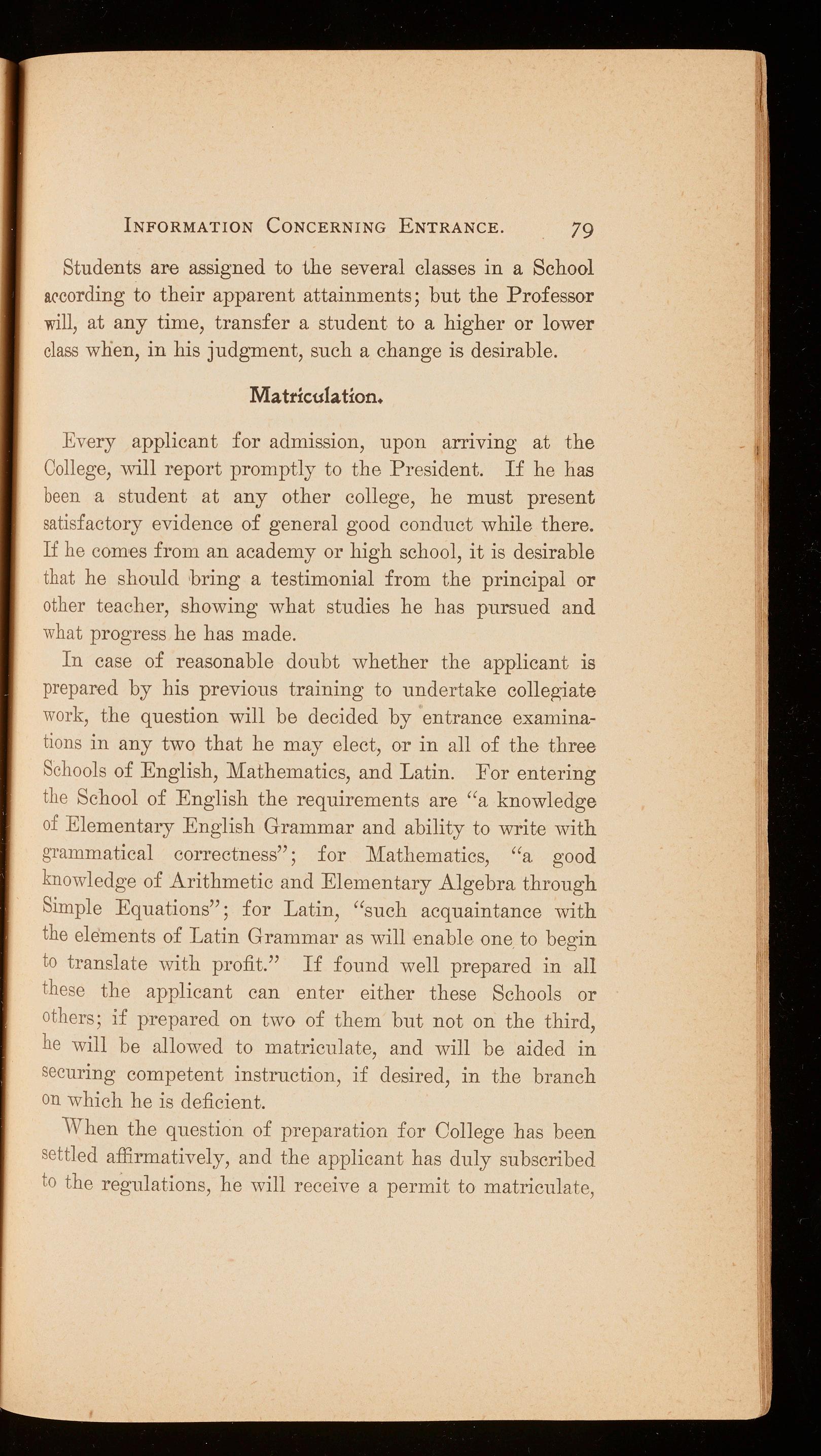
Students are assigned to the several classes in a School aC'cordingto their apparent attainments; but the Professor will, at any time, transfer a student to a higher or lower classwhen, in his judgment, such a change is desirable.
Every applicant for admission, upon arnvmg at the College, will report promptly to the President. If he has been a student at any other college, he must present satisfactory evidence of general good conduct while there. If he comes from an academy or high school, it is desirable that he should bring a testimonial from the principal or other teacher, showing what studies he has pursued and what progress he has made.
In case of reasonable doubt whether the applicant is prepared by his previous training to undertake collegiate work, the question will be decided by entrance examinations in any two that he may elect, or in all of the three Schools of English, Mathematics, and Latin. For entering the School of English the requirements are "a knowledge of Ele mentary English Grammar and ability to write with grammatical correctness"; for Mathematics, "a good knowledge of Arithmetic and Elementary Algebra through Simple Equations"; for Latin, "such acquaintance with the elements of Latin Grammar as will enable one to begin to translate with profit." If found well prepared in all these the applicant can enter either these Schools or others; if prepared on two of them but not on the third, he will be allowed to matriculate, and will be aided in securing competent instruction, if desired, in the branch on which he is deficient.
\Vhen the question of preparation for College has been settled affirmatively, and the applicant has duly subscribed to the regulations, he will receive a permit to matricul ate,

RICHMOND COLLEGE.
and, upon presentation of this to the Treasurer of the College and payment of the required fees, his name will be placed on the rolls.
For statement concerning the matriculation of ·women, see special announcement on "Admission of Women."
Expenses.
Matriculation Fee. -Including entrance fees, . use of public rooms, attendance, and all college privileges, $18.50. This fee must be paid at entrance, is not subject to deduction, nor in any case refunded. Students entering after Febniary 1st, pay half of this fee.
Tuition.-In one school, $25; in two, $50; in three, $70; in four or more, $80. Tuition fees are payable onehalf on entrance, the balance first of February, subject to Fuel, Lights, and Laundry cost from $2 to $2.50 deduction for time lost by late entrance or by sickness, if the time so lost be two consecutive months or more, but not subject to deduction for other cause or for less time. a month.
Board.-Excellent table board is furnished at the College Refectory at a cost of $10 a month. The Refee· tory is a handsome brick building, located on the campus, and is in charge of an experienced matron, appointed by the President. The seat ing capac ity of the hall is one hun· dred. Prompt payment of bills by the middle of every month is required.
A new boarding-hall was opened five years ago, in which table-board was to be furnished at $7.50 a month. There has been no complaint of the fare, but, on the contrary, constant expressions of surprise thut such abundant and appetizing food could be served at such a price. Further improvements make the accommodations of this hall su:ffident for seventy boarders. Students who desire table
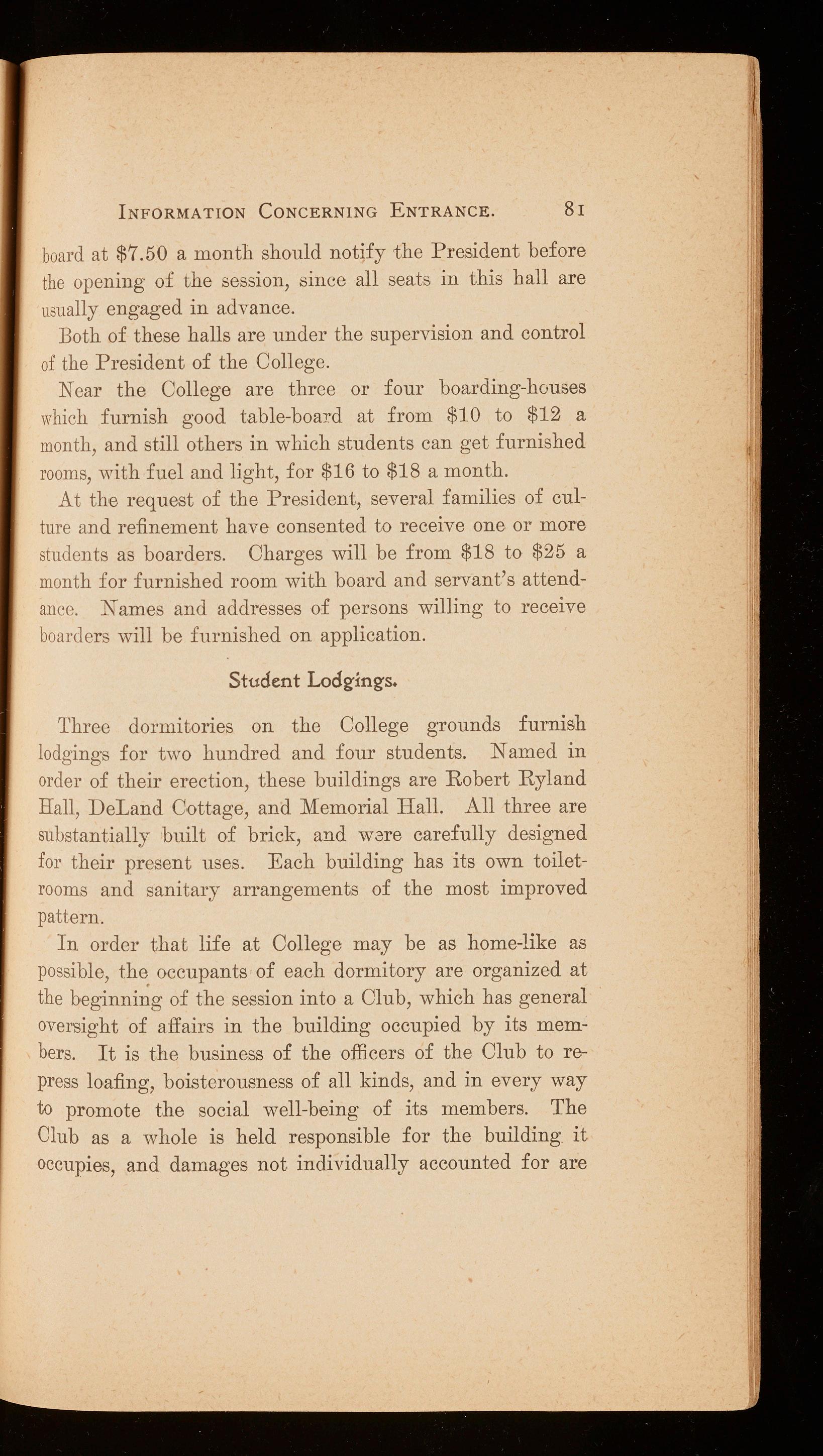
81
boardat $7.50 a month should notify the President before the opening of the session, since all seats in this hall are usually engaged in advance.
Both of these halls are under the supervision and control of the President of the College.
Near the College are three or four boarding-houses which furnish good table-boa:rd at from $10 to $12 a month, and still others in which students can get furnished rooms,with fuel and light, for $16 to $18 a month.
At the request of the President, several families of culture and refinement have consented to receive one or more students as boarders. Charges will be from $18 to $25 a month for furnished room with board and servant's attendance. Names and addresses of persons willing to receive boarders will be furnished on application.
Three dormitories on the College grounds furnish lodgings for two hundred and four students. Named in order of their erection, these buildings are Robert Ryland Hall, DeLand Cott age, and Memorial Hall. All three are substantially built of brick, and ware carefully designed for the ir present uses. Each building has its own toiletrooms and sanitary arrangements of the most improved pattern.
In order that life at College may be as home-like as possible, the occupants of each dormitory are organized at the beginni~g of the session into a Club, which has general oversight of affairs in the building occupied by its members. It is the business of the officers of the Club to repress loafing, boisterousness of all kinds, and in every way to promote the social well-being of its members. The Club as a whole is held responsible for the building it occupies, and damages not individually accounted for are
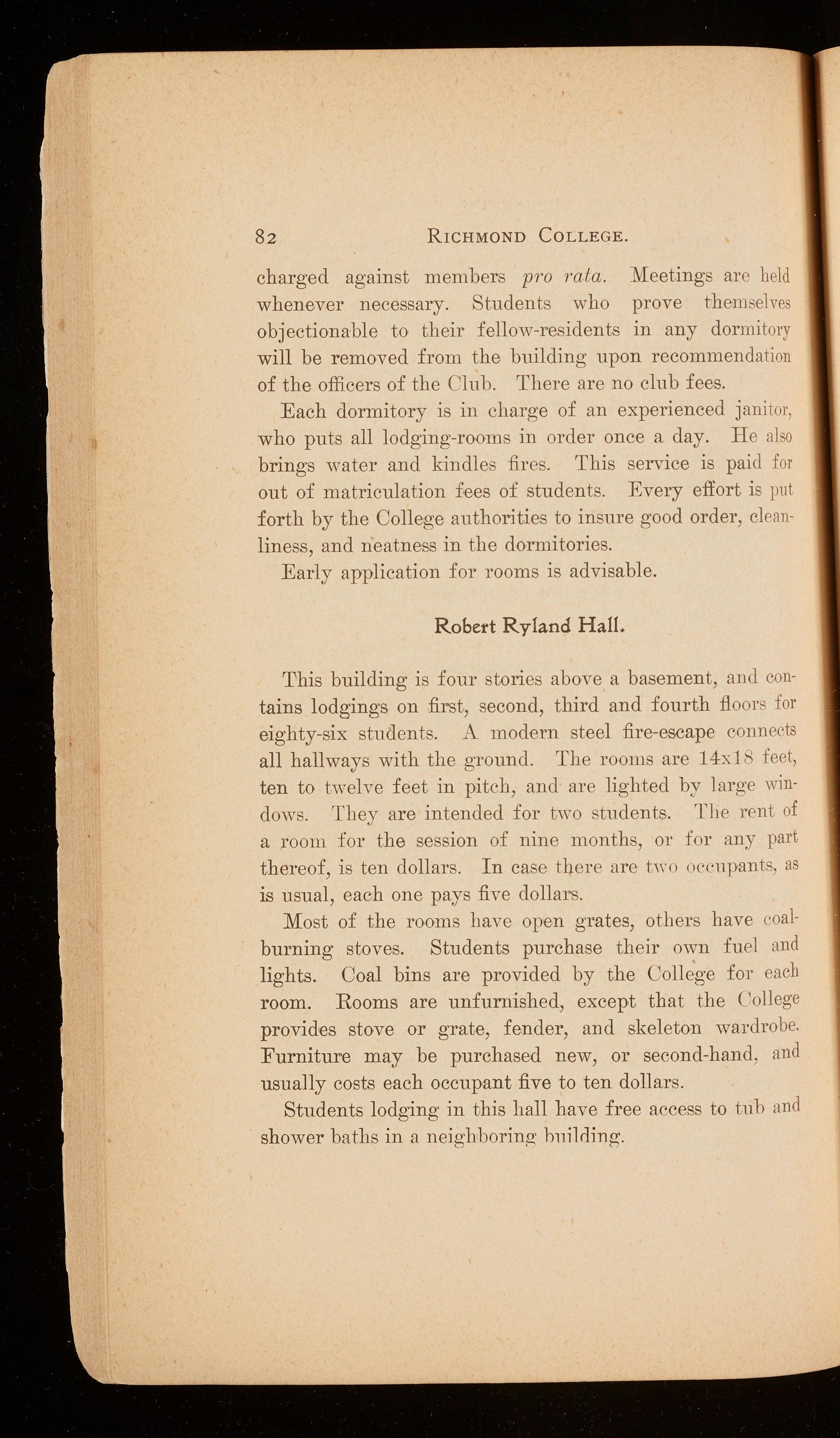
charged against m embers pro rata. Meetings are held whenever necessary. Students who prove themselves objectionable to their fellow-residents in any dormitory will be removed from the building upon recommenda tion of the officers of the Club. There are no club fees.
Each dormitory is in charge of an experienced janitor, who puts all lodging-room s in order once a day. He also brings water and kindles fires. This service is paid for out of matriculation :foes of students. Every effort is put forth by the College authorities to insure good order, cleanliness, and neatness in the dormitories.
Early application for rooms is advisable.
Robert Ryland Hall.
This building is four stories above a basement, and contJ:lins lodgings on first, second, third and fourth floors for eighty-six students. A modern steel fire-escape connects all hallways with the ground. The rooms are 14x1 8 feet, ten to brnlve feet in pitch, and are lighted b:v larg e windows. The y are intended for two students. The rent of a room for the session of nine months, or for any part thereof, is ten dollars. In ease there are hrn oe(·npants, as is usual, each one pays fo-e dollars.
Most of the rooms have open grates, others have eoalburning stoves. Students purchase their own fuel and lights. Coal bins are provided by the College for each room. Rooms are unfurnished, except that the College provides stove or grate, fender, and skeleton wardrob e. Furniture may be purchased new, or second-hand, and usually costs each occupant five to ten dollars.
Students lodging in this hall have free access to tub and shower baths in a neighboring- hniloing.
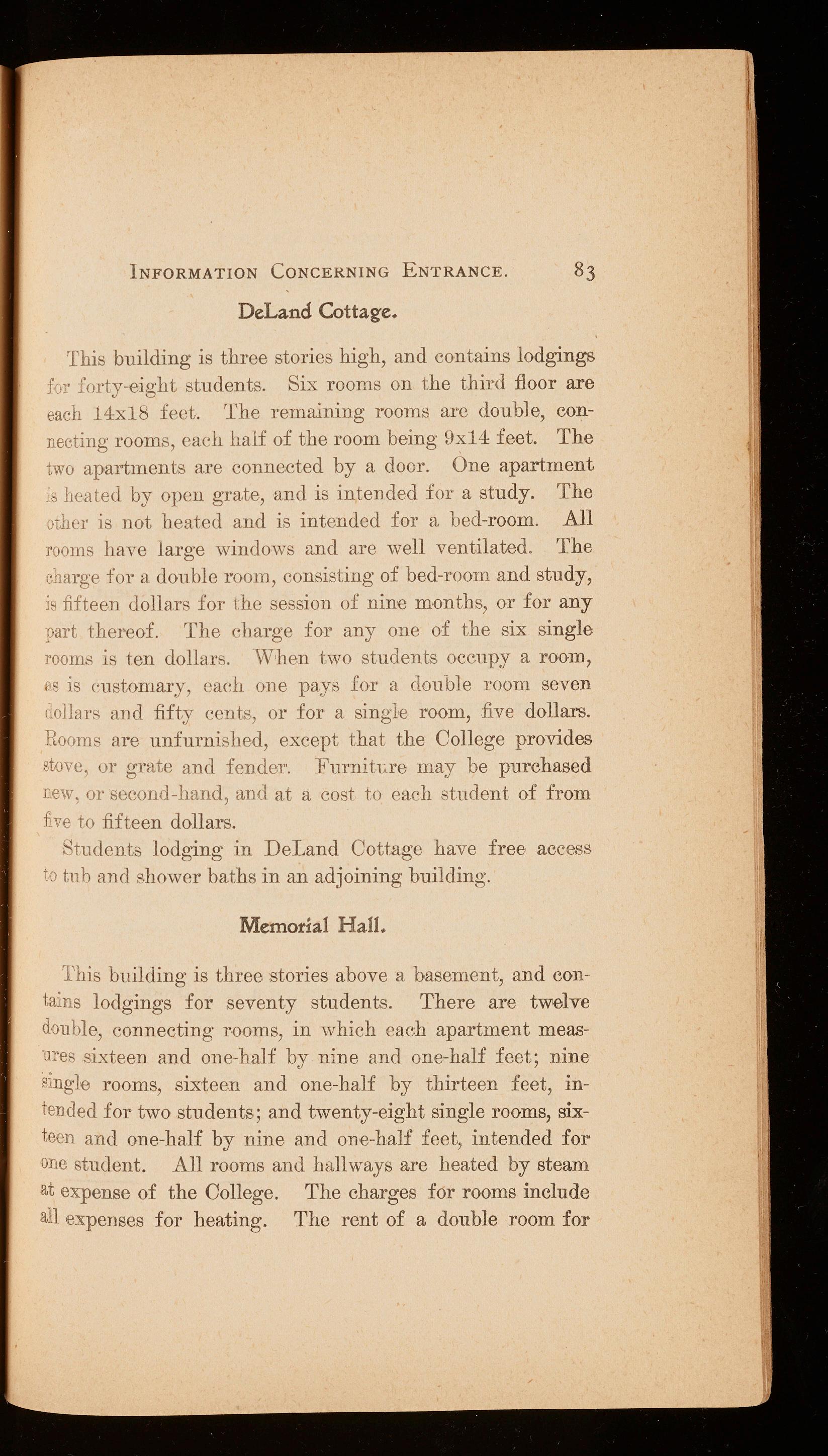
This building is three stories high, and contains lodgings for fmiy-"eight students. Six rooms on the third floor are each 14x18 feet. The remaining rooms are double, connecting room s , each half of the room being 9x14 feet. The two apartment s are connected by a door. One apartment ib heate <l by open grate, and is intended for a study. The other is not heated and is intended for a bed-room. All rooms have large window s and are well ventilated. The charg e for a double room, consisting of bed-room and study, i, fifte en dollars for th e session of nine months, or for any part thereof. The eharge for any one of the six single room.,,is ten dollar s When two student s occupy a room, as is n1stomary, each one pays for a double r oom seven dollar s and fifty cent s, or for a single room, five dollars. Rooms are unfurni sh ed, except that the College provides stove, or gr at e and fe nd er. :Furnit 1,.re may be purchased new, or secon d-ha nd, and at a cost t o each student of from five to fifteen dollars.
Students lodging in DeLand Cottage have free access to t11 h and shower baths in an adjoining building.
This building is three stories above a basement, and contains lodgings for seventy students. There are twelve double, connecting rooms, in which each apartment measures sixteen and one-half by nine and one-half feet; nine single rooms, sixteen and one-half by thirteen :feet, intended for two students; and twenty-eight single rooms, sixteen and one-half by nine and one-half feet, intended for one student. All rooms and hall ways are heated by steam at expense of the College. The charges for rooms include all expenses for heating. The rent of a double room for
RICHMOND COLLEGE.
session of nine months, or for any part thereof, is forty dollars; for single room for two students, thirty-two dollars; for single room for one student, twenty-five dollars. When two students occupy a room, each pays half the rent. Students lodging in Memorial Hall have free access to tub and shower baths in the building. A few rooms may be had furnished or unfurnished. The charge for use of furniture is eight dollars for session of nine months, or four dollars for each of two occupants. Students ·who rent a furnish room need to provide only bed-clothing and foilet articles.
Summary of Expenses for an Academic
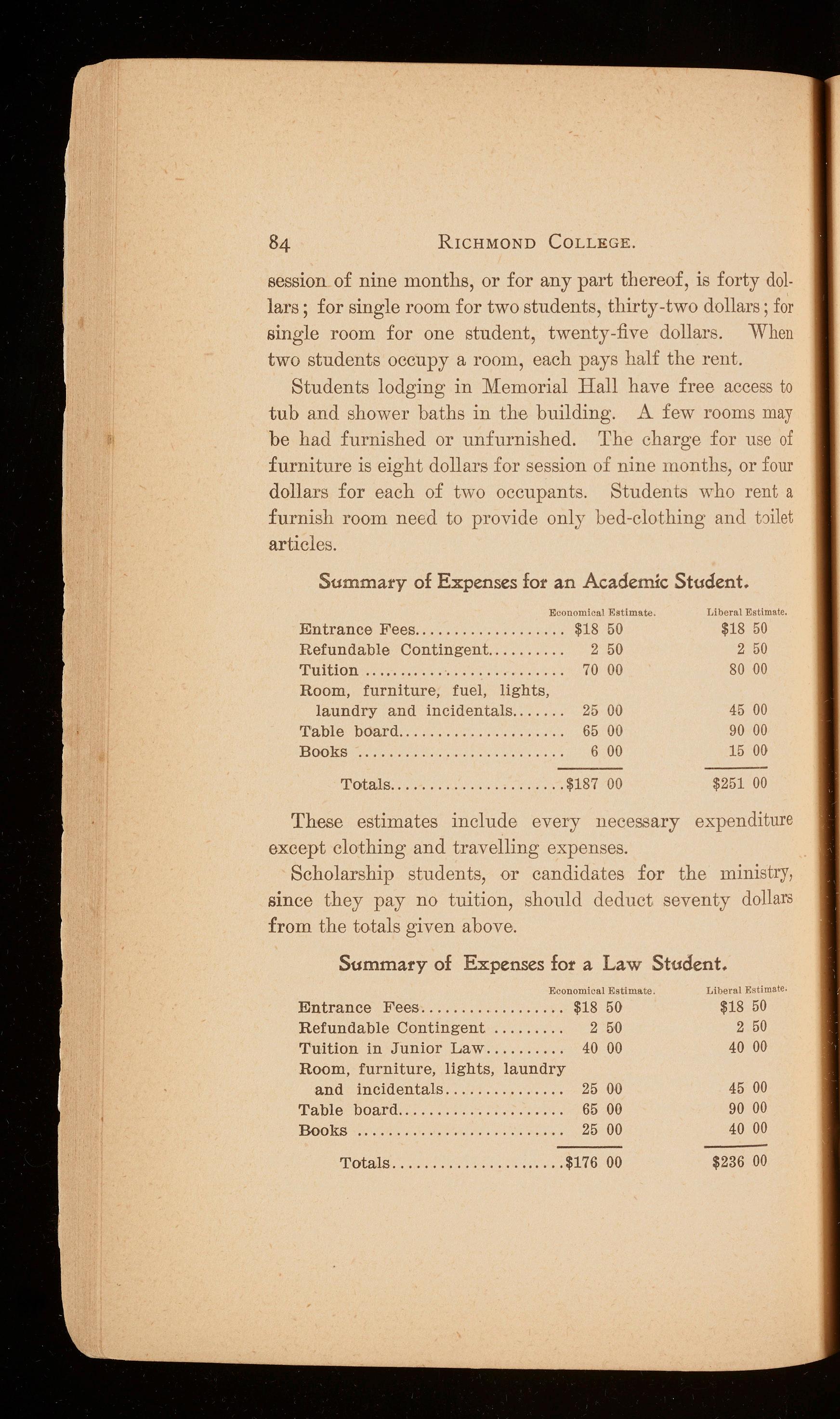
These estimates include every necessary expenditure except clothing and travelling expenses.
Scholarship students, or candidates for the ministry, since they pay no tuition, should deduct seventy dollars from the totals given above.
Summary of Expenses for a Law
Students in Senior Law should add fifteen dollars to totals in foregoing table in order to obtain estimate of their expenses.
Summary of Expenses for an Academic Student who Resides in Richmond.
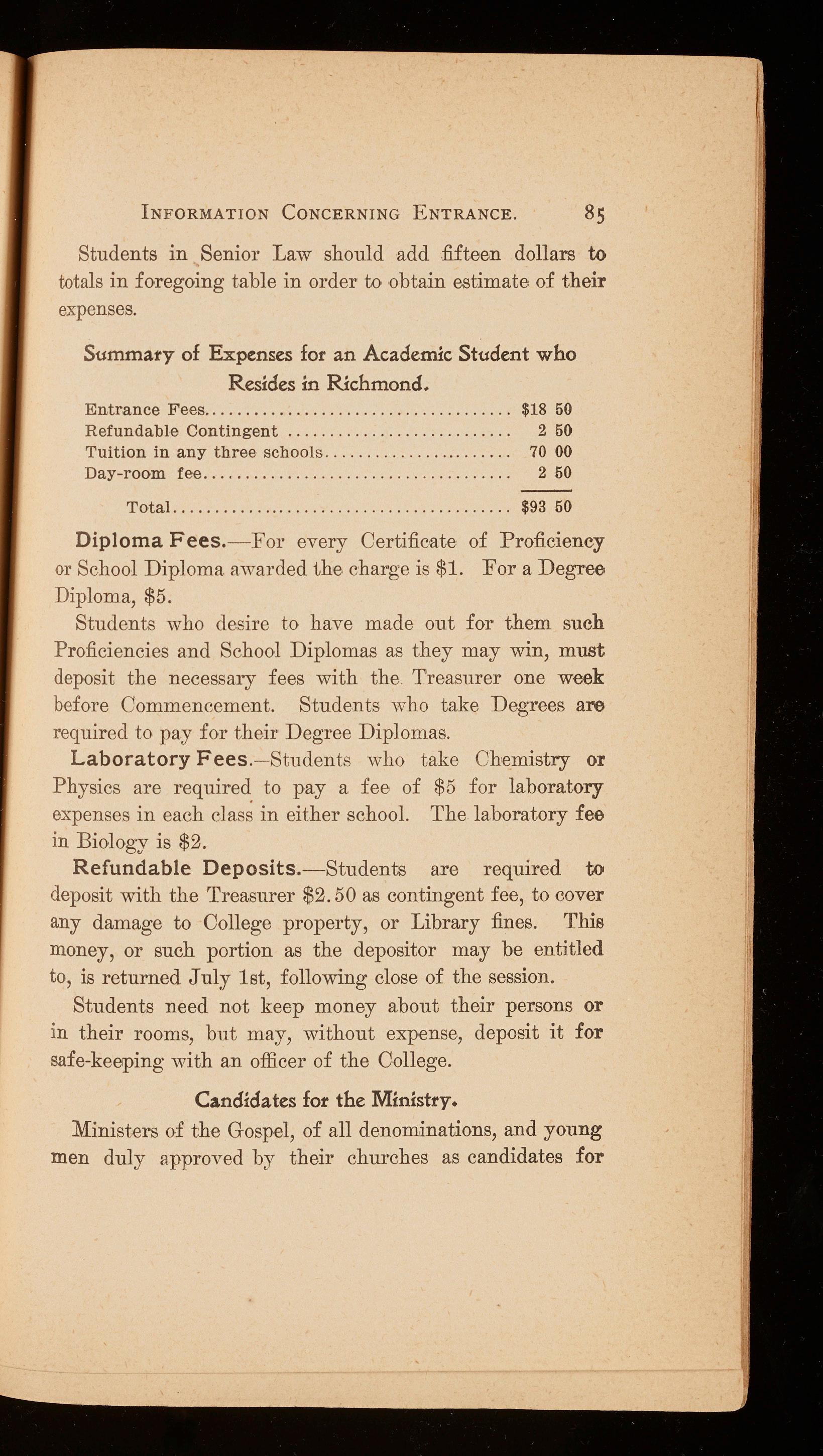
Diploma Fees.-For every Certificate of Proficiency or School Diploma awarded the charge is $1. For a Degree Diploma, $5.
Students who desire to have made out for them such Proficiencies and School Diplomas as they may win, must deposit the necessary fees with the Treasurer one week before Commencement. Students who take Degrees are required to pay for their Degree Diplomas.
Laboratory Fees.-Students who take Chemistry or Physics are required to pay a fee of $5 for laboratory expenses in each clas~ in either school. The laboratory fee in Biology is $2.
Refundable Deposits.-Students are required t.o deposit with the Treasurer $2. 50 as contingent fee, to cover any damage to College property, or Library fines. This money, or such portion as the depositor may be entitled to, is returned July 1st, following close of the session.
Students need not keep money about their persons or in their rooms, but may, without expense, deposit it for safe-keeping with an officer of the College.
Ministers of the Gospel, of all denominations, and young men duly approved by their churches as candidates for
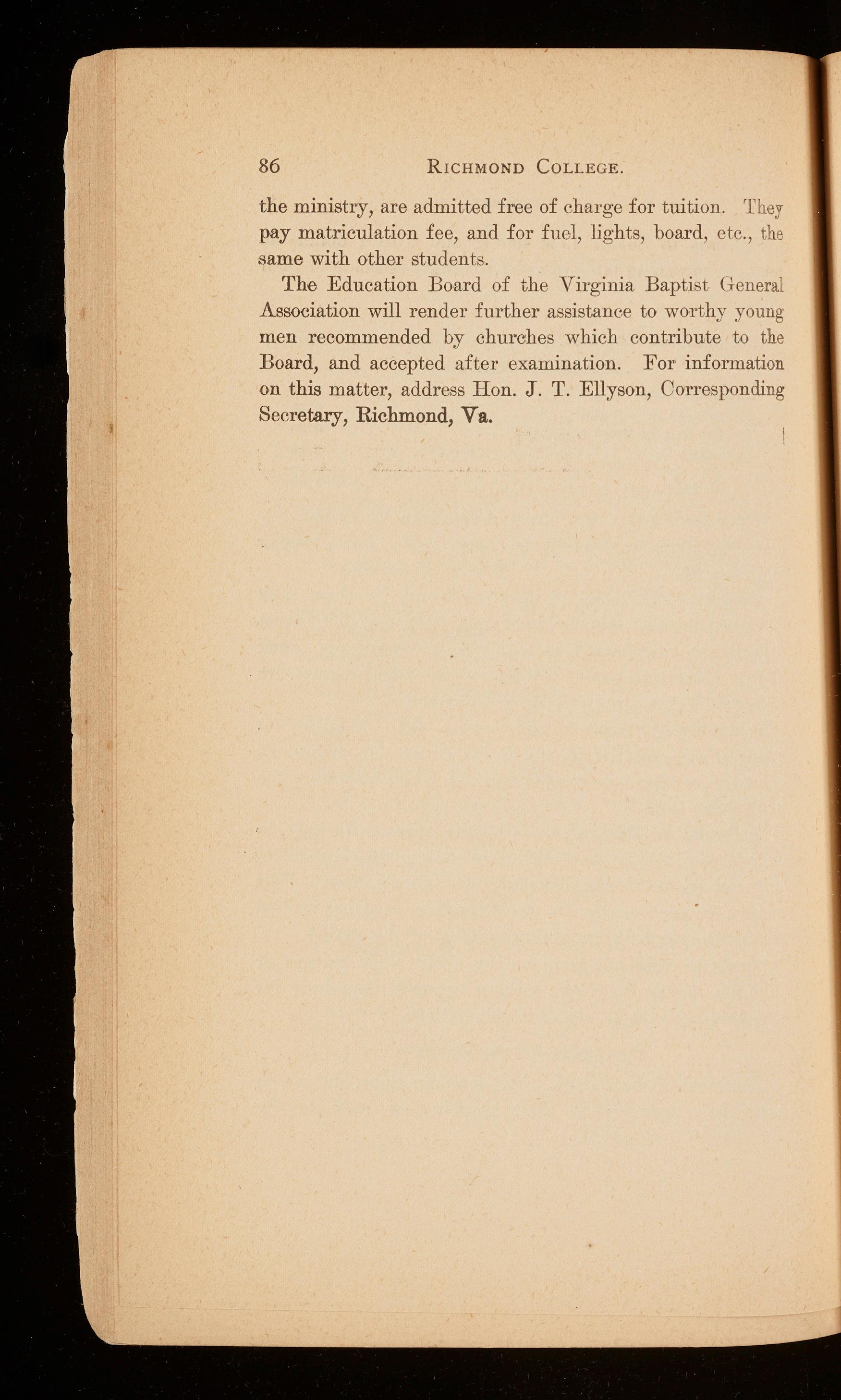
the ministry, are admitted free of charge for tuition. T hey pay matriculation fee, and for fuel, lights, board, et c., the same with other students.
The Education Board of the Virginia Baptist Gen eral Association will render further assistance to worthy young men recommended by churC'hes which contribute to the Board, and accepted after eX:amination. For information on this matter, address Hon. J. T. Ellyson, 001·responding Secretary, Richmond,Va.
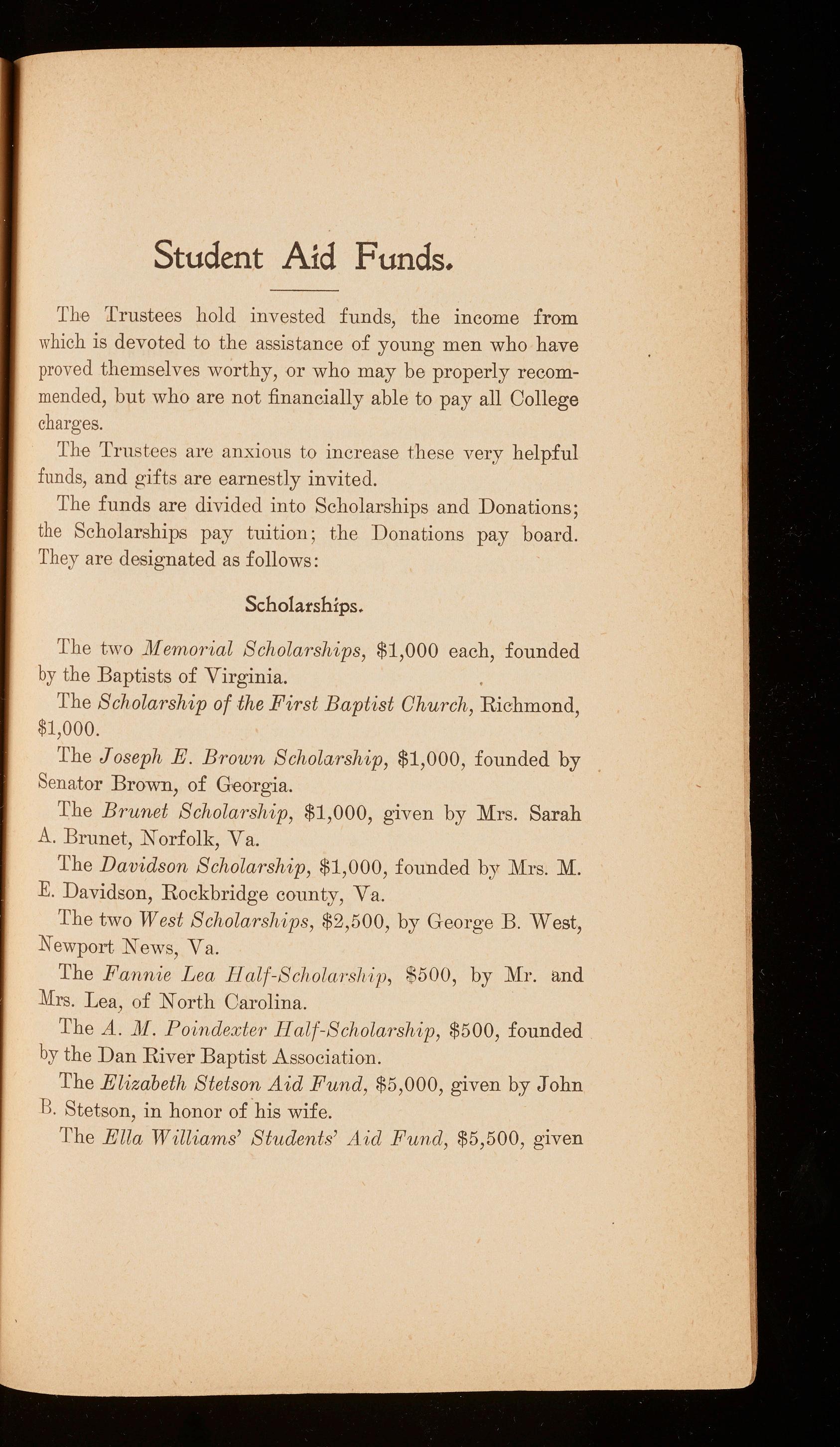
The Trustees hold invested funds, the income from which is devoted to the assistance of young men who have proved themselves worthy, or who may be proper l y recommended, but who are not financially able to pay all Coll ege charges.
The Trustees are anxious to increase these very he l pful funds, and gifts are earnestly invited.
The funds are divided into Scholarsh ips and Donations; the Scholarships pay tuition; the Donations pay board . They are designated as follows:
Scholarsh ips .
The two Memo1'ial Scholarships, $1,000 each, founded by the Baptists of Virginia.
The Schola1·ship of the First Baptist Church, Richmond, $1,000.
The Joseph E. Brown Scholarship, $1,000, fo un ded by Senator Brown, of Georgia.
The Brunet Scholarship, $1,000, given by Mrs. Sarah A. Brunet, Norfolk, Va.
The Davidson Scholarship, $1,000, founded by Mrs. M. E. Davidso n , Rockbridge county, Va.
The two West Scholarships, $2,500, by George B. West, Newport News, Va.
The Fannie Lea Half-Scholarsfi ,ip, ~500, by Mr. and Mrs.Lea, of North Oai·olina.
The A. JJ1.Poindexter IIalf'-Scholarship, $500, fo u nded by the Dan River Baptist Association.
The Elizabeth Stetson Aid Fund, $5,000, given b,y John B, Stetson, in honor of ,his wife.
The Ella Williams' Students' Aid Fund, $5,500, given

RICHMOND COLLEGE.
by the late Thomas 0. Williams, of Richmond , in memory of his daughter.
The William H awlcins' Fimd, $2,000, founded by the gentleman whose name it bears, to aid in educating godly, studious, deserving young men.
The Chambers Sisson Scholarship, $1,000, founded by the gentleman whose name it bears.
The J. B. Jeter Scholarship, $1,200, bequest of Mrs. Mary C. Jeter, in memory of her husband, Rev. J. B. Jeter, D. D., one of the founders of the College, and long president of the corporation.
The Elizabeth R. West Fund, $2,000, established by Mr. George B. West, of Newport News, Va.
The H. Evelina W allcer Scholarship, $1,200.
The G1-tsta11xusKillliiser Sclwlarsliip, $1,000, used for the benefit of the Richmond High School.
The Sarah B. Watson Scholarship, of $1,000, founded by Mr. George B. West, of Newport News, Va.
Hon. J. L. M. Curry has transferred to the College his copyright interest in two books, "William Ewart Gladstone" and "Southern States of the American Union," the same to be held and the income used for Scholarship purposes.
The donations, used mainly to help young men studying for the Gospel ministry of the Baptist denomination, to be paid on their board or for general expenses. Their application is not confined to young men from Virginia.
The Woolverton Donation, $1,000, founded by George A. Woolverton, of Albany, N. Y.
The John Tabb Donation, $1,200, founded by Thomas Tabb, Hampton, Va., in memory of his father.

The Mathew T. Yates Donation, $1,300, given by the Rev. Dr. M. T. Yates, missionary, Shanghai, China, "to help educate young men who shall continue to preach after my voice is hushed."
The Joseph B. Hoyt Fund, $5,000, given by the deceasedfriend whose name it bears, of Stamford, Conn.
The William A. Gray Donation, $1,200, founded by William B. Gray, M. D., of Richmond, Va., in memory of his father, a distinguished Christian physician of Fluvanoo.county.
The Lulie L. Pollard Donation, $2,500, founded by Thomas F. Pollard, of New York city, in honor of his wife.
The Mattie Schmelz Donation, $1,000, founded by Henry L. and George A. Schmelz, of Hampton, Va., in memory of Mrs. Henry L. Schmelz.
All of these donations have conditions attached, which are filed with the bonds, for the guidance of the Trustees.
Recent Action of Trustees.
1. The Trustees have ordered that Scholarships or Donations may be named only when the Fund given amounts to $1,000.
2. That a "Memorial Aid Fund" shall · be established, into which shall go all gifts of less than $1,000. It . is promised that a careful record of the names of donors shall be kept.
3. That the President and Financial Secretary be authorized to receive money for the establishment of Fellowships, the income of which shall be used to assist meritorious Bachelors of Arts who desire to take the degree of Master o{ Arts. No Fellowship shall amount to less than $1,500.
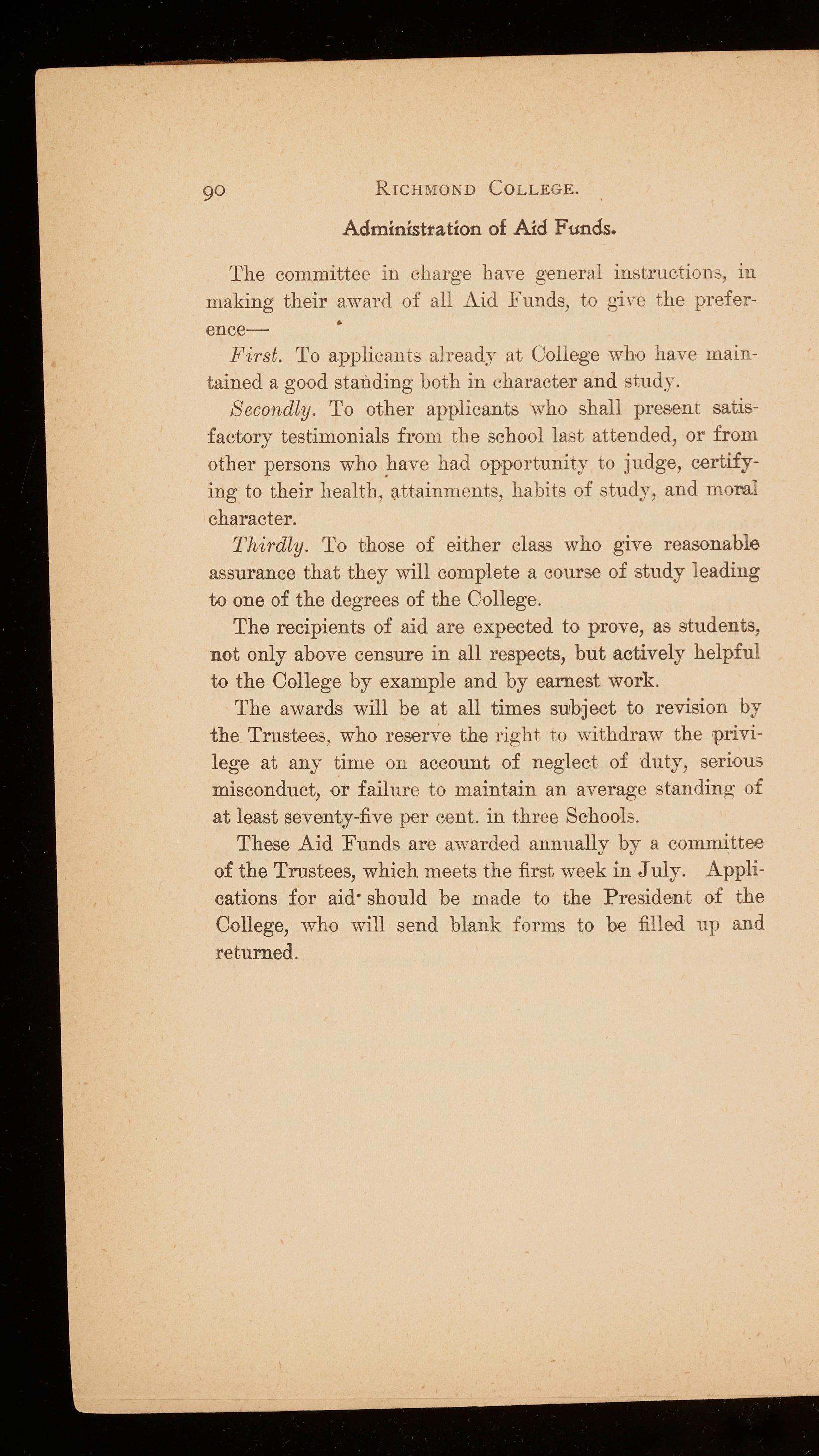
RICHMOND COLLEGE.
The committee in charge haYe general instruction:,, m making their award of all Aid Funds, to give the preference--
First. To applicants already at College who have maintained a good standing both in character and study.
Secondly. To other applicants who shall present satisfactory testimonials from the school last attended, or from other persons who p.ave had opportunity to judge, certifying to their health, :;ittainments, habits of study, and morel character.
Thirdly. To those of either class who give reasonable assurance that they will complete a course of study leading to one of the degrees of the College.
The recipients of aid are expected to prove, as students, not only above censure in all respects, but , actively helpful to the College by example and by earnest work.
The awards will be at all times subject to revision by the Trustees, who reserve the right to withdraw the privilege at any time on account of neglect of duty, serious misconduct, or failure to maintain an average standing- of at least seventy-five per cent. in three Schools. These Aid Funds are awarded annually by a committee of the Trustees, which meets the first week in July. Applications for aid· should be made to the President of the College, who will send blank forms to be filled up and returned.
II. III. IV , ,c_ v. Four hours a week additional in each class will be assigned by the Professors of Chemistry, Pl1yslcs, and Biology for laboratory work , The class In English Bible meets In two sections, the course being the same in each section. The class in Astronomy will meet at hours to be designated by the Professor . All Law Classes meet between 4:00 P. M. and 7:00 P. M.
I. some of tile smaller c lasses may be moved to suit special cases.
--NOTES.--
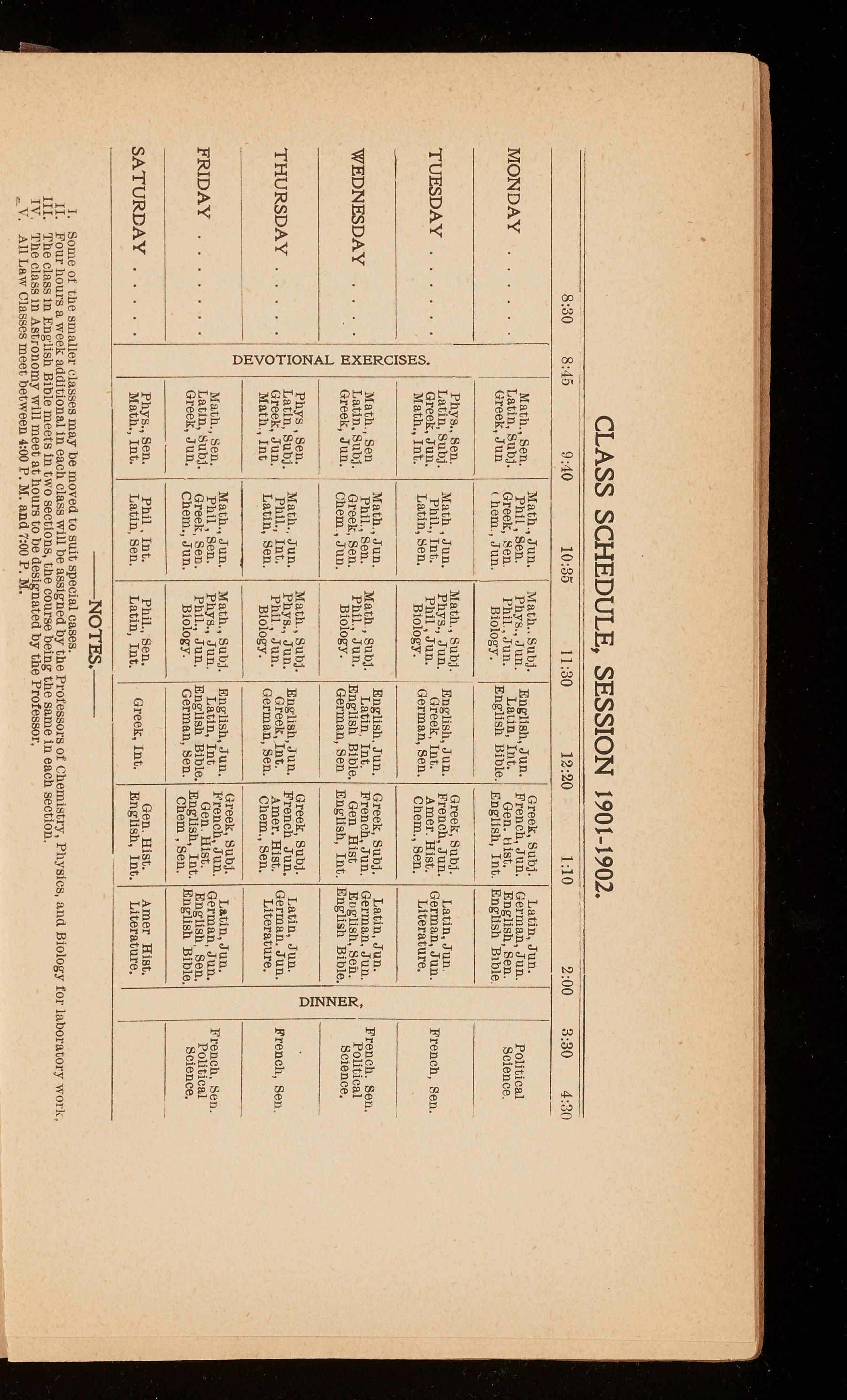
SATURDAY
Phys., sen. Phil, Int. Phil., Sen. Greek, Int. Gen. Hist. Amer Hist. Math., Int. Latin, Sen. Latin, Int. Engl!sh, Int. Literature.
FRIDAY
0
Math . , Int Latin, Sen. Biology. German, sen. Chem., Sen. Literature. CiIll> Greek, Subj. Math., Jun. Math., Subj. Engl!sh, Jun. Latln,Jun. Math., Sen. Phil' Sen. Phys., Jun. Latin, Int French, Jun. German, Jun. French. Sen.
Latin, Subj. Greek, Sen. Phll., Jun. English Bible. Gen. Hist. Engl!sh. Sen. Pol!tlcal Greek, Jun. Chem., Jun. Biology. German, Sen. Engl!sh, Int. Engl!sh Bible. Science. Chem, Sen. -------
THURSDAY ;..
Greek, Jun . Phil., Int. Phll . , Jun. Greek,Jnt. Amer. Hist. German. Jun. French, Sen .
Latin, Subj. Math., Jun. Phys., Jun. English, Jun. French Jun. Latin, Jun.
Phys, Sen. Math., Subj. Greek, Subj. Ci g
Greek, Jun. Chem . , Jun. Biology. German, Sen English, Int. English Bible. Ill Science. ,-1 z < 2:: z
Ill
WEDNESDAY Ill
Latin. Subj. Greek, Sen. Phil., Jun. English Bible. Gen Hist English, Seh. ri Political
Math . , Sen Math., Jun. Math , Subj. Engl!sh. Jun. Greek, Subj. Latin, Jun.
Phil., Sen. Latin. Int. French, Jun. German. Jun.
French. Sen.
TUESDAY
MONDAY
Math., Int.
Latin, sen. Biology. German, Sen. Chem., Sen. Literature. Ill u
Latin, Subj. Phys., Jun. French, Jun. ui
Greek, Jun.
Phil., Int. Phll, Jun. Greek, Int. Amer. Hist . German, Jun. French, Sen.
Phys .• sen.
Math, Jun. Matll,, Subj. English, Jun. Greek, Subj. Latin, Jun .
Latin, Subj. Greek , sen. Pllil., Jun. Latin, Int. Gen. Hist. English, Sen. Science. ureek, Jun \ hem., Jun. Biology. English Bible. English, Int. Engl!sh Bible.
Math., Sen. Math., Jun. Math .. Subj. English, Jun. Greek, Subj. Latin, Jun.
Ph!l, Sen. Phys., Jun. French, Jun. Ge1·man, Jun. Political
CLASS SCHEDULE, SESSION 1901-1902. 8:30 8:45 9:40 10:35 11:30 12:20 1:10 2:00 3:30 4:30
. The intermediate examinrtions begin Monday, J a11uary 27th, and close Monday, Febnuu·y 3, 1902. The final examinations begin Saturday, May 31, and close SaturdayJ June 7, 1902. Recitations are suspended during the period of examinations. The dates in brackets indicate the time of the final examinations. Classes not here prm-ided for will be assigned a suitable position in the schedule.
Monday, Januar y 27 l
[Saturday, May 31] f ·
Tuesday, January 8 I
[M onday June ] f
Werlnesday,,Tanuary 2\l l
[Tu esday June 3) f
Thursday, January 30 l
[Wt>dnesday, June 4) j
Friday. January 31 }
[Thursday, June 5)
Saturday, Februar y 1 }
[Friday, June 6]
Monday Febru a rv 3
[Saturday, Jun e 7]
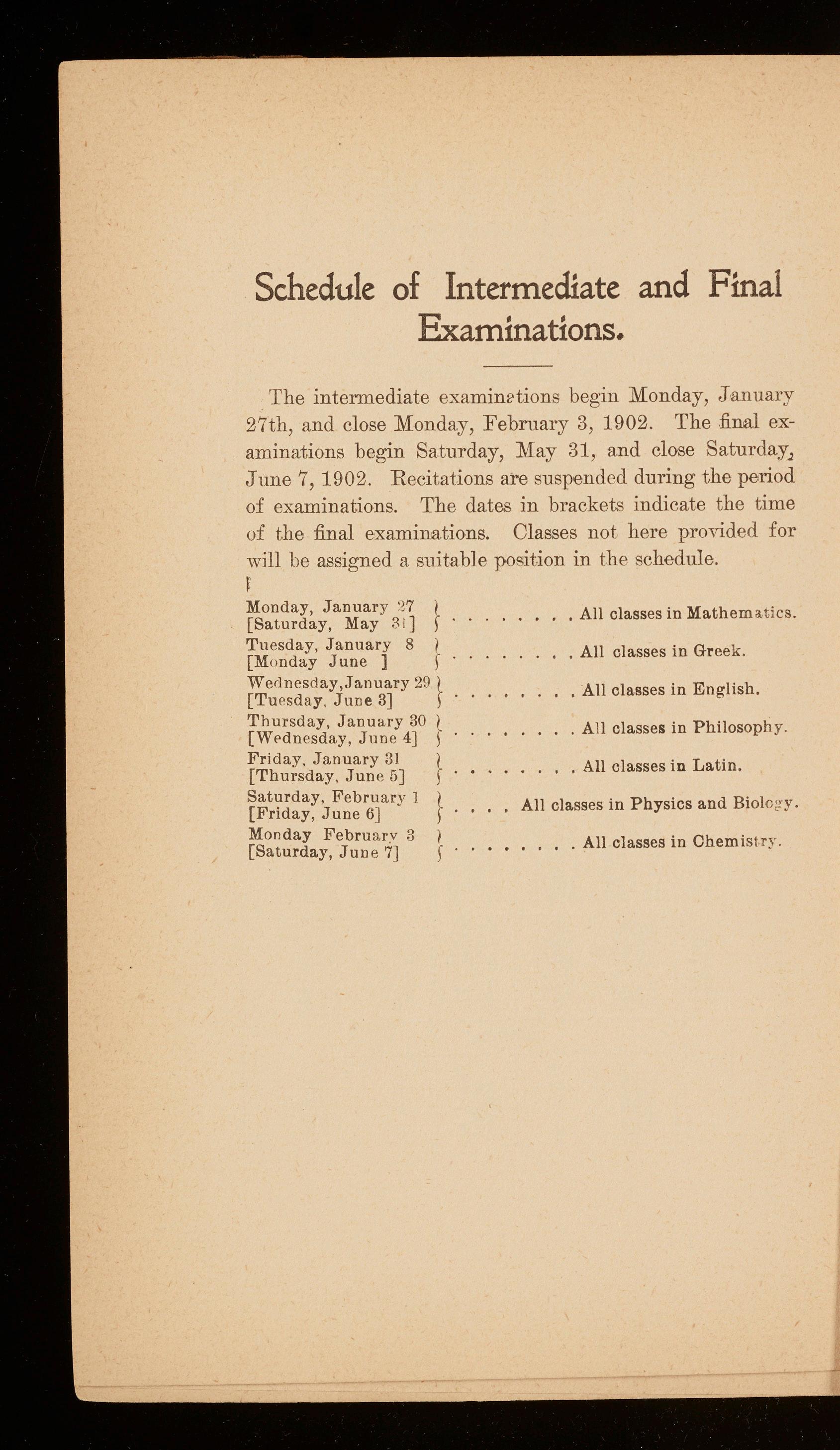
. All classes in Mathema tics.
. All classes in Greek.
, All classes in English,
. All classes in Philosop hy.
, All classes in Latin, All classes in Physics and Biolo i!Y.
• , •. All classes in Chem istry.
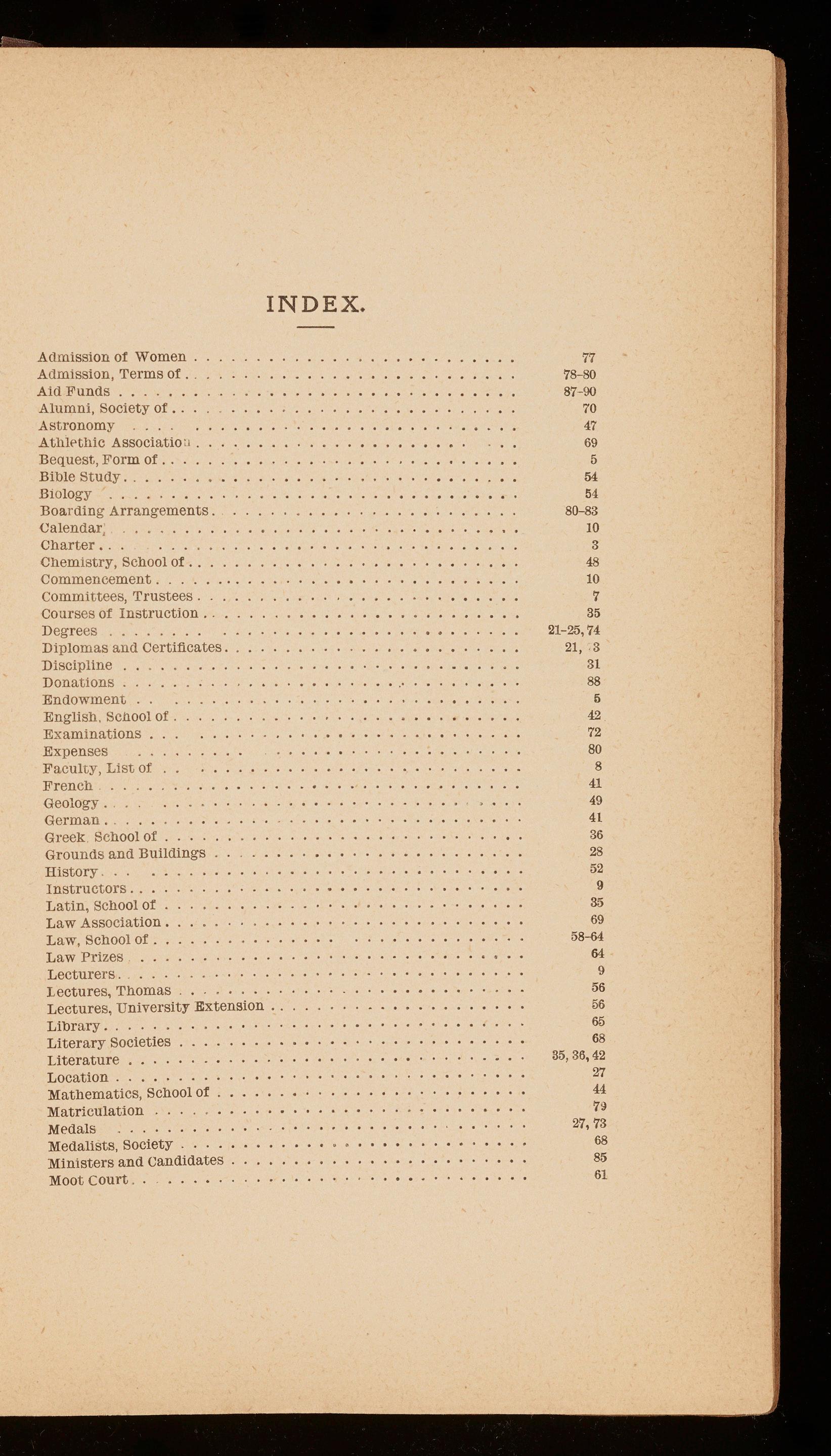
Admission of Women
Admission, Terms of Aid Funds
Alumni, Society of . . Astronomy
Athlt>thic Associatio u Bequest, Form of .. Bible Study .. Biology Boardin g Arrangements. Calendar , ... Charter.. . Chemistry, School of .... Commencement Committees, Trustees . Courses of Inst1·uction Degre es ....... Diplomas and certificates. Discipline Donations ..... Endowment English. School of Examinations . Expenses Faculty, List of French Geology. German .. Greek School of . . . . Grounds and Buildings History ... Instructors .... Latin, School or . Law Association . Law, School of . Law Prizes Lecturers. Lectures, Thomas
Lectures, University Extension .. Library .. Literary societies Literature Location Mathematics, School of Matriculation . . . Medals Medalists, Society Ministers and candidates Moot court . .
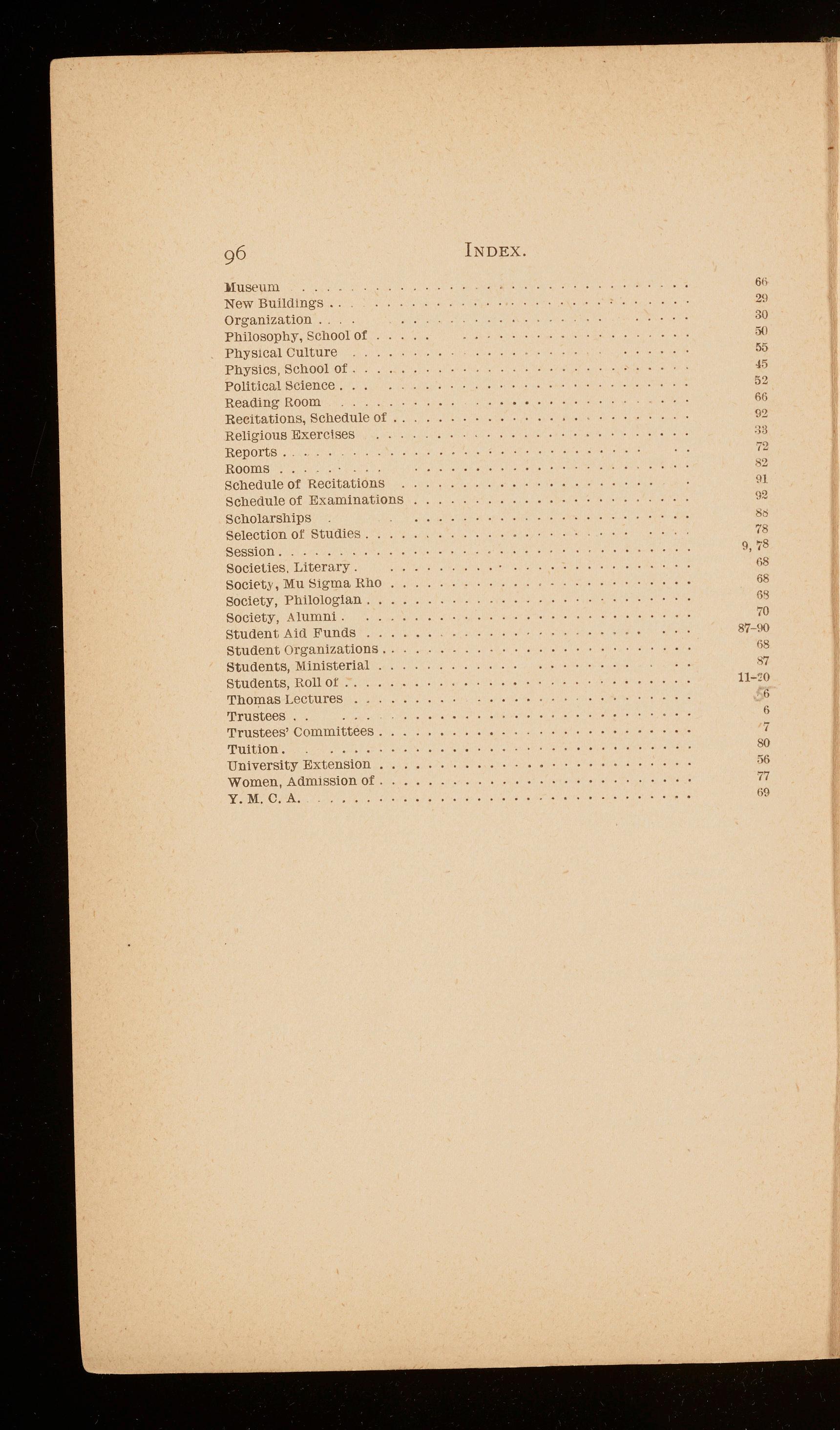
lluseum
New Buildings
Organization
Philosophy, Scl10olof Physical Culture
Physics, School of Political Science
Reading Room
Recitations, Schedule of .. Religious Exercises Reports . Rooms ..
Schedule of Recitations
Schedule of Examinations
Scholarships Selection or studies . session.
Societies. Literary . socii>ty, Mu Sigma Rho society, Philologtan. Society, Alumni.
Student Aid Funds
Student Organizations Students, Ministerial Students, Roll or .. Thomas Lectures . Trustees
Trustees' Committees Tuition.
University Extension . Women, Admission of . Y M. C.A.



